

South Africa Travel Guide
Last Updated: November 10, 2023
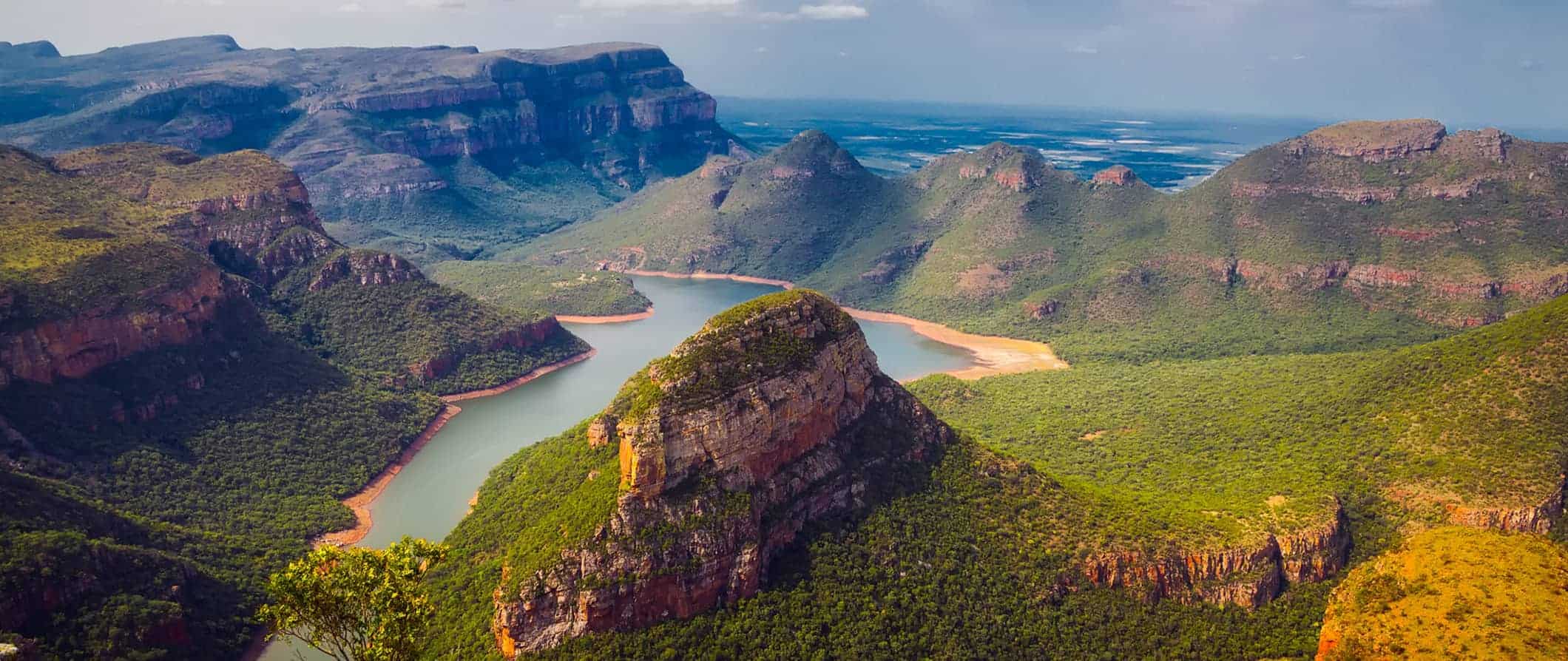
Offering amazing safaris, rugged mountains, world-class wineries, an endless coastline, and lively cities like Cape Town , South Africa is a magical destination that is often overlooked by budget travelers.
Annexed by the Dutch and British before gaining independence in 1931, South Africa struggled with apartheid from 1948 all the way until 1990. The remnants of that dark time can still be seen around the country today, however, things have been improving and the country has been moving forward in leaps and bounds.
While South Africa still struggles with corruption and petty crime (be sure to watch your stuff while you’re here) , its rich but tumultuous history, incredible natural beauty, and international culture make it a worthwhile stop on any round-the-world itinerary. It also has the most UNESCO sites in all of Africa!
This travel guide to South Africa can help you plan the perfect trip without breaking the bank to ensure you make the most of your time in this incredible country.
Table of Contents
- Things to See and Do
- Typical Costs
- Suggested Budget
- Money-Saving Tips
- Where to Stay
- How to Get Around
- How to Stay Safe
- Best Places to Book Your Trip
- Related Blogs on South Africa
Top 5 Things to See and Do in South Africa
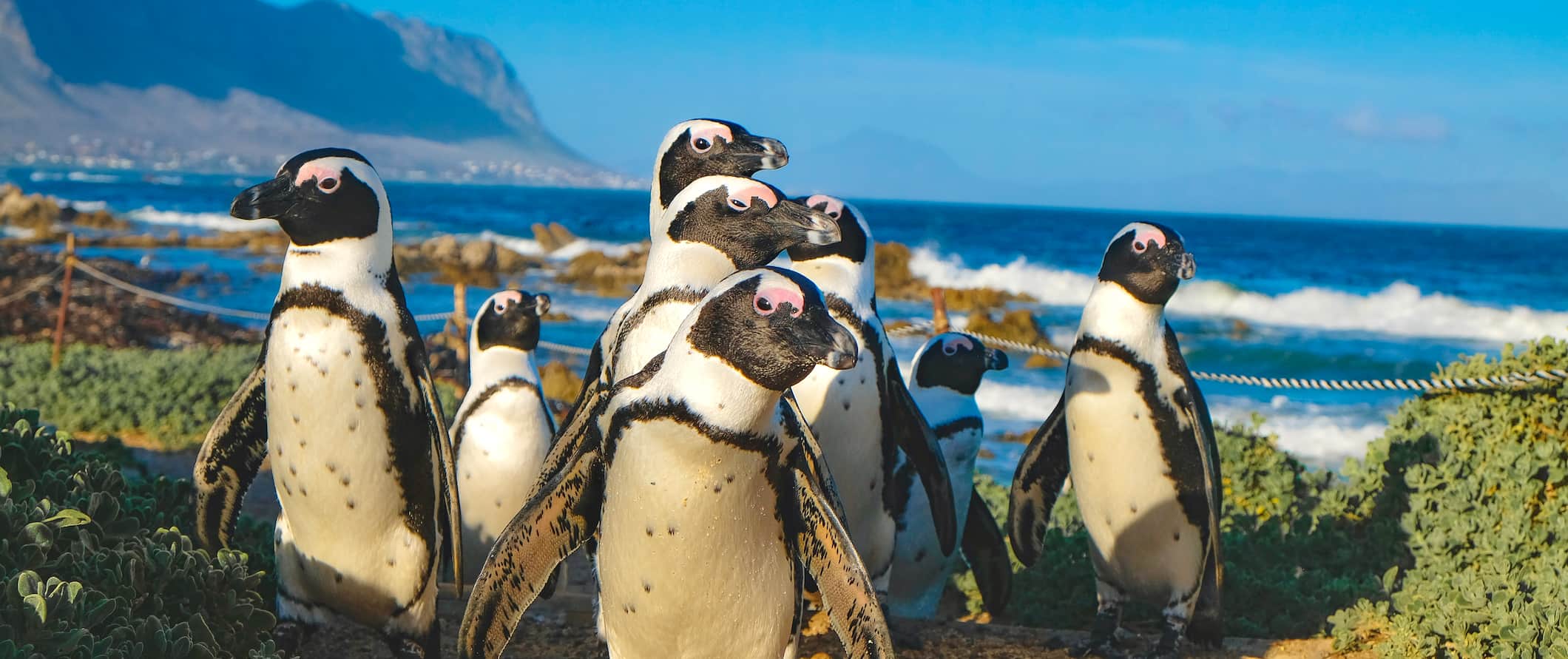
1. Enjoy Cape Town
Hike up Table Mountain, explore Kirstenbosch Botanical Gardens, tan on pristine beaches, visit Robben Island, and go on a wine tour. Cape Town has it all, so spend as much time as you can here. There’s also lots to see outside the city, including Boulders Beach ( where you can see penguins ) and Cape Point.
2. Learn about Apartheid’s tragic past
Gain a deeper understanding of South Africa by visiting the Apartheid Museum in Joburg, taking a tour of Robben Island (where Nelson Mandela spent 18 years in prison), and exploring Soweto (SOuth WEstern TOwnships), a township created by the Apartheid government in Gauteng. It’s a dark, eye-opening era to learn about.
3. Explore Kruger National Park
Kruger National Park is the biggest, most popular, and busiest game reserve in the country. It’s a huge park with over 2 million hectares (almost 5 million acres) of space brimming with wildlife (including the Big 5). A basic three-day budget safari costs about 12,000 ZAR.
4. Drive the Garden Route
This route stretches along the Indian Ocean from Mossel Bay to St Francis, offering beautiful landscapes, serene beaches, picturesque towns, scenic wetlands, and sprawling wineries along the way. The journey is only about 200 kilometers (125 miles), but don’t rush — it’s best to spend a few days stopping and exploring as you go.
5. Day trip to Eswatini (formerly Swaziland)
Formerly called Swaziland, this tiny country was renamed in 2018 (Eswatini means “land of the Swazis”). There are several large game parks and reserves here, making it a great destination for more wildlife spotting. Be sure to visit Hlane Royal National Park. Borders can be a bit slow, so check the wait times before you go.
Other Things to See and Do in South Africa
1. partake in extreme sports.
South Africa offers over 100 extreme sports, including bungee jumping, sandboarding, skydiving, parasailing, jungle zip-lining, scuba diving, and more! Prices vary but expect skydiving to cost around 2,800-3,100 ZAR and bungee jumping to cost around 1,400 ZAR. The world’s third-highest bungee jump point, at Bloukrans Bridge, is here in South Africa (it’s 216 meters/708 feet). If you’re going to go cage diving with sharks, make sure you avoid companies that chum the waters to entice the sharks as that isn’t an ethical or sustainable practice.
2. Explore KwaZulu-Natal
People flock to the South African province of KwaZulu-Natal (KZN) on the east coast to relax, tan, ride the waves, eat amazing food, drink, and spot animals. KwaZulu-Natal’s game-rich Zululand and Elephant Coast in the north provide great wildlife spotting. This is also the birthplace of so many famous and powerful South Africans, including former presidents, the founder of the African National Congress, anti-apartheid leaders, and one of the most influential monarchs of the Zulu Kingdom, Shaka Zulu (1787-1828). KZN has diverse landscapes, interesting activities, and a mix of city life and rural-tribal life. One thing that’s consistent throughout the region is the level of pride in the Zulu culture.
3. Surf the waves
Dungeons Beach, near Cape Town, is a great place to spend some time if you have experience riding gigantic waves. Really — only surf here if you’re a seasoned professional, as the cold water and unpredictable waters are dangerous for new surfers. Beginners should visit Jeffreys Bay (J-Bay), about 75 kilometers (47 miles) west of Port Elizabeth, which is famous for its awesome right-hand point breaking waves. Muizenberg on False Bay is one of the best options for winter longboarding when the north-westerly wind picks up, and Durban has waves ideal for newbies and pro surfers alike. Group surfing lessons cost around 350 ZAR, including equipment.
4. Explore the Cango Caves
These caves, located in the Swartberg Mountains in the Western Cape Province, are 20 million years old and stretch for 4 kilometers (2.5 miles). You can see the exquisite stalagmite formations during the subterranean tours and learn about its history from the Interpretive Center. The standard tour costs 150 ZAR, while a more adventurous (and longer) tour is 220 ZAR, though you should only take this tour if you’re comfortable crawling through very tight spaces. Wear sensible footwear when visiting.
5. Hike Table Mountain
One of the best things in Cape Town is hiking up Table Mountain. It’s a steep, tiring climb that takes around two hours, but the views are worth it. There’s a nice little cafe and a cobblestoned area to walk around at the top so you can relax and admire the view when you’re done. Once you successfully reach the summit, you can take the cable car back down. A one-way ticket is 210 ZAR for adults or 320-390 ZAR for round-trip tickets. Be sure to dress appropriately and bring water as the weather can change quite quickly.
6. Admire the Big Tree in Tsitsikamma National Park
Estimated to be about 800 years old, this majestic Yellowwood tree is located in the Tsitsikamma National Park along South Africa’s Garden Route. This tree of epic proportions stands 36.6 meters (120 feet) high and has a trunk circumference of 9 meters (30 feet). There is a 500 meter (1,640 foot) wooden walkway through the indigenous forest leading to this tree, and from there, you can journey onto a 3-4 kilometer (1.5-2.5-mile) walk if you follow the Ratel Nature Walk signposts. Admission is 12 ZAR. While you’re here, you can also hike many of the other trails in the park, which stretches 80 kilometers (50 miles) along the coastline.
7. Sleep in Gandhi’s house
Did you know that Mahatma Gandhi spent 21 years in South Africa? While he was there, Gandhi’s close friend and German architect Hermann Kallenbach designed and built this farmhouse in 1907, which then served as Gandhi’s South African base from 1908-09. The house is called Satyagraha House and is situated in Orchards, Johannesburg. It’s the spot from which Gandhi developed his plan for passive resistance against the British Empire. It’s been beautifully restored and provides free day visits or overnight stays in one of its seven rooms (prices from 3,080 ZAR).
8. Drive the Namaqualand Flower Route
The Namaqualand Flower Route is a 650-kilometer (404-mile) drive from Yzerfontein to Richtersveld National Park. While you can drive it in one day, most people break it up into sections and take a few days to do it. This region bursts into a sea of color every spring (mainly mid-August and mid-September, peaking in August) when over 4,000 species of flowers bloom. Head north to Springbok, and then make your way down in a southerly direction so the flowers are facing you. The flowers are best viewed on non-overcast days between 10:30am-4pm, so plan your trip accordingly. The Goegap Nature Reserve provides picnic areas and overnight facilities as well. Expect to pay between 320-1,200 ZAR per night.
9. Visit the wineries
South Africa is one of the biggest wine exporters in the world, exporting over 300 million liters (80 million gallons) of wine each year. Visit the vineyards to taste some incredibly fresh wine against a serene, mountainous backdrop. Cape Town is most popular for these tours, but there are great wine regions all over the country, including the Coastal Region, Klein Karoo, Breede River Valley, Olifants River, and Cape South Coast. Jump on an 8-hour day tour that goes from winery to winery, sampling all sorts of wine while learning all about the history of winemaking in South Africa. Tours start at 950 ZAR for a half-day tour.
10. Drive the Sani Pass to the Roof of Africa
Drive the Sani Pass Mountain route in Lesotho — the only route over the Drakensberg escarpment into the mountainous Kingdom of Lesotho. Since it first opened in 1955, the Sani Pass has offered an exhilarating journey as it twists and turns upwards through rocky cliffs that peak at 2,873 meters (9,425 feet) above sea level (hence the name “the Roof of Africa”). Only 4×4 vehicles are allowed on the road, which is treacherous and has been the site of countless accidents. As an alternative to attempting the drive yourself, several tour operators offer day tours, generally costing 940 ZAR. Afterward, bask in your victory as you enjoy a drink at Sani Mountain Lodge, known for being the highest pub in Africa!
11. See the Durban Beachfront
For decades the Golden Mile beachfront in Durban has been popular with cyclists, joggers, and leisurely strollers. You can also explore the Indian District, where dealers in traditional kurtas and saris hawk incense, ornately embroidered fabrics, and aromatic spices. Other sights in the city include visiting the KwaMuhle Museum, the Durban Botanical Gardens, the Tala Game Reserve, the Inanda Heritage Trail, or seeing a Sharks rugby game. Surfing is another popular activity here thanks to the ideal oceanic conditions.
12. Tour Riemvasmaak Community Conservancy
In 1973, under apartheid, 1,500 people were forcibly removed from this area. After the elections in 1994, they were able to return and now welcome visitors to their community. The park is located in the Kalahari Desert, making for some stark — but beautiful — landscapes, with unique rock formations and translucent green fluorite mineral deposits. There are many 4×4, hiking, and mountain biking trails here, as well as plenty of hot springs. There are small guesthouses and camping plots if you’d like to stay overnight.
13. See the penguins
The African penguin is the only penguin to breed on the continent. You can see them at Boulders Beach or Stoney Point Nature Reserve at Betty’s Bay (both locations are a short drive from Cape Town). You don’t often get to see penguins outside of zoos, so it’s definitely worth the drive to see this colony of penguins living their best lives on the beach. Try to arrive before 11am to get the best view of the penguins with the fewest crowds around. Entrance fees range from 25-152 ZAR and full-day guided tours cost 780 ZAR.
14. Surf the waves at Muizenberg Beach
Known for its iconic multi-colored huts on the boardwalk, this is a laid-back neighborhood in Cape Town with a multi-cultural vibe. If you want to hit the waves, you can rent a board for as little as 250 ZAR and a wetsuit 150 ZAR for the day (also available for cheaper by the hour). If you don’t know how to surf, you can also register for SUP or surf lessons at one of the surf shops nearby. Group surf lessons are 235-310 ZAR.
15. Safari in other national parks
While Kruger gets all the love, check out Pilanesberg National Park, Addo National Park, Umfolozi National Park, and the St. Lucia Wetlands. Without the crowds of Kruger, you’ll have ample opportunity to get up close to elephants, lions, leopards, rhinos, and more. From Johannesburg, the Madikwe Game Reserve, Pilanesberg Game Reserve, and the Dinokeng Game Reserve are just some of the options for nearby safaris.
16. Go whale watching
South Africa is one of the best places in the world to go whale watching. If you’re visiting between June and November, there’s an excellent chance of spotting Southern right whales, Bryde’s whales, and orcas. The town of Hermanus, located 120 kilometers (75 miles) southeast of Cape Town, is the base for many of the best whale-watching companies in the country. Some reputable companies include Southern Right Charters, Hermanus Whale Cruises, and Xplora Tours. Expect to pay around 900-1,020 ZAR for a two-hour tour.
For more information on specific cities in South Africa, check out these guides:
- Cape Town Travel Guide
South Africa Travel Costs
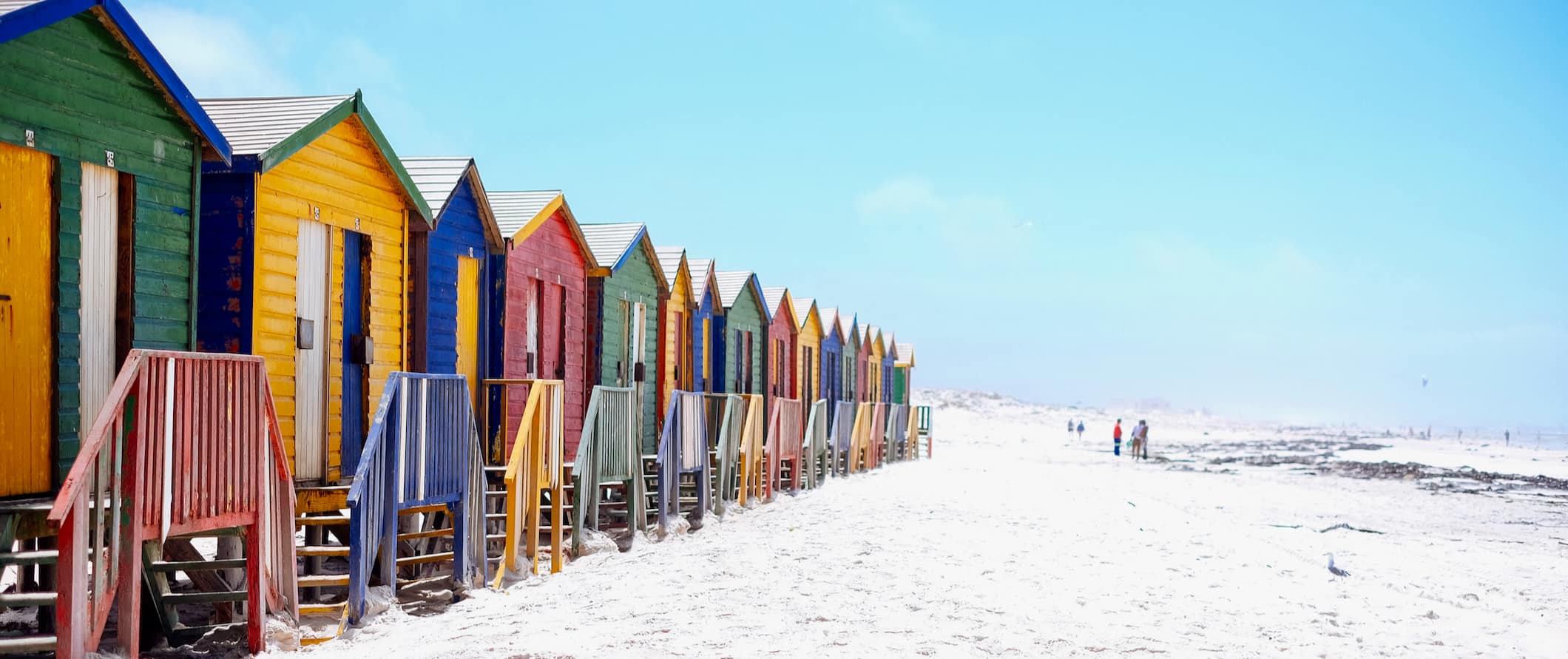
Accommodation – A bed in a 4-8-bed hostel dorm costs 250-300 ZAR per night, and around 215-230 ZAR per night for a dorm with 10 or more beds. A private double room costs 600-935 ZAR. Free Wi-Fi is standard and many hostels also include free breakfast and/or have a kitchen, as well as a swimming pool.
For those traveling with a tent, campgrounds can be found all around the country. Expect to pay between 100-400 ZAR per night, depending on the facilities and location.
If you are looking for a hotel, budget hotels range from about 850-1,200 ZAR for a twin or double in big cities and get cheaper in more rural areas. Standard amenities include Wi-Fi, private bathrooms, and air-conditioning. For a hotel with amenities like free breakfast and a swimming pool, expect to pay at least 900 ZAR per night.
Generally, accommodation prices are higher in Cape Town and Johannesburg and inside of any national parks. If you want to cut your prices, think about staying away from the city center, in lesser visited towns, and outside of the national parks when you’re going on a safari.
In the low season, you can find hostels and hotels for 10-20% cheaper.
Airbnb is also an option around the country, though it’s most commonly available in larger urban areas. A private room costs 300-600 ZAR per night while an entire home or apartment costs at least 700-900 ZAR.
Food – Due to its history of colonization and immigration, South African cuisine is a mix of indigenous, Dutch, British, Indian, and Malaysian culinary traditions.
Above all, South Africa is known for its meaty meals. A favorite pastime of South Africans is the braai , an open-air barbeque that originated in the townships of Johannesburg. Often served with your plate of barbeque are chakalaka , a dish of onions, tomatoes, peppers, carrots, and beans, and pap, a maize porridge.
Other popular dishes include bobotie (a baked dish of curry-spiced minced meat with egg on top) and potjiekos (a stew with meat, veggies, and potatoes). Common desserts include melktert (a custard tart) and malva pudding (like sticky toffee pudding).
Overall, restaurants in South Africa are pretty affordable. At a café, some coffee and a small meal cost 100 ZAR. At a casual restaurant serving traditional South African cuisine, expect to pay around 150 ZAR for a meal.
In terms of traditional barbeque, prices for one person vary, but are usually between 100-220 ZAR. Be sure to try biltong (thinly sliced air-dried meat), droewors (air-dried sausage), and boerewors (farmers sausage) if you’re a meat-eater.
A delicious dish that originated in the Indian community is bunny chow, a spicy curry served in a bread bowl that can also be served vegetarian. This dish is usually found at street food and takeaway spots, costing around 65-90 ZAR. At a sit-down Indian restaurant, expect to pay 90-140 ZAR for a typical curry meal.
In terms of fast food, a meal at Nando’s or another fast-food chain costs about 60-85 ZAR per person. A Chinese takeout meal costs around 75-125 ZAR.
At a nicer restaurant, a three-course meal with wine costs 280-320 ZAR per person, though you can find some main dishes for around 120 ZAR. In the same types of restaurants, a burger is 100-130 ZAR, a whole pizza is 120-160 ZAR, and a pasta dish is 90-155 ZAR.
Expect to pay around 30-35 ZAR for a beer and 50-70 ZAR for a cocktail. A glass of wine is 45-60 ZAR, while a bottle costs 120-250 ZAR. A bottle of water is 11 ZAR, soda is 20 ZAR, and a cappuccino is 25 ZAR.
The low-cost alternative to eating out is to buy groceries. A week’s worth of basic groceries for one person costs around 400-550 ZAR. This gets you basic staples like rice or pasta, seasonal produce, and some meat or fish. If you want to keep costs low, avoid expensive items like chicken, beef, and cheese.
Backpacking South Africa Suggested Budgets
On a backpacker’s budget of 850 ZAR per day, you can stay in a hostel, cook most of your meals, limit your drinking, do mostly free activities (walking tours, enjoying nature), and use public transportation to get around.
On a mid-range budget of about 1,900 ZAR per day, you can stay in a private hostel or Airbnb room, eat out for most meals, enjoy a few drinks, take the occasional taxi to get around, and do more paid activities like going on a safari or taking surf lessons.
On a “luxury” budget of 3,600 ZAR or more per day, you can stay in a hotel, eat out anywhere you want, rent a car, do more safaris and adventure sports, drink more, and do whatever else you want. This is just the ground floor for luxury though. The sky is the limit!
You can use the chart below to get some idea of how much you need to budget daily, depending on your travel style. Keep in mind these are daily averages — some days you’ll spend more, some days you’ll spend less (you might spend less every day). We just want to give you a general idea of how to make your budget. Prices are in ZAR.
South Africa Travel Guide: Money-Saving Tips
It doesn’t cost a lot of money to travel around South Africa. Except for adventure sports and tours, everything is relatively cheap. But that doesn’t mean you can’t save more money! Here are some tips for saving money in South Africa:
- Pitch a tent – Most hostels have yards that they allow travelers to pitch a tent in. It costs much less and you still have the option to use the bathroom, kitchen, and other amenities.
- Work for your room and board – South Africa has plenty of farms and an active WWOOFing community. If you’re looking to stay for a while, cut your food and accommodation costs by spending some time working on a winery or farm.
- Sleep on the train – The Shosholoza Meyl train service connects Johannesburg, Cape Town, Durban, Port Elizabeth, East London, Komatipoort, and Musina. Prices vary depending on where you are going, but a one-way ticket from Cape Town to Johannesburg costs around 690 ZAR and takes over 24 hours.
- Rent a car – Renting your own car is the best way to get around South Africa since the buses can be quite slow. Prices vary depending on what sort of vehicle you get, but they are generally around 500 ZAR per day.
- Drink in hostels – Most hostels have a small bar where socializing after a day of sightseeing is the thing to do. Local beer and wine can be purchased cheaper here than most bars and restaurants. If you’re going to drink, this is the place to do it!
- Cook your own food – Purchase groceries at discount supermarkets like Pick n’ Pay or Checkers to prepare meals at your hostel. This will cut down your costs significantly!
- Bring a water bottle – The tap water here is generally not safe outside of urban areas so bring a reusable water bottle with a filter to save money and reduce your plastic use. LifeStraw is my go-to brand as their bottles have built-in filters to ensure your water is always clean and safe.
Where to Stay in South Africa
Looking for a budget-friendly place to rest your head in South Africa? Here are some of my suggested places to stay:
- 91 Loop (Cape Town)
- Never at Home Green point (Cape Town)
- Curiocity Backpackers (Johannesburg)
- Kruger Inn Backpackers (Kruger)
- The Kingdom Resort (Pilanesburg)
- 1322 Backpackers International (Pretoria)
How to Get Around South Africa
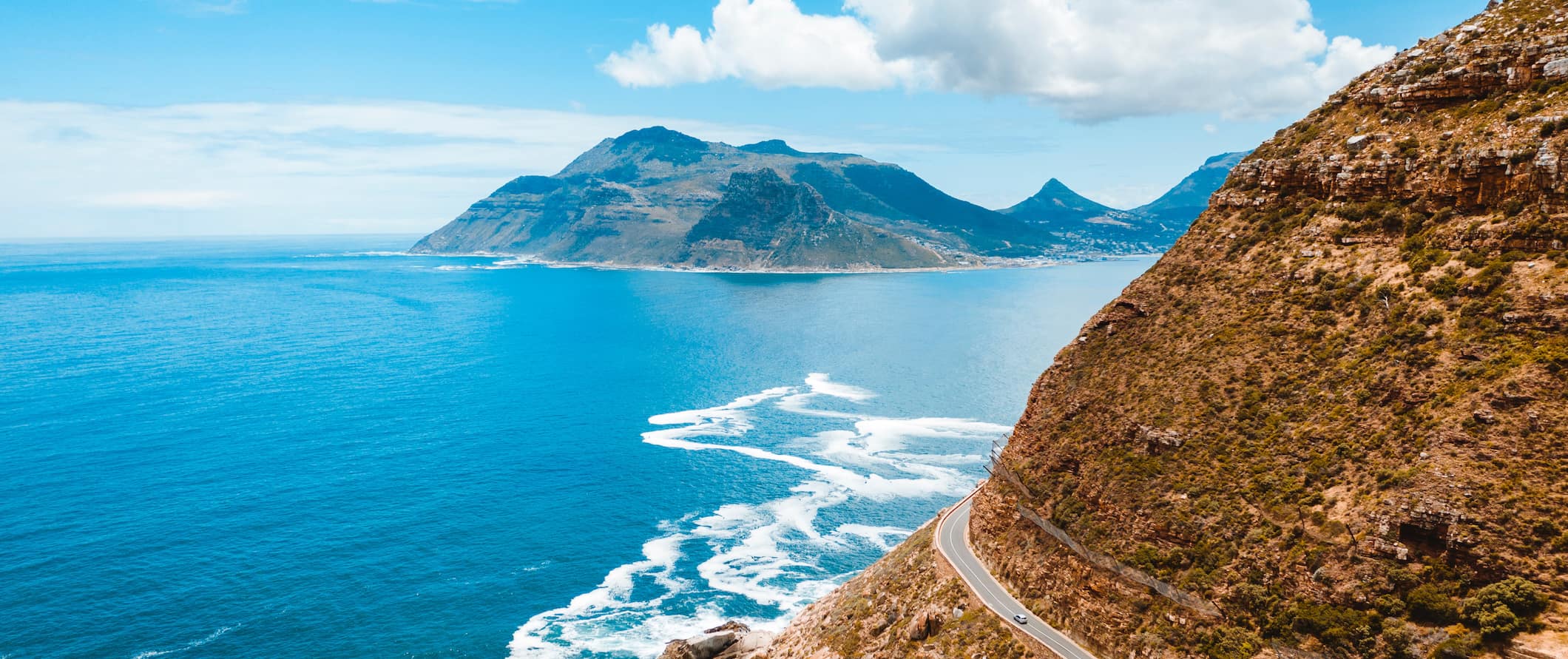
Public Transportation – Public transportation is available in the larger cities, though it is notoriously unreliable (and I wouldn’t recommend taking buses or vans within the cities for safety reasons). I also definitely don’t recommend taking the metro around Pretoria or Johannesburg as they’re not safe.
If you must use public transportation, I only recommend MyCiTi buses in Cape Town, which costs 7-13 ZAR for up to 20 kilometers (12 miles), and the People Mover in Durban (6 ZAR per ride, or 16.50 ZAR for a day pass).
Taxi – Instead of buses, minibusses, or shared taxis, I suggest calling for a private taxi. Rates are generally low and vary between cities. In Cape Town, rates average 12 ZAR per kilometer, often with a minimum charge of 30 ZAR.
Ridesharing – Even safer than taxis is Uber, which is available in Cape Town, Johannesburg, Pretoria, Durban, and Port Elizabeth. This is how I recommend getting around if you’ll have phone service while you’re there.
Bus – Buses are generally the most reliable public transportation between cities, with trips costing anywhere from 250-700 ZAR. The most popular operators are:
- City to City
Since Greyhound pulled out of South Africa in 2021, Intercape is now the main bus provider, with an extensive reach throughout the country. For longer distances, you can choose a more comfortable reclining seat on their overnight Sleepliner bus.
City to City offers a less expensive, no-frills service that goes to many off-the-beaten-track places, including townships and mining towns.
In terms of prices for main routes, the 18-hour bus from Cape Town to Johannesburg costs around 380-600 ZAR, while the 8.5-hour bus from Durban to Pretoria is 225 ZAR.
To find bus routes and prices, use BusBud .
Train – Train rides are less common but more comfortable and safer than buses. Shosholoza Meyl (South African Railways) has long-distance trains that serve Cape Town, Port Elizabeth, Bloemfontein, Durban, East London, Johannesburg, Queenstown, and East London. They’re comfortable and safe, making various stops at smaller towns along the way. Both tourist and economy classes are affordable options.
The overnight journey from Johannesburg to Cape Town costs around 750 ZAR and is a gorgeous ride with a dining car, showers, and accommodation in a two- or four-berth compartment (if available, couples are given coupes and single travelers and groups are put in compartments). If you are traveling alone and you want a coupe to yourself, you’ll need to buy two tickets.
The economy class is fine for shorter daytime trips; however, it doesn’t have sleeping carriages and is not a comfortable or safe option for overnight travel.
Tourist-class sleepers can get fully booked a month or so ahead, especially on popular routes, so plan ahead.
For those who are interested in luxury, the famous Blue Train , which runs from Pretoria to Cape Town, costs 38,000 ZAR for a luxury double berth. The trip lasts a few days and includes wine, cigars, great food, and comfortable compartments. It’s the fanciest way to see the country!
Flying – Depending on the route, domestic fares are generally affordable. It costs 750 ZAR from Cape Town to Johannesburg, 1,000 ZAR from Cape Town to Durban, or 600 ZAR from Pretoria to Durban. The main budget airlines are Kulula and FlySafair.
Car Rental – If you plan on exploring a lot, a small car can be rented for 500 ZAR per day. Check with your hostel to see if they recommend a certain company to book from. Otherwise, Around About Cars, Avis, Budget, Hertz, and other car rental companies exist in South Africa. Make sure you get insurance and keep all the paperwork as accidents are not uncommon.
You can use your driving license from your home country, provided it is in English (or you have a certified translation). However, if you get stopped by the police, they usually ask to see your passport too so keep at least a photocopy in your car.
When to Go to South Africa
The best time to visit South Africa’s parks is from May to September. This is the dry season and wildlife is easier to spot because there’s less vegetation around waterholes, so you can see the animals as they gather to quench their thirst. As this is winter, mornings and nights are chilly.
May and September are wonderful times to visit because it is less cold and, especially in September, the wildlife viewing is excellent. Most days are sunny, there is little to no rain, and there are very few mosquitos.
The winters are mild and produce average highs of approximately 17°C (63°F). This is the low season, so the parks are not crowded (save for Kruger during school holidays).
The wet season (summer) runs from October to April. This is after the first rain, so the scenery turns green and the country looks lush and fresh. This is the best time for bird watching because most of the migratory birds are around. When it does rain, it doesn’t rain for long so you can usually wait it out. Seeing animals is harder since there are more lush landscapes and more places for the animals to be hidden or blocked by trees and bushes.
Parts of South Africa see summer highs get up to 28°C (81°F), with averages closer to 25°C (77°F). Prepare for much larger crowds in the national parks when there are school holidays.
Generally speaking, temperatures are more consistent throughout the year at the coast, while the arid/mountainous areas of the interior see the greatest fluctuation in seasonal temperatures. Even in the Kalahari Desert, nighttime temperatures can drop below freezing. It’s a good idea to pack for all occasions, as often people joke about how you can experience all four seasons in one day in South Africa.
How to Stay Safe in South Africa
South Africa requires extra vigilance because there’s a lot of petty crime here. While you’re unlikely to ever be in any real physical danger, petty crime and harassment are rampant. Avoid carrying expensive gear and lots of money, especially late at night. Always keep your valuables secure and never dress flashy. Do your best to fit in at all times so you don’t stand out as a target.
Don’t walk around alone late at night. If you have a rental car, keep your doors locked at all times to prevent theft and carjacking. Never leave anything in your vehicle overnight as break-ins can occur.
Solo female travelers will want to be cautious here. Avoid traveling alone when you can and don’t travel alone at night. Always keep an eye on your drink when out at the bar and be extra careful in crowded areas as sexual harassment isn’t uncommon.
Crime rates are higher in the townships (settlements established during apartheid for forced racial segregation), but that doesn’t mean avoid them altogether. Just visit during daylight hours, especially with a local guide.
Be extra careful in Johannesburg, where crime rates are the highest in the country (although again, it’s mostly petty crime). If you’re driving, pay attention to what’s happening behind your car as well as in the front. If someone exits a car and starts approaching you, move on quickly.
If you’re going to visit Hillbrow, Berea, Joubert Park and Yeoville make sure you do it with a local as these are riskier neighborhoods to explore on your own.
If you’re worried about getting ripped off, you can read about common travel scams to avoid here.
If you do experience an emergency, dial 10 111 for assistance.
Always trust your gut instinct and make copies of your personal documents, including your passport and ID. Forward your itinerary along to loved ones so they’ll know where you are.
For more in-depth coverage of how to stay safe in South Africa, check out this post we wrote that answers some frequently asked questions and concerns.
The most important piece of advice I can offer is to purchase good travel insurance. Travel insurance will protect you against illness, injury, theft, and cancellations. It’s comprehensive protection in case anything goes wrong. I never go on a trip without it as I’ve had to use it many times in the past. You can use the widget below to find the policy right for you:
South Africa Travel Guide: The Best Booking Resources
These are my favorite companies to use when I travel. They consistently have the best deals, offer world-class customer service and great value, and overall, are better than their competitors. They are the companies I use the most and are always the starting point in my search for travel deals.
- Skyscanner – Skyscanner is my favorite flight search engine. They search small websites and budget airlines that larger search sites tend to miss. They are hands down the number one place to start.
- Hostelworld – This is the best hostel accommodation site out there with the largest inventory, best search interface, and widest availability.
- Booking.com – The best all around booking site that constantly provides the cheapest and lowest rates. They have the widest selection of budget accommodation. In all my tests, they’ve always had the cheapest rates out of all the booking websites.
- Get Your Guide – Get Your Guide is a huge online marketplace for tours and excursions. They have tons of tour options available in cities all around the world, including everything from cooking classes, walking tours, street art lessons, and more!
- SafetyWing – Safety Wing offers convenient and affordable plans tailored to digital nomads and long-term travelers. They have cheap monthly plans, great customer service, and an easy-to-use claims process that makes it perfect for those on the road.
- LifeStraw – My go-to company for reusable water bottles with built-in filters so you can ensure your drinking water is always clean and safe.
- Unbound Merino – They make lightweight, durable, easy-to-clean travel clothing.
- Top Travel Credit Cards – Points are the best way to cut down travel expenses. Here’s my favorite point earning credit cards so you can get free travel!
South Africa Travel Guide: Related Articles
Want more info? Check out all the articles I’ve written on backpacking/traveling South Africa and continue planning your trip:
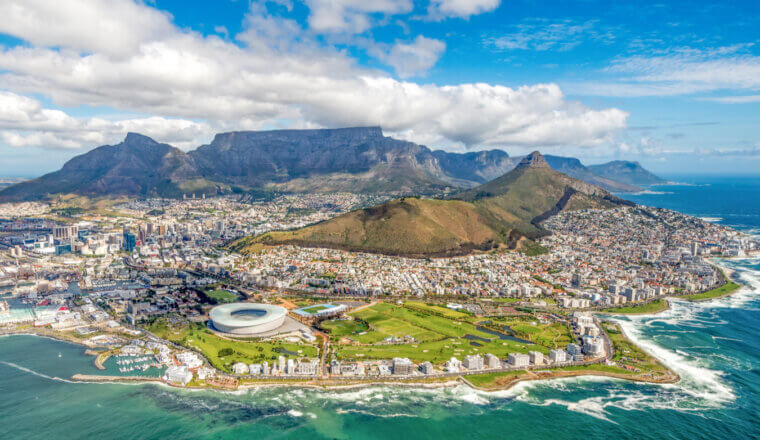
How to Save Money When You Visit Cape Town
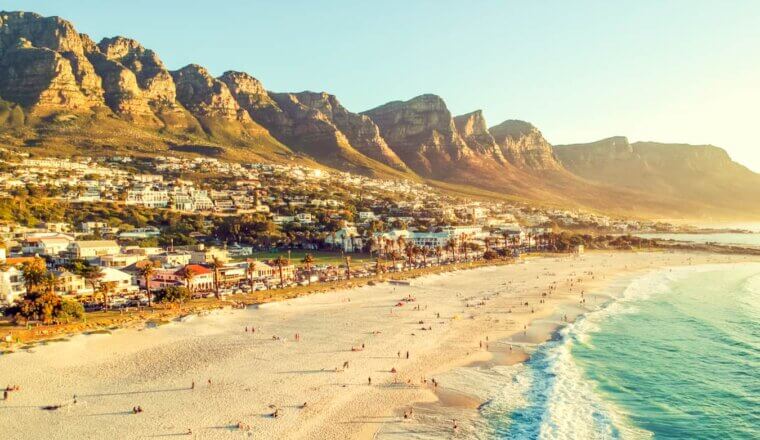
The 4 Best Hostels in Cape Town
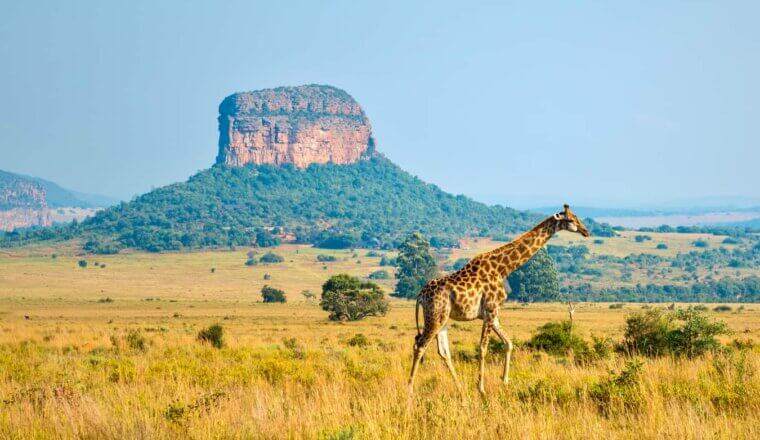
The 12 Best Things to Do in South Africa
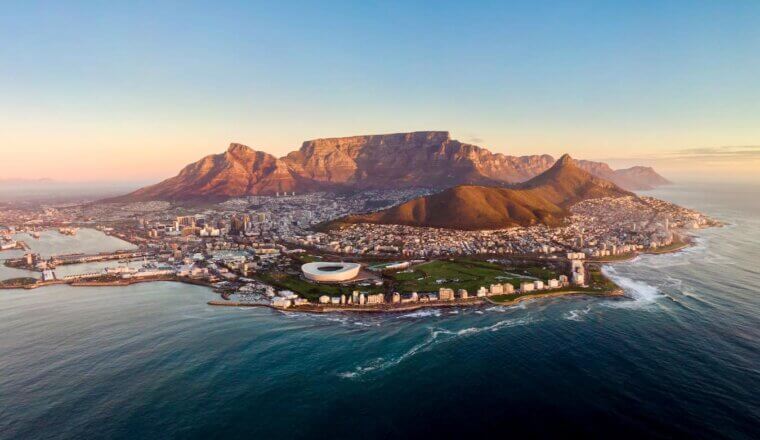
Cape Town Itinerary: What to See and Do in 4 (or More) Days
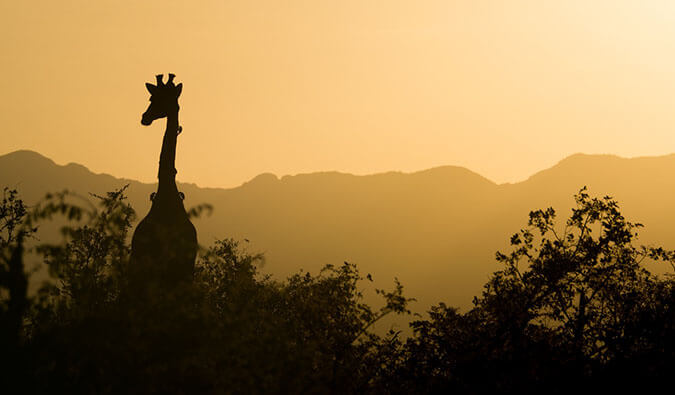
Six of the Greatest Safaris in Africa
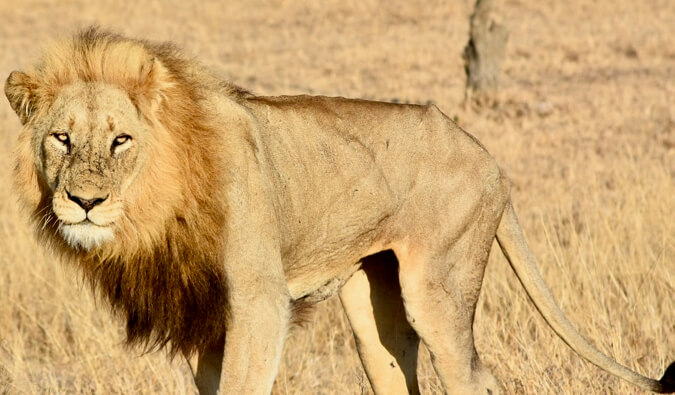
24 Photos from My Safari to Kruger National Park
Get your free travel starter kit.
Enter your email and get planning cheatsheets including a step by step checklist, packing list, tips cheat sheet, and more so you can plan like a pro!

- Where To Stay
- Transportation
- Booking Resources
- Related Blogs
You are using an outdated browser. Upgrade your browser today or install Google Chrome Frame to better experience this site.
South Africa Traveler View
Travel health notices, vaccines and medicines, non-vaccine-preventable diseases, stay healthy and safe.
- Packing List
After Your Trip
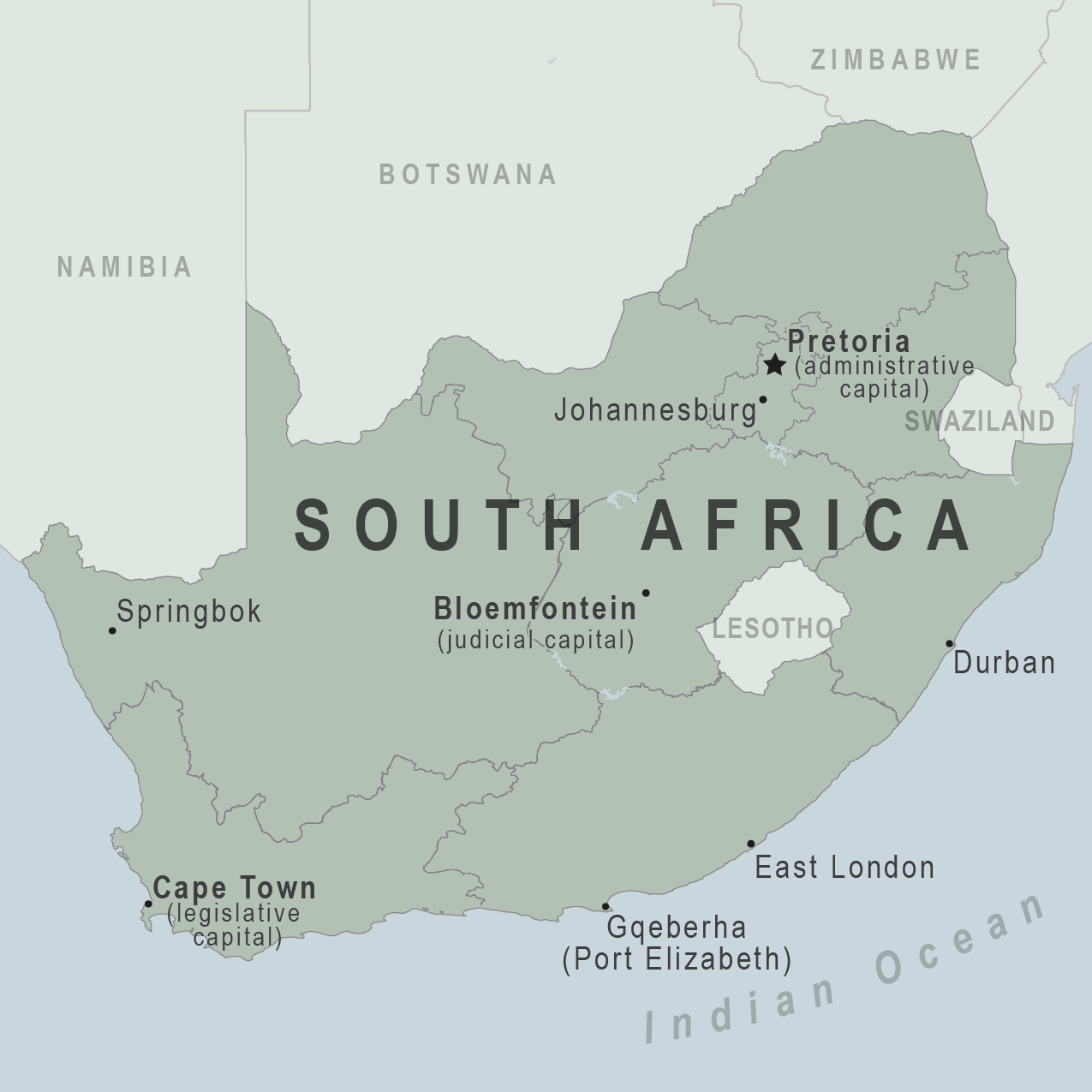
There are no notices currently in effect for South Africa.
⇧ Top
Check the vaccines and medicines list and visit your doctor at least a month before your trip to get vaccines or medicines you may need. If you or your doctor need help finding a location that provides certain vaccines or medicines, visit the Find a Clinic page.
- Avoid contaminated water
Leptospirosis
How most people get sick (most common modes of transmission)
- Touching urine or other body fluids from an animal infected with leptospirosis
- Swimming or wading in urine-contaminated fresh water, or contact with urine-contaminated mud
- Drinking water or eating food contaminated with animal urine
- Avoid contaminated water and soil
- Avoid floodwater
Clinical Guidance
Schistosomiasis
- Wading, swimming, bathing, or washing in contaminated freshwater streams, rivers, ponds, lakes, or untreated pools.
Avoid bug bites
African tick-bite fever.
- Avoid Bug Bites
African Tick-bite fever
Chikungunya
- Mosquito bite
Crimean-Congo Hemorrhagic fever
- Tick bite
- Touching the body fluids of a person or animal infected with CCHF
- Avoid animals
Rift Valley Fever
- Touching blood, body fluids, or tissue of infected livestock
- Mosquito bite
Rift Valley fever
Airborne & droplet
Avian/bird flu.
- Being around, touching, or working with infected poultry, such as visiting poultry farms or live-animal markets
- Avoid domestic and wild poultry
- Breathing in air or accidentally eating food contaminated with the urine, droppings, or saliva of infected rodents
- Bite from an infected rodent
- Less commonly, being around someone sick with hantavirus (only occurs with Andes virus)
- Avoid rodents and areas where they live
- Avoid sick people
Tuberculosis (TB)
- Breathe in TB bacteria that is in the air from an infected and contagious person coughing, speaking, or singing.
Learn actions you can take to stay healthy and safe on your trip. Vaccines cannot protect you from many diseases in South Africa, so your behaviors are important.
Eat and drink safely
Food and water standards around the world vary based on the destination. Standards may also differ within a country and risk may change depending on activity type (e.g., hiking versus business trip). You can learn more about safe food and drink choices when traveling by accessing the resources below.
- Choose Safe Food and Drinks When Traveling
- Water Treatment Options When Hiking, Camping or Traveling
- Global Water, Sanitation and Hygiene (WASH)
- Avoid Contaminated Water During Travel
You can also visit the Department of State Country Information Pages for additional information about food and water safety.
Prevent bug bites
Bugs (like mosquitoes, ticks, and fleas) can spread a number of diseases in South Africa. Many of these diseases cannot be prevented with a vaccine or medicine. You can reduce your risk by taking steps to prevent bug bites.
What can I do to prevent bug bites?
- Cover exposed skin by wearing long-sleeved shirts, long pants, and hats.
- Use an appropriate insect repellent (see below).
- Use permethrin-treated clothing and gear (such as boots, pants, socks, and tents). Do not use permethrin directly on skin.
- Stay and sleep in air-conditioned or screened rooms.
- Use a bed net if the area where you are sleeping is exposed to the outdoors.
What type of insect repellent should I use?
- FOR PROTECTION AGAINST TICKS AND MOSQUITOES: Use a repellent that contains 20% or more DEET for protection that lasts up to several hours.
- Picaridin (also known as KBR 3023, Bayrepel, and icaridin)
- Oil of lemon eucalyptus (OLE) or para-menthane-diol (PMD)
- 2-undecanone
- Always use insect repellent as directed.
What should I do if I am bitten by bugs?
- Avoid scratching bug bites, and apply hydrocortisone cream or calamine lotion to reduce the itching.
- Check your entire body for ticks after outdoor activity. Be sure to remove ticks properly.
What can I do to avoid bed bugs?
Although bed bugs do not carry disease, they are an annoyance. See our information page about avoiding bug bites for some easy tips to avoid them. For more information on bed bugs, see Bed Bugs .
For more detailed information on avoiding bug bites, see Avoid Bug Bites .
Stay safe outdoors
If your travel plans in South Africa include outdoor activities, take these steps to stay safe and healthy during your trip.
- Stay alert to changing weather conditions and adjust your plans if conditions become unsafe.
- Prepare for activities by wearing the right clothes and packing protective items, such as bug spray, sunscreen, and a basic first aid kit.
- Consider learning basic first aid and CPR before travel. Bring a travel health kit with items appropriate for your activities.
- If you are outside for many hours in heat, eat salty snacks and drink water to stay hydrated and replace salt lost through sweating.
- Protect yourself from UV radiation : use sunscreen with an SPF of at least 15, wear protective clothing, and seek shade during the hottest time of day (10 a.m.–4 p.m.).
- Be especially careful during summer months and at high elevation. Because sunlight reflects off snow, sand, and water, sun exposure may be increased during activities like skiing, swimming, and sailing.
- Very cold temperatures can be dangerous. Dress in layers and cover heads, hands, and feet properly if you are visiting a cold location.
Stay safe around water
- Swim only in designated swimming areas. Obey lifeguards and warning flags on beaches.
- Practice safe boating—follow all boating safety laws, do not drink alcohol if driving a boat, and always wear a life jacket.
- Do not dive into shallow water.
- Do not swim in freshwater in developing areas or where sanitation is poor.
- Avoid swallowing water when swimming. Untreated water can carry germs that make you sick.
- To prevent infections, wear shoes on beaches where there may be animal waste.
Schistosomiasis, a parasitic infection that can be spread in fresh water, is found in South Africa. Avoid swimming in fresh, unchlorinated water, such as lakes, ponds, or rivers.
Keep away from animals
Most animals avoid people, but they may attack if they feel threatened, are protecting their young or territory, or if they are injured or ill. Animal bites and scratches can lead to serious diseases such as rabies.
Follow these tips to protect yourself:
- Do not touch or feed any animals you do not know.
- Do not allow animals to lick open wounds, and do not get animal saliva in your eyes or mouth.
- Avoid rodents and their urine and feces.
- Traveling pets should be supervised closely and not allowed to come in contact with local animals.
- If you wake in a room with a bat, seek medical care immediately. Bat bites may be hard to see.
All animals can pose a threat, but be extra careful around dogs, bats, monkeys, sea animals such as jellyfish, and snakes. If you are bitten or scratched by an animal, immediately:
- Wash the wound with soap and clean water.
- Go to a doctor right away.
- Tell your doctor about your injury when you get back to the United States.
Consider buying medical evacuation insurance. Rabies is a deadly disease that must be treated quickly, and treatment may not be available in some countries.
Reduce your exposure to germs
Follow these tips to avoid getting sick or spreading illness to others while traveling:
- Wash your hands often, especially before eating.
- If soap and water aren’t available, clean hands with hand sanitizer (containing at least 60% alcohol).
- Don’t touch your eyes, nose, or mouth. If you need to touch your face, make sure your hands are clean.
- Cover your mouth and nose with a tissue or your sleeve (not your hands) when coughing or sneezing.
- Try to avoid contact with people who are sick.
- If you are sick, stay home or in your hotel room, unless you need medical care.
Avoid sharing body fluids
Diseases can be spread through body fluids, such as saliva, blood, vomit, and semen.
Protect yourself:
- Use latex condoms correctly.
- Do not inject drugs.
- Limit alcohol consumption. People take more risks when intoxicated.
- Do not share needles or any devices that can break the skin. That includes needles for tattoos, piercings, and acupuncture.
- If you receive medical or dental care, make sure the equipment is disinfected or sanitized.
Know how to get medical care while traveling
Plan for how you will get health care during your trip, should the need arise:
- Carry a list of local doctors and hospitals at your destination.
- Review your health insurance plan to determine what medical services it would cover during your trip. Consider purchasing travel health and medical evacuation insurance.
- Carry a card that identifies, in the local language, your blood type, chronic conditions or serious allergies, and the generic names of any medications you take.
- Some prescription drugs may be illegal in other countries. Call South Africa’s embassy to verify that all of your prescription(s) are legal to bring with you.
- Bring all the medicines (including over-the-counter medicines) you think you might need during your trip, including extra in case of travel delays. Ask your doctor to help you get prescriptions filled early if you need to.
Many foreign hospitals and clinics are accredited by the Joint Commission International. A list of accredited facilities is available at their website ( www.jointcommissioninternational.org ).
In some countries, medicine (prescription and over-the-counter) may be substandard or counterfeit. Bring the medicines you will need from the United States to avoid having to buy them at your destination.
Malaria is a risk in some parts of South Africa. If you are going to a risk area, fill your malaria prescription before you leave, and take enough with you for the entire length of your trip. Follow your doctor’s instructions for taking the pills; some need to be started before you leave.
Select safe transportation
Motor vehicle crashes are the #1 killer of healthy US citizens in foreign countries.
In many places cars, buses, large trucks, rickshaws, bikes, people on foot, and even animals share the same lanes of traffic, increasing the risk for crashes.
Be smart when you are traveling on foot.
- Use sidewalks and marked crosswalks.
- Pay attention to the traffic around you, especially in crowded areas.
- Remember, people on foot do not always have the right of way in other countries.
Riding/Driving
Choose a safe vehicle.
- Choose official taxis or public transportation, such as trains and buses.
- Ride only in cars that have seatbelts.
- Avoid overcrowded, overloaded, top-heavy buses and minivans.
- Avoid riding on motorcycles or motorbikes, especially motorbike taxis. (Many crashes are caused by inexperienced motorbike drivers.)
- Choose newer vehicles—they may have more safety features, such as airbags, and be more reliable.
- Choose larger vehicles, which may provide more protection in crashes.
Think about the driver.
- Do not drive after drinking alcohol or ride with someone who has been drinking.
- Consider hiring a licensed, trained driver familiar with the area.
- Arrange payment before departing.
Follow basic safety tips.
- Wear a seatbelt at all times.
- Sit in the back seat of cars and taxis.
- When on motorbikes or bicycles, always wear a helmet. (Bring a helmet from home, if needed.)
- Avoid driving at night; street lighting in certain parts of South Africa may be poor.
- Do not use a cell phone or text while driving (illegal in many countries).
- Travel during daylight hours only, especially in rural areas.
- If you choose to drive a vehicle in South Africa, learn the local traffic laws and have the proper paperwork.
- Get any driving permits and insurance you may need. Get an International Driving Permit (IDP). Carry the IDP and a US-issued driver's license at all times.
- Check with your auto insurance policy's international coverage, and get more coverage if needed. Make sure you have liability insurance.
- Avoid using local, unscheduled aircraft.
- If possible, fly on larger planes (more than 30 seats); larger airplanes are more likely to have regular safety inspections.
- Try to schedule flights during daylight hours and in good weather.
Medical Evacuation Insurance
If you are seriously injured, emergency care may not be available or may not meet US standards. Trauma care centers are uncommon outside urban areas. Having medical evacuation insurance can be helpful for these reasons.
Helpful Resources
Road Safety Overseas (Information from the US Department of State): Includes tips on driving in other countries, International Driving Permits, auto insurance, and other resources.
The Association for International Road Travel has country-specific Road Travel Reports available for most countries for a minimal fee.
For information traffic safety and road conditions in South Africa, see Travel and Transportation on US Department of State's country-specific information for South Africa .
Traffic flows on the left side of the road in South Africa.
- Always pay close attention to the flow of traffic, especially when crossing the street.
- LOOK RIGHT for approaching traffic.
Maintain personal security
Use the same common sense traveling overseas that you would at home, and always stay alert and aware of your surroundings.
Before you leave
- Research your destination(s), including local laws, customs, and culture.
- Monitor travel advisories and alerts and read travel tips from the US Department of State.
- Enroll in the Smart Traveler Enrollment Program (STEP) .
- Leave a copy of your itinerary, contact information, credit cards, and passport with someone at home.
- Pack as light as possible, and leave at home any item you could not replace.
While at your destination(s)
- Carry contact information for the nearest US embassy or consulate .
- Carry a photocopy of your passport and entry stamp; leave the actual passport securely in your hotel.
- Follow all local laws and social customs.
- Do not wear expensive clothing or jewelry.
- Always keep hotel doors locked, and store valuables in secure areas.
- If possible, choose hotel rooms between the 2nd and 6th floors.
Healthy Travel Packing List
Use the Healthy Travel Packing List for South Africa for a list of health-related items to consider packing for your trip. Talk to your doctor about which items are most important for you.
Why does CDC recommend packing these health-related items?
It’s best to be prepared to prevent and treat common illnesses and injuries. Some supplies and medicines may be difficult to find at your destination, may have different names, or may have different ingredients than what you normally use.
If you are not feeling well after your trip, you may need to see a doctor. If you need help finding a travel medicine specialist, see Find a Clinic . Be sure to tell your doctor about your travel, including where you went and what you did on your trip. Also tell your doctor if you were bitten or scratched by an animal while traveling.
If your doctor prescribed antimalarial medicine for your trip, keep taking the rest of your pills after you return home. If you stop taking your medicine too soon, you could still get sick.
Malaria is always a serious disease and may be a deadly illness. If you become ill with a fever either while traveling in a malaria-risk area or after you return home (for up to 1 year), you should seek immediate medical attention and should tell the doctor about your travel history.
For more information on what to do if you are sick after your trip, see Getting Sick after Travel .
Map Disclaimer - The boundaries and names shown and the designations used on maps do not imply the expression of any opinion whatsoever on the part of the Centers for Disease Control and Prevention concerning the legal status of any country, territory, city or area or of its authorities, or concerning the delimitation of its frontiers or boundaries. Approximate border lines for which there may not yet be full agreement are generally marked.
Other Destinations
If you need help finding travel information:
Message & data rates may apply. CDC Privacy Policy
File Formats Help:
- Adobe PDF file
- Microsoft PowerPoint file
- Microsoft Word file
- Microsoft Excel file
- Audio/Video file
- Apple Quicktime file
- RealPlayer file
- Zip Archive file

Search Smartraveller

South Africa
Latest update.
Exercise a high degree of caution in South Africa due to the threat of violent crime.
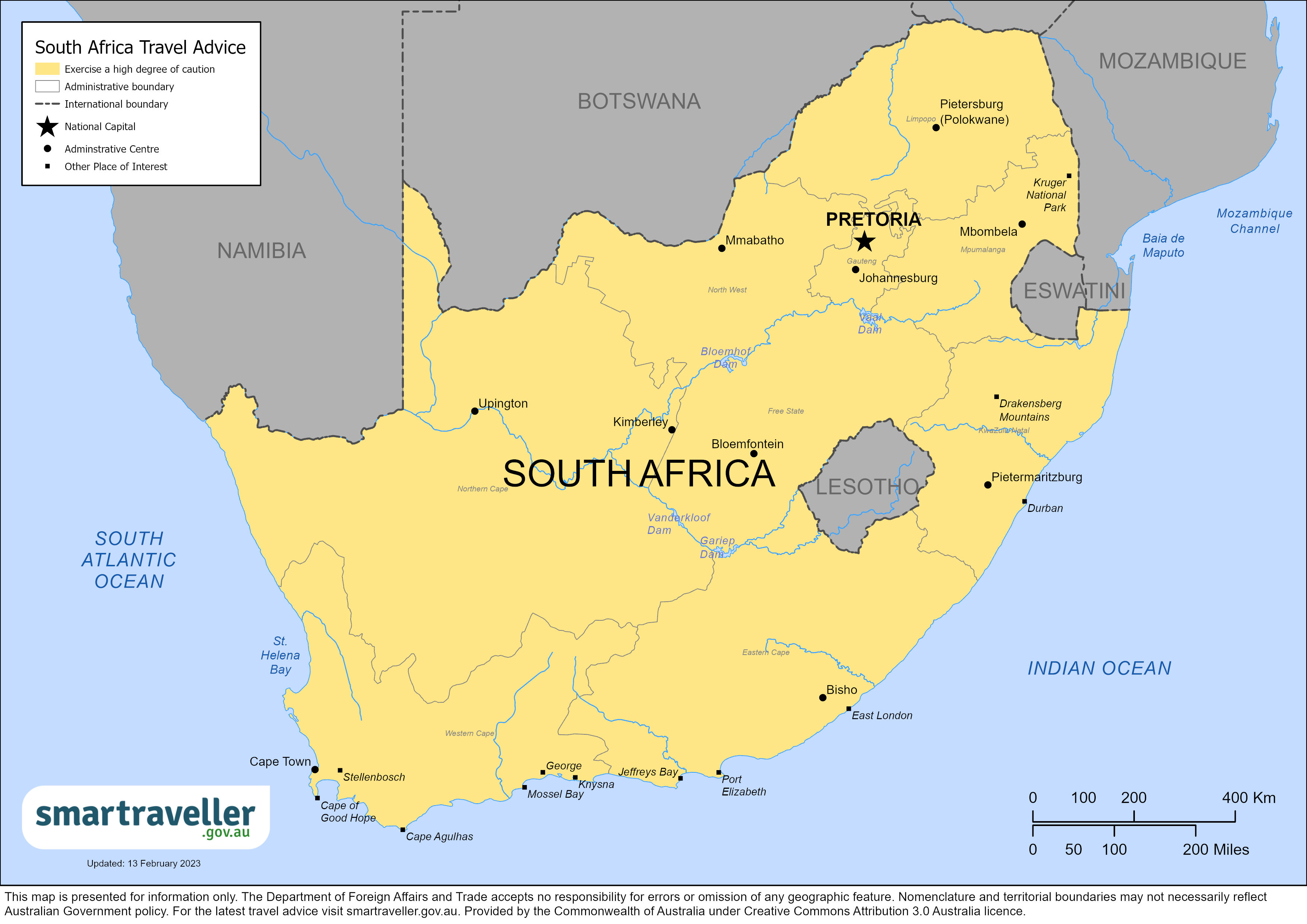
South Africa (PDF 811.22 KB)
Africa (PDF 1.77 MB)
Local emergency contacts
National emergencies.
Call 10111.
Fire and rescue services
Call 10177.
Call 10111, or go to the nearest police station.
Advice levels
Exercise a high degree of caution in South Africa.
- Protests and large gatherings can occur anywhere in South Africa at any time. Avoid protests, demonstrations or large demonstrations. Use major roads where it's safe to do so and verify that alternate routes recommended by your GPS are safe prior to travel. Monitor local media and follow the advice of local authorities.
- Crime and violence are serious issues across South Africa, including murder, rape, assault, food and drink spiking, robbery and carjacking. South Africa experiences more crime during its rolling blackouts (load-shedding). Be particularly alert in major city centres and township areas and when travelling after dark. Crimes in South Africa often involve the use of weapons.
- There’s a threat of kidnapping across South Africa, pay attention to your personal security.
- Terrorism is a threat worldwide and can occur anywhere at any time. Be alert to possible threats, especially in public places and follow the advice of local authorities.
- Opportunistic criminals also target travellers at the approaches to Kruger National Park, including Numbi Gate, and at the Lebombo/Komatipoort border. Criminals have also been targeting tourist vehicles at the approaches to Pilanesberg National Park and Sun City Resort.
- Criminals target travellers and their bags at airports and on public transport. Vehicles parked or stopped at intersections are also targeted. Criminals have posed as fake tourist police to extort and rob tourists.
- ATM and credit card fraud are common. Criminals wait near ATMs to rob people who have withdrawn cash. Be aware of your surroundings, and only withdraw small amounts. Keep your credit card with you at all times.
- Respect local wildlife laws. Only use professional guides or tour operators. Follow park regulations and advice from wardens. Don't swim in lakes and rivers due to the risk of wildlife attacks and disease.
Full travel advice: Safety
- HIV/AIDS infection rates are high in South Africa. Take steps to reduce your risk of exposure.
- Malaria and other insect-borne diseases, such as filariasis, are common. Make sure your accommodation is insect-proof. Use insect repellent.
- You must present a yellow fever vaccination certificate if you're over one year old and travelling from a country where yellow fever is widespread.
- Private hospitals are generally better equipped than public facilities. Medical evacuation is your only option in remote areas.
Full travel advice: Health
- Drug offences carry severe penalties, including long jail terms.
- Dual nationals must enter and exit South Africa on their South African passport. Penalties for travelling on another passport include fines, refusal of entry and jail.
Full travel advice: Local laws
- You don't need a visa if you're visiting South Africa for tourism purposes for up to 90 days. In other cases, you'll need a visa. Entry and exit conditions can change at short notice. Contact the nearest embassy or consulate of South Africa for the latest details.
- If travelling from Namibia to South Africa, you'll need at least two blank pages in your passport.
- Major routes can be subject to protest activities, often with little or no warning. Exercise caution and stay informed when planning travel and driving.
- Before you travel by road, check for any disruption on your route. Use major roads where it's safe to do so and verify that alternate routes recommended by your GPS are safe. There have been instances of travellers being rerouted by their GPS through unsafe areas.
- Rolling blackouts can affect both land and air travel. Confirm with your airline or travel provider.
Full travel advice: Travel
Local contacts
- The Consular Services Charter tells you what the Australian Government can and can't do to help when you're overseas.
- The Australian High Commission in Pretoria can provide consular help to Australians in South Africa.
- To stay up to date with local information, follow the High Commission’s social media accounts.
Full travel advice: Local contacts
Full advice
Civil unrest and political tension, demonstrations and protests.
Protests and large gatherings can occur anywhere in South Africa at any time. Services may be disrupted. Avoid areas affected by protests, demonstrations or large public gatherings.
Before you travel by road, check for any disruption on your route and use major roads where it's safe to do so. Verify that alternate routes recommended by your GPS are safe. There have been instances of travellers being rerouted by their GPS through unsafe areas. Follow the advice of local authorities. Monitor local news, radio, and social media for updates.
To protect yourself if you encounter a protest or local tension:
- monitor local media and other sources for updates, including advice on curfews imposed by authorities
- don't attempt to cross protester roadblocks, as this could provoke a violent reaction
- plan for interruptions to phone and internet services
- avoid areas affected by protests or unrest
- contact your airline or tour operator to confirm arrangements before you travel
- follow the instructions of local authorities.
If you're near a demonstration, leave if it's safe to do so.
There have been reports of protesters damaging property belonging to bystanders. Avoid taking photographs or video footage of demonstrations and protests.
More information:
- Demonstrations and civil unrest
Crime and violence are serious issues in South Africa.
Crime rates in South Africa are significantly higher than in Australia and often involve weapons.
Criminals continue to target tourist vehicles along the approaches to Kruger National Park, including Numbi Gate. Avoid Numbi Gate if possible, only travel in daylight hours, stay on main roads, and be aware of potential criminals in the vicinity of all gates and park approaches.
Armed criminals have been targeting tourist buses along the approaches to Pilanesberg National Park and neighbouring Sun City Resort, including near Lekgalong. If you can, avoid the R556 and use alternative routes available on the N4/R565 via Rustenburg. Travel in daylight hours and be aware of potential criminals near all gates and park approaches and when travelling through small towns.
Police in South Africa deal with a high volume of aggravated crime. Their resources are stretched. You may not get the level of service you would in Australia, especially for less serious crimes such as theft and fraud.
The South African Police Service doesn't have a 'Tourist Police' force. Criminals have posed as 'Tourist Police' to extort and rob tourists, including stopping tourist buses to check proof of identity and search luggage.
Crime at airports
Crime in and around airports can occur.
Criminals have robbed arriving passengers, following them from the airport to:
- foreign currency exchange facilities
- tourist accommodation
Theft from luggage also occurs. To avoid this, don't place valuables in checked-in luggage.
Police officer impersonation
Criminals may pose as police officers to extort or rob you. You may also be at risk of being kidnapped. Criminals use ‘flashing blue lights’ on plain vehicles and fake IDs to stop you or force you out of the vehicle.
Do not get out of your vehicle and always ask and carefully check identification.
If you’re suspicious, do not stop and continue to a place of safety.
For more information see the 'Kidnapping' section under ' Safety '.
Other crimes
Crime in South Africa includes:
- food and drink spiking
- mugging, robbery and theft, sometimes with weapons and violence
Robberies involving violence can occur at shopping centres. South Africa experiences more crime during its rolling blackouts (load-shedding), including at shopping centres. Be alert at all times.
Assaults and robberies on local commuter and metro trains happen:
- between Johannesburg and Pretoria
- in Cape Town
Theft from hotel rooms and guest houses does happen, including within game parks.
Criminals have stolen bags and backpacks from public places, including restaurants and bars. Be alert in all public spaces.
To avoid theft:
- don't leave luggage and valuables unattended
- place your luggage and valuables in safekeeping facilities
Crime rates are significantly higher after dark.
To protect yourself against crime, avoid travelling to:
- central business districts
- townships, unless with an organised tour run by a reputable company
- isolated beaches, lookouts and picnic areas
Crime involving vehicles
There have been arson attacks on cargo trucks to block roads in South Africa. Check local media for reports of attacks and avoid these areas.
If you encounter an attack, don't intervene, don't take pictures or videos, and leave the scene as soon as it is safe to do so.
Thieves posing as vendors or beggars target cars:
- on highways off-ramps
- at intersections
- at traffic lights
'Smash and grab' thefts from vehicles and carjacking are common, particularly:
- on major routes
- at major intersections
- during traffic congestion
Cash-in-transit attacks target armoured courier vans, sometimes using automatic weapons, creating a significant risk of death or serious injury to anyone nearby. Avoid driving alongside, parking next to, or being a pedestrian next to cash drops at banks and other venues.
Criminals also place debris on roads to stop vehicles. Don't stop to clear debris.
Road spiking occurs on South African roads, where criminals place spikes on roads to damage vehicles and force motorists to pull over.
To prevent theft when travelling by car:
- keep doors locked and windows up, even when driving
- keep valuables out of sight
- avoid driving after dark
- maintain situational awareness and stop at designated areas such as petrol stations
- if followed by a suspicious vehicle, go to a police station, petrol station or alert a security company
Attacks against hikers
There have been a number of attacks against hikers by criminals on hiking trails and in national parks and reserves. These have included Lions Head, Signal Hill and Table Mountain near Cape Town.
To prevent attacks when hiking:
- hike in groups
- advise friends, family or your accommodation provider where you are hiking and how long for
- be alert to your surroundings and circumstances.
Crime involving cash and credit cards
ATMs in major cities are common. ATMs in rural areas are less common.
ATM and credit card fraud is common. Criminals use skimming devices to copy your card details onto a blank card.
Criminals wait near ATMs and rob people withdrawing cash.
Criminals use spotters to identify victims who have withdrawn cash or made expensive purchases. Be aware of your surroundings.
To protect yourself against cash and credit card crime:
- only withdraw small amounts of cash at ATMs
- refuse offers of help at ATMs
- keep all ATM and credit card payment slips secure
- keep your credit card in sight at all times when using it
Don't use ATMs that open onto the street. Only use ATMs in controlled areas, such as:
- shopping centres
- inside service stations
Scams are common.
Don't be fooled by scams. If it sounds too good to be true, then it probably is.
If you're a scam victim, don't travel to South Africa to try and get your money back. The risk of assault is too high.
Fake internet friendship, dating and marriage schemes operate from some African countries. These typically take place on internet dating sites or chat rooms.
Someone you meet online may ask you to send money so they can travel to Australia to visit you. As soon as the scammer receives the money, they end their relationship with you.
Some may ask you to travel to Africa to meet them. When you arrive in Africa, they may kidnap, assault or rob you.
Report fraud and scams to the Commercial Crimes Unit of the South African Police Service in Johannesburg on +27 (12) 743 0148 or +27 (11) 220 4052
Cyber security
You may be at risk of cyber-based threats during overseas travel to any country. Digital identity theft is a growing concern. Your devices and personal data can be compromised, especially if you're connecting to Wi-Fi, using or connecting to shared or public computers, or to Bluetooth.
Social media can also be risky in destinations where there are social or political tensions or laws that may seem unreasonable by Australian standards. Travellers have been arrested for things they have said on social media. Don't comment on local or political events on your social media.
More information:
- Cyber security when travelling overseas
Power shortages and rolling blackouts (Load-shedding)
Rolling blackouts (load shedding) are occurring throughout South Africa, which are affecting private residences, businesses, municipal lighting, traffic lights, and hotels.
Blackouts can also affect water availability, internet connectivity, mobile phone network coverage, fuel availability, residential security features, and food supply.
Power outages can potentially increase crime; for example, traffic jams due to power outages provide opportunities for smash-and-grab crime. Residences can be targeted when lights are out, and security systems are not functioning. Ongoing conditions have led to increased protests and demonstrations, and in some cases, civil unrest, throughout the country.
Be prepared for issues that may arise from blackouts:
- have a communications plan for when there is no or limited power (landline locations, external mobile phone battery/power banks, additional charging cords, hard copies of important numbers).
- maintain several days’ worth of non-perishable food, drinking water, and other essential items, including medicine and first aid supplies.
- store torches, batteries, radios and basic tools in quick-access locations.
- identify safe areas around the city, including hotels, hospitals or police stations that may not lose power.
- monitor local media and follow the instructions of local authorities.
Terrorism is a threat worldwide. An attack could happen anywhere and at any time.
- Consider likely terrorist targets and the level of security provided, including places visited by foreigners, such as shopping centres.
- Always be alert to possible threats, especially in public places.
- Report any suspicious items or activities to the police.
In July 2020, ISIL (Daesh) issued a warning via its digital newspaper that its fighters would start attacking Western gas interests in Mozambique 'sooner or later' and also warned it could conduct attacks in South Africa because of South Africa's involvement in anti-ISIL operations in Mozambique.
In October 2022, there were reports of terrorists planning an attack in Sandton, Johannesburg.
To reduce your risks:
- take official warnings seriously
- monitor the media for threats
If there's a terrorist attack:
- leave the affected area immediately if it's safe
- avoid the area afterwards in case of more attacks.
Kidnapping occurs across the world with political, ideological, and criminal motives. Foreigners, including Australians, have been kidnapped overseas whilst travelling. Kidnappings can happen anywhere, anytime, including in destinations that are typically at lower risk.
There's a threat of kidnapping across South Africa. Foreigners have been kidnapped in the past. Kidnappings are generally for financial gain or motivated by criminality. Scammers may kidnap you to seek a ransom for your release.
Express kidnappings happen in South Africa, particularly in Gauteng province; anyone can be targeted. Criminals may kidnap or threaten you to force you to withdraw large amounts of money from ATMs or banking applications on your phone.
If, despite our advice, you travel to an area with a high risk of kidnapping, our ability to provide consular assistance in these destinations will be limited.
To reduce the risk of kidnapping:
- always be alert to your personal security and surroundings
- get professional security advice for travel in locations with a heightened kidnap risk
- check your accommodation has appropriate security measures
- avoid isolated locations, particularly when travelling alone
- vary your movements and don’t set patterns
- notify family or friends of planned travel and share your location
- avoid talking about your money or business affairs
- don’t display money or valuables in public
- use ATMs inside banks, hotels and shopping centres and during daylight hours
- avoid giving personal details to strangers online or over the phone
- always use licensed taxi services
The Australian Government's longstanding policy is that it doesn't make payments or concessions to kidnappers. Ransom payments to kidnappers have funded further terrorist attacks and criminal activity. Paying a ransom to terrorist groups will likely break Australian counter-terrorism financing laws.
See the 'Crime' section under ' Safety ' for more details.
More information:
Adventure activities
Wildlife safety.
Respect local wildlife laws. Maintain a safe and legal distance when observing wildlife.
Only use reputable and professional guides or tour operators.
Follow park rules and the advice of wardens.
Swimming safety
Be cautious about swimming in lakes and rivers due to the risk of wildlife attacks or waterborne disease.
Climate and natural disasters
Flooding, landslides, bushfires, tsunamis, severe weather.
If a natural disaster happens:
- follow the advice of local authorities
- secure your passport in a safe, waterproof place
- keep in touch with your friends and family
- ask your tour operator if tourist services at your destination have been affected.
- Global Disaster Alert and Coordination System
Travel insurance
Get comprehensive travel insurance before you leave.
Your policy needs to cover all overseas medical costs, including medical evacuation. The Australian Government won’t pay for these costs.
If you can't afford travel insurance, you can't afford to travel. This applies to everyone, no matter how healthy and fit you are.
If you're not insured, you may have to pay many thousands of dollars up-front for medical care.
- what activities and care your policy covers
- that your insurance covers you for the whole time you'll be away.
Physical and mental health
Consider your physical and mental health before you travel, especially if you have an existing medical condition.
See your doctor or travel clinic to:
- have a basic health check-up
- ask if your travel plans may affect your health
- plan any vaccinations you need
Do this at least 8 weeks before you leave.
If you have immediate concerns for your welfare or the welfare of another Australian, call the 24-hour Consular Emergency Centre on +61 2 6261 3305 or contact your nearest Australian Embassy, High Commission or Consulate to discuss counselling hotlines and services available in your location.
- General health advice
- Healthy holiday tips (Healthdirect Australia)
Medications
Not all medication available over the counter or by prescription in Australia is available in other countries. Some may even be considered illegal or a controlled substance, even if prescribed by an Australian doctor.
If you bring restricted medication or don't have the right documents, you could:
- be arrested
- have your medication confiscated
This includes countries where you don't leave the airport.
If you intend to bring medicine, check if:
- there's a limit on how much you can take
- whether you need any certifications
If your medication is illegal in South Africa, ask your doctor in Australia about alternatives.
Take enough legal medicine so you remain in good health on your trip.
Carry a copy of your prescription or a letter from your doctor stating:
- what the medication is
- your required dosage
- that it's for personal use
Health risks
Yellow fever.
If you're travelling from a country where yellow fever is widespread, you'll need a valid yellow fever vaccination certificate to enter South Africa. This doesn't apply to a child aged under 1 year.
If you can't show proof of vaccination, authorities may not let you enter.
You can't get vaccinated when you arrive.
The rate of HIV/AIDS infection in South Africa is very high.
Take steps to reduce your risk of exposure to the virus.
Victims of violent crime, especially rape, should seek immediate medical help.
Insect-borne diseases
Malaria is present in parts of South Africa, especially:
- remote areas in the far north
- remote areas in the east
- Kruger National Park
The 90km area along the border with Mozambique and Zimbabwe is a designated malaria risk zone. Some areas nearby may have a malaria risk during the year.
Other insect-borne diseases, including filariasis , are also prevalent.
To protect yourself from disease:
- make sure your accommodation is insect-proof
- use insect repellent
- wear long, loose, light-coloured clothing
Take medicine to prevent malaria if travelling to an area where it's common.
Cholera mainly occurs in rural areas. More serious outbreaks can happen from time to time.
To protect yourself against cholera:
- avoid ice cubes
- avoid raw and undercooked food, such as salads
- be strict with your hygiene habits if you travel in rural areas
- drink boiled water or bottled water with sealed lids
Tap water in major cities is generally safe to drink.
Other infectious diseases
Waterborne, foodborne and other infectious diseases are prevalent.
There's currently an outbreak of Mpox (formerly known as monkeypox) in parts of Africa, including in South Africa. Maintain strict hygiene standards and avoid physical contact with infected people, animals (especially primates and rodents) and items that may have come into contact with them.
- Mpox (Australian Government)
Other diseases include:
- drug-resistant tuberculosis
- Rift Valley virus
- bilharzia (schistosomiasis)
Serious outbreaks sometimes occur.
To protect yourself from illness:
- avoid contact with animal tissues or blood when visiting farms or game reserves
- only drink pasteurised or homogenised milk
- don't eat raw meat
- don't swim in freshwater
- avoid contact with dogs and other mammals
If you're bitten or scratched by an animal, get medical help immediately. Seek medical advice if you have a fever or diarrhoea.
- Infectious diseases
Medical care
Medical facilities.
The standard of medical facilities in South Africa varies.
Public medical facilities are generally low standard compared with Australia. Private hospitals are often better equipped.
Many regional hospitals only provide basic facilities.
There's no shared healthcare agreement between Australia and South Africa.
Before admitting you, hospitals usually ask for:
- confirmation of medical insurance
- up-front deposit for services
- public hospitals will treat foreigners for free, but the level of care varies.
In remote areas, air evacuation to a major city is sometimes the only option in an emergency. Medical evacuation can be very expensive.
Decompression chambers are located at:
- St Augustine's Hospital, Durban
- Milpark Hospital, Johannesburg
- Eugene Marais Hospital, Pretoria
You're subject to all local laws and penalties, including those that appear harsh by Australian standards. Research local laws before travelling.
If you're arrested or jailed, the Australian Government will do what it can to help you under our Consular Services Charter . But we can't get you out of trouble or out of jail.
If you're detained or arrested, you need to ask officials to tell the Australian High Commission in Pretoria.
- Arrested or in prison
Penalties for drug offences are severe and include long prison sentences.
- Carrying or using drugs
Commercial surrogacy
Get legal help if you're visiting South Africa for commercial surrogacy.
Australian laws
Some Australian criminal laws still apply when you’re overseas. If you break these laws, you may face prosecution in Australia.
- Staying within the law
Dual citizenship
You can't enter or exit South Africa on an Australian passport if you're an Australian-South African dual national.
If you try, you may be:
- turned away from border points
- jailed for up to 12 months
If you're unsure if you will be treated as a South African dual national, check with:
- the South African Department of Home Affairs
- the nearest South African embassy or consulate.
- Dual nationals
Visas and border measures
Every country or territory decides who can enter or leave through its borders. For specific information about the evidence you'll need to enter a foreign destination, check with the nearest embassy, consulate or immigration department of the destination you're entering.
Visa-free travel for short stays
You don't need a visa if you're visiting South Africa for tourism purposes for up to 90 days. In other cases, you'll need a visa.
Leaving and re-entering South Africa won't automatically give you another 90 days.
Check South Africa's immigration rules about:
- overstaying visas
- working in or migrating to South Africa
- changing your visa status
- extending your visa by travelling to a neighbouring country and attempting to return
- South African Department of Home Affairs
Other formalities
South African dual nationals can’t enter or leave South Africa with a foreign passport. See Laws
South African authorities:
- don't accept provisional travel documents
- do accept Australian emergency passports
Travel with children
Children travelling on a valid passport with one or both parents are no longer required to present a birth certificate, parental consent letter and other supporting documentation. However, this is a requirement for other situations, such as unaccompanied minors travelling (under the age of 18) or legal guardianship.
To check the requirements for other situations, such as legal guardianship or unaccompanied travelling minors, visit the South African Department of Home Affairs.
If travelling from Namibia to South Africa, make sure you have at least two blank pages in your passport.
Some countries won’t let you enter unless your passport is valid for 6 months after you plan to leave that country. This can apply even if you’re just transiting or stopping over.
Some foreign governments and airlines apply the rule inconsistently. Travellers can receive conflicting advice from different sources.
You can end up stranded if your passport is not valid for more than 6 months.
The Australian Government does not set these rules. Check your passport’s expiry date before you travel. If you’re not sure it’ll be valid for long enough, consider getting a new passport .
Your passport must have at least 2 completely blank pages to endorse your entry permit on.
If your passport doesn't comply with these requirements, authorities may stop you from boarding.
Lost or stolen passport
Your passport is a valuable document. It's attractive to people who may try to use your identity to commit crimes.
Some people may try to trick you into giving them your passport. Always keep it in a safe place.
If your passport is lost or stolen, tell the Australian Government as soon as possible:
- In Australia, contact the Australian Passport Information Service .
- If you're overseas, contact the nearest Australian embassy or consulate .
Carry copies of a recent passport photo with you. You may need to replace your passport while you're overseas.
- South African High Commission in Australia
Passport with 'X' gender identifier
Although Australian passports comply with international standards for sex and gender, we can’t guarantee that a passport showing 'X' in the sex field will be accepted for entry or transit by another country. Contact the nearest embassy, high commission or consulate of your destination before you arrive at the border to confirm if authorities will accept passports with 'X' gender markers.
More information:
- LGBTQIA+ travellers
There are limits to how much money you can bring into South Africa. Foreign nationals can enter with a maximum of either:
- 25,000 Rand (ZAR)
- foreign currency equivalent to $US10,000
You may have to declare the amount of money you're carrying when you arrive or leave.
Local travel
Power shortages and rolling blackouts (load shedding).
Rolling blackouts (load shedding) occur throughout South Africa, affecting traffic lights and causing road congestion and delays. It may also affect other modes of travel, such as air and rail travel. Check with your airline or travel provider.
Public transport
Avoid using minibus taxis. Ask your accommodation host or tour guide for advice about using public transport.
Book local transport through a reputable provider.
- Transport and getting around safely
Taxis and rideshare services
Tensions between metered taxis and rideshare drivers can escalate to violence.
Be careful:
- around train stations
- when travelling to and from airports
Avoid catching a rideshare service that is close to a metered taxi.
Driving permit
To drive in South Africa, you must:
- have a valid Australian driver's licence, and
- be at least 18 years of age
Driving without the correct licence can affect your insurance.
If you move to South Africa, you can swap your Australian driver's licence for a South African licence. You must do so within the first 12 months of your residency. Contact the issuing road authority if you're requested to obtain a verification of your driver's licence to convert your licence.
If you're going to ride a motorcycle, check whether your travel insurance policy covers you. Always wear a helmet.
Use extreme caution on roads.
Road travel
There have been arson attacks on cargo trucks across South Africa. These attacks can cause damage to infrastructure, road closures and lengthy delays. Before you travel by road, check for any disruption on your route and use major roads where it's safe to do so. Verify that alternate routes recommended by your GPS are safe using verified sources. Monitor local news, radio, and social media for updates. There have been instances of travellers being rerouted by their GPS through unsafe areas. Follow the advice of local authorities.
Road conditions are generally good but can vary, especially in rural areas.
Hazards in urban and rural areas include:
- excessive speed
- poor driving skills
- difficult conditions
- pedestrians and animals straying onto roads, especially at night
- drunk driving, especially at night
People have been attacked travelling on alternate and secondary roads to Cape Town International Airport. When travelling to or from the Cape Town International Airport:
- remain on the M2 or N2 highways if safe to do so
- avoid detours through Borchard’s Quarry Road leading to Nyanga
- Airport transfers are available
You're more likely to be killed in a motor vehicle accident in South Africa than in Australia.
- Driving or riding
Emergencies
Depending on what you need, contact your:
- friends and family
- travel agent
- insurance provider
National emergencies
Medical emergencies.
Always get a police report when you report a crime.
Your insurer should have a 24-hour emergency number.
Consular contacts
Read the Consular Services Charter for what the Australian Government can and can't do to help you overseas.
Australian High Commission, Pretoria
292 Orient Street Arcadia Pretoria, South Africa Phone: (+27 12) 423 6000 Fax: (+27 12) 342 8442 Email: [email protected] Website: southafrica.embassy.gov.au Facebook: Australian High Commission in South Africa Twitter: @AuHCSouthAfrica
Check the High Commission website for details about opening hours and any temporary closures.
24-hour Consular Emergency Centre
In a consular emergency, if you can't contact an embassy, call the 24-hour Consular Emergency Centre on:
- +61 2 6261 3305 from overseas
- 1300 555 135 in Australia

Travelling to South Africa?
Sign up to get the latest travel advice updates..
Be the first to know official government advice when travelling.

17 Absolute Best Places to Visit in South Africa (+Map & Tips)
By Author Jurga
Posted on Last updated: February 19, 2024
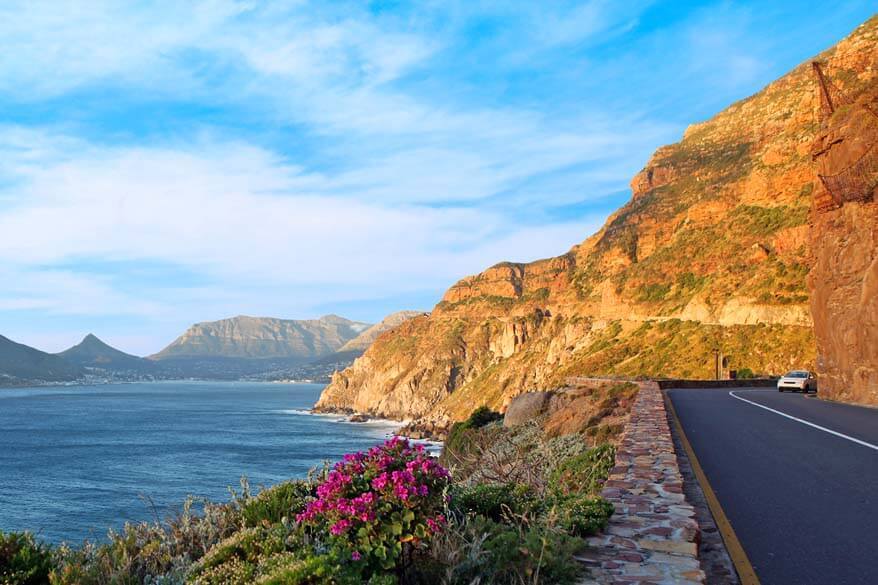
If you are reading this because you searched for the best places to visit in South Africa , then it probably means that you already know that South Africa is one of the most remarkable countries in the world and that you are considering a trip there.
Go for it! South Africa is one of the most beautiful destinations you’ll ever visit!
South Africa is so special and unique that it’s often called The World in One Country . And so it is! S-A is like a perfect mix of the very best of the entire world in one place. At the same time, it’s like no other place on Earth…
In this article, you can find a list of the very best places to see in South Africa. 17 incredible destinations in South Africa that are worth a trip from the other side of the world. Find out!
Disclosure: This article is sponsored by South African Tourism . It’s not a secret that South Africa is our absolute favorite country in the world, so we are really excited to be working with them to inspire you to discover this incredible country. All opinions and enthusiasm about South Africa are, of course, our own.
We fell in love with South Africa the first time we visited it many years ago and I’m sure you’ll feel the same way too. It’s a place that captures your heart forever.
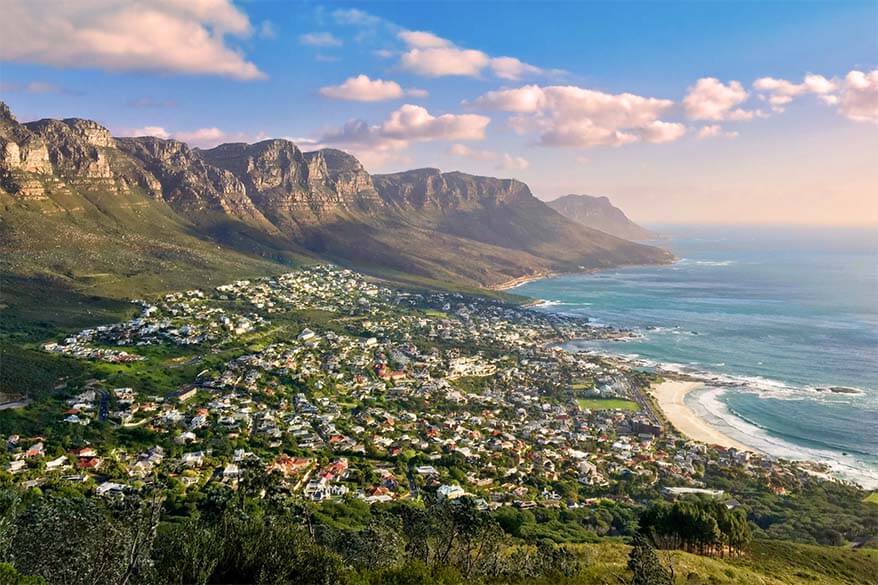
Below, you can find the list of the most amazing places you should visit in South Africa .
This is in no way a complete list, but it should give you a good idea of what to expect and where to go when visiting for the first time. It’s the list of the very best things to do and places to see in South Africa .
I ranked this list by putting my own favorites on top. So if you are limited in time, I suggest that you start with the top of the list and work your way down. At the bottom of this article, you can also find the map indicating all the main tourist attractions in South Africa mentioned in this post. Find out!
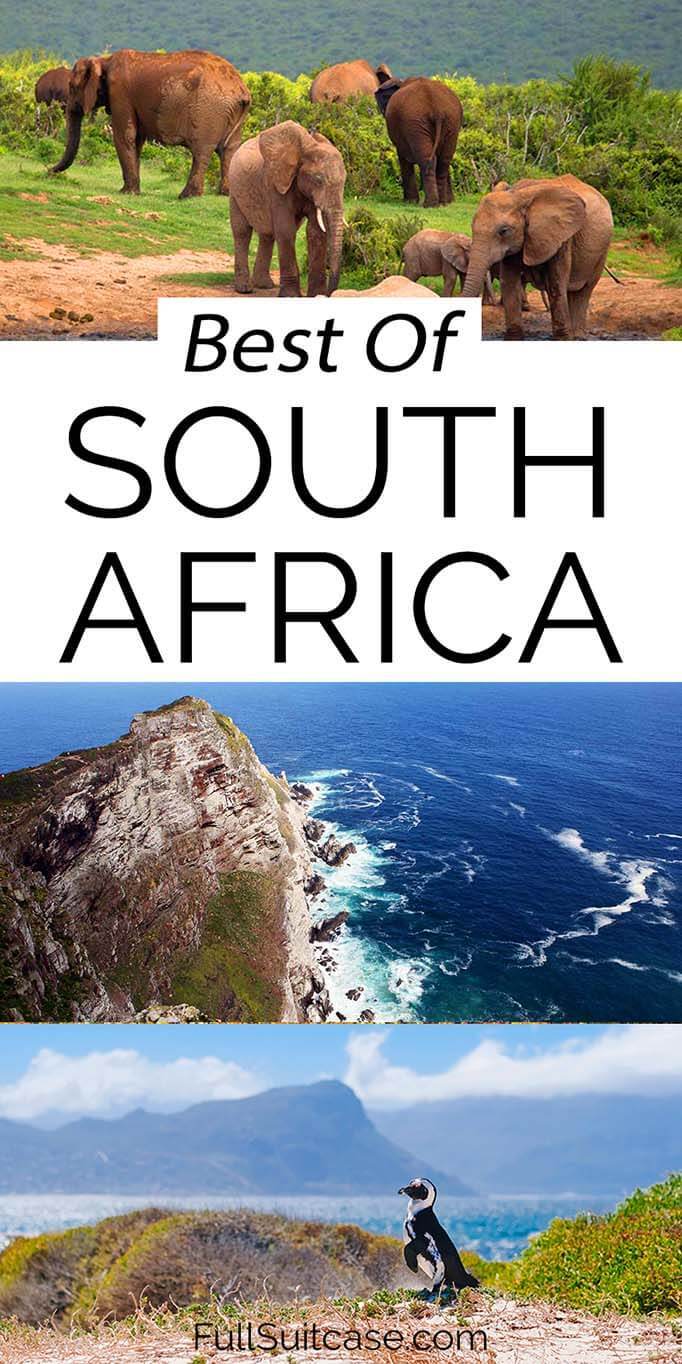
TIP: If you are not sure how to plan your trip, please check our South Africa 2 week itinerary that covers most of the must-see places in South Africa. Please note that it’s a very complete itinerary, but it doesn’t leave much extra time to explore deeper.
If you want to visit every place from this list, you’ll need at least 3 weeks and it will be rushed. If you want to see all the best places in South Africa mentioned in this article AND have some time to explore somewhat deeper, you’ll probably need at least a month…
These are the best places to visit in South Africa:
1. Cape Town
If there is one place you absolutely have to see in South Africa, it’s Cape Town . It was the oldest European establishment in South Africa (1652) and is therefore often referred to as the Mother City.
It’s difficult to describe in just a few words what Cape Town is all about. You really have to experience it in order to be able to appreciate the mingle of African and European cultures, a mix of tradition and modern, and the unique blend of city life and nature…
If South Africa is the world in one country, then Cape Town is the world in one city. Absolutely not to be missed when visiting South Africa!
Here are some of the main places you have to see in Cape Town : Victoria and Alfred Waterfront, Table Mountain, Signal Hill & Lion’s Head, Robben Island, Bo-Kaap area, Kirstenbosch National Botanical Garden, Two Oceans Aquarium, and also the city center with its local markets, shops, restaurants, and museums.
TIP: If the gondola to the top of Table Mountain is open, go there first. It often gets closed due to high winds, so don’t leave it for the last day.
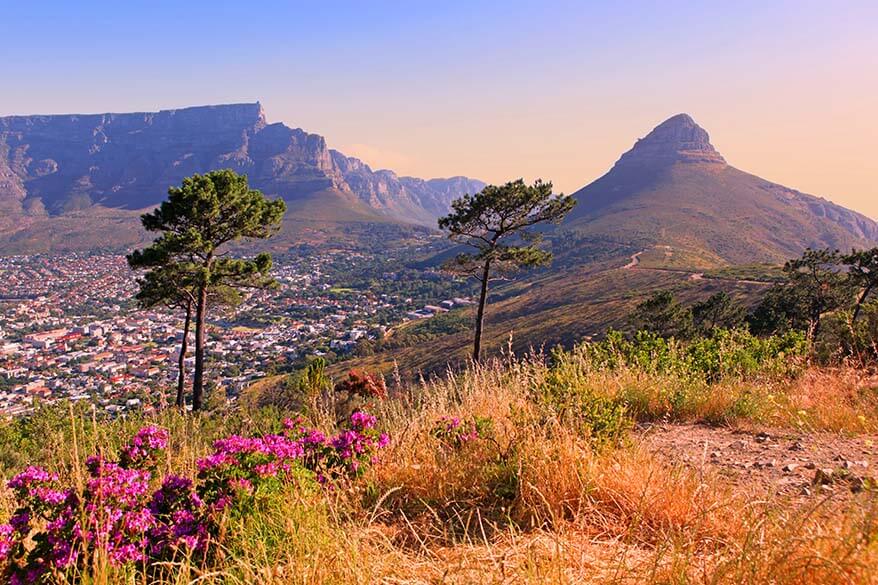
2. Cape Peninsula
Together with Cape Town, Cape Peninsula is one of the most impressive regions of South Africa. This is one of those places that you really don’t want to miss!
The absolute highlights of the Cape Peninsula include Cape of Good Hope and Cape Point and the stunning 12 Apostles coastline from Camps Bay to Hout Bay and further south along Chapman’s Peak Drive .
Not to be missed is Simon’s Town with Boulder’s Beach penguin colony (yes, you can see wild penguins in South Africa!) and also an ocean walkway from Muizenberg to Kalk Bay via St. James beach is really nice. Groot Constantia wine region in Cape Peninsula has spectacular scenery and some of the best wines in South Africa.
Also, in Hout Bay you can take a boat to see a seal colony – it’s called Duiker Island , but most people just refer to it as Hout Bay Seal Island. This is a very popular tourist attraction, so you may want to book in advance. For a more unique experience, you can even go snorkeling with the seals .
TIP: One day is hardly enough to see the highlights of Cape Peninsula. So if you can, try to spend at least a few days in this area. I recommend at least a week for Cape Town and Cape Peninsula, with 3-4 days being an absolute minimum.
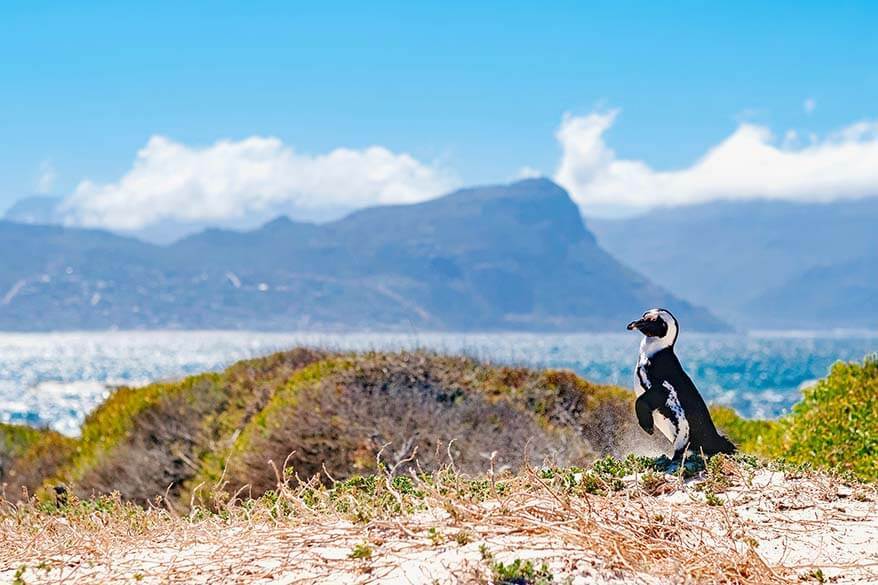
3. The Garden Route
Another absolutely amazing region, the Garden Route is one of those places you really have to see in South Africa as well. This +-200km stretch between Mossel Bay and Stormsrivier is one of the most scenic routes in the world, but you have to take the time in order to truly appreciate it.
You could drive the Garden Route in just half a day, but you won’t see much just by sitting in the car. So ideally you take at least a couple of days to explore this area.
Some of the nicest places along the Garden Route are Storms River and Tsitsikamma National Park , Robberg Nature Reserve , Plettenberg Bay , the whole area around Knysna (don’t miss the Heads and the Featherbed Private Nature Reserve!), Wilderness , and the beautiful coastline along the entire route.
Oudtshoorn , famous for its ostrich farms and Cango Caves , is a bit out of the way from the rest, but it’s also considered as part of the Garden Route. Well worth a visit.
TIP: If you are traveling with kids or if you just love wildlife, don’t miss Monkeyland and Birds of Eden (both just next to each other). Plettenberg Bay Game Reserve is a great place for a family-friendly safari along the Garden Route and Knysna Elephant Park is one of the best ethical places to interact with elephants in South Africa.
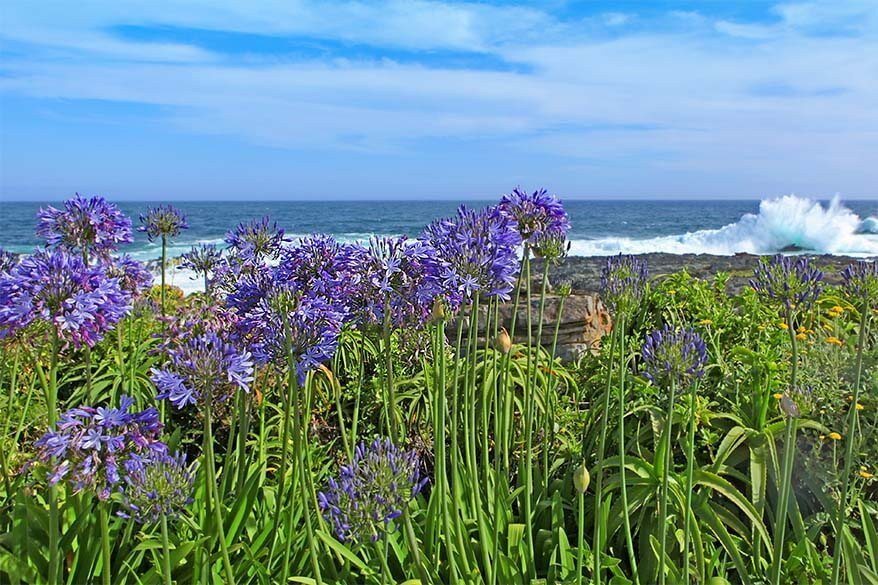
4. Kruger National Park
Without any doubt, Kruger National Park is one of the best-known places to visit in South Africa. If you want the best wildlife safari experience in South Africa, then Kruger NP is definitely the place to be.
Kruger is the oldest and also the biggest National Park in South Africa. To give you an idea, with 2,000,000 hectares (20,000 km 2 ), it’s about the size of Israel or the state of New Jersey. In other words, Kruger NP is huge! Ideally, you plan to spend at least 2-3 days in Kruger NP and make several game drives.
Hundreds of animal species call Kruger home and it’s also the best place to see the Big 5 in South Africa. The Big 5 refers to five most difficult African animals to hunt on foot: lion, leopard, elephant, rhino, and Cape buffalo. Hunting is really not cool anymore, but this term is widely used as a sort of ‘5 must-see African animals’ list.
There are 101 ways to explore Kruger National Park. You can opt for one of the many luxury lodges and private safari rides , organized day tours , or you can drive and explore Kruger NP with your own car. No matter which way you choose to explore Kruger National Park, it’s a place that you really must see in South Africa!
If you have never been on a safari before, please check our ultimate guide to safari in Africa .
TIP: Combine a visit to Kruger National Park with the nearby Panorama Route and Blyde River Canyon (see below).
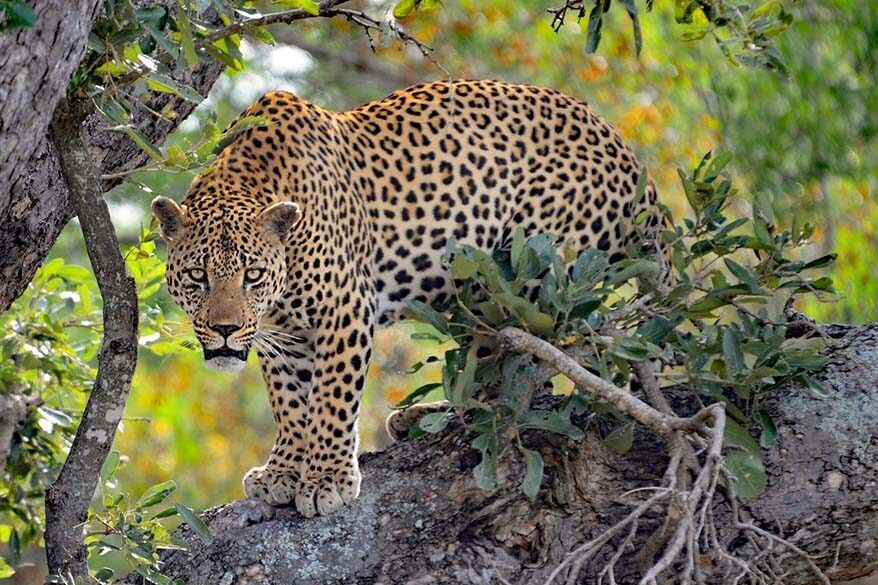
5. Blyde River Canyon & Panorama Route
Blyde River Canyon is one of the most beautiful natural landmarks of South Africa. It’s also one of the largest canyons in the world. Due to its proximity to several main entrances of Kruger National Park, Blyde River Canyon Nature Reserve and the whole Panorama Route make a very popular day trip in the area.
Together with Kruger NP, Blyde River Canyon is one of the most popular tourist attractions in northern South Africa.
Start your day with breakfast at the famous Harrie’s Pancakes in Graskop . Then head north to the Pinnacle , God’s Window , and Wonder View . Further highlights of the Panorama Route include Lisbon Falls and Berlin Falls , also Bourke’s Luck Potholes , and Lowveld viewpoint . But the most impressive of them all is the Three Rondavels viewpoint . The scenery here is simply spectacular!
Three Rondavels was one of the first places we visited just after arrival in South Africa and that image stayed with us forever. It was here that we fell in love with this amazingly diverse country and realized that it has so much more to offer than we ever imagined… Don’t miss if you are visiting Kruger NP and have a day to spare!
If you have more time, you can also consider a visit to the Echo Caves or a small museum-town called Pilgrim’s Rest.
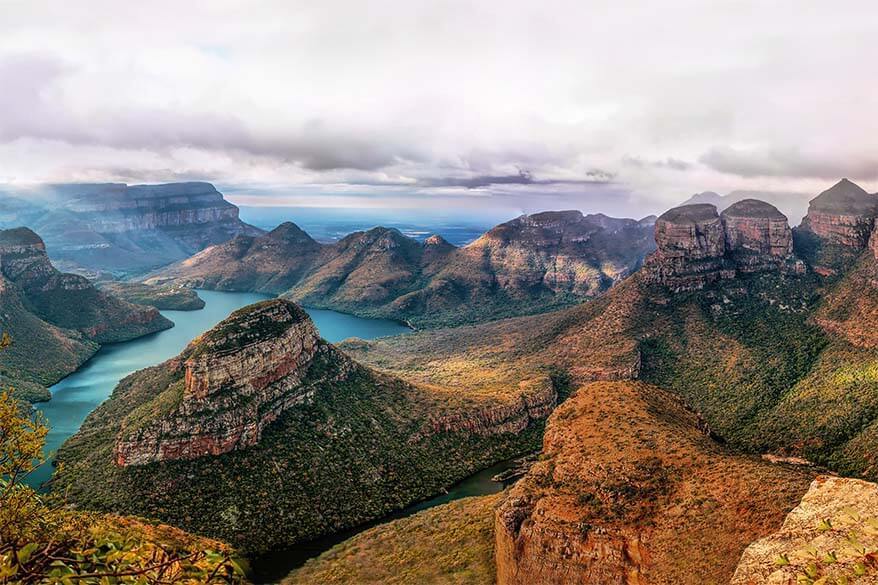
6. Hermanus
Hermanus is my husband’s favorite place in South Africa, one we always wish we had stayed longer at…
The town itself isn’t that special, but its coastline is second to none! Grab a picnic and explore the beautiful coastal walking path. The bay near Hermanus is known as the best place to see whales and dolphins in South Africa and it definitely lives up to its reputation!
You can take a whale watching boat tour and get really close to these majestic animals, but you can usually also see them from ashore. Both experiences are very different and each special in their own way. I really recommend both – taking the boat tour and also walking the coastal route in Hermanus and watching whales and dolphins from the shore.
Please note that whales are not always around. The best time to see whales in Hermanus is between June and December, but some years they arrive earlier or leave later, so you just never know.
We have been on many whale-watching tours all over the world, but nowhere did we see so many whales from so close by as in Hermanus. There were tens of whales just meters away from our boat… We also saw hundreds of dolphins while walking along the coast. It sure is one of the best places to go whale – and dolphin-watching in the world.
TIP: Nearby Gansbaai is also a beautiful place with a stunning coastline and a good chance to see the whales. It’s not as well known and therefore much less visited than Hermanus, but it’s a perfect place to visit for those who have more time in the area and looking to discover some off-beat hidden gems.
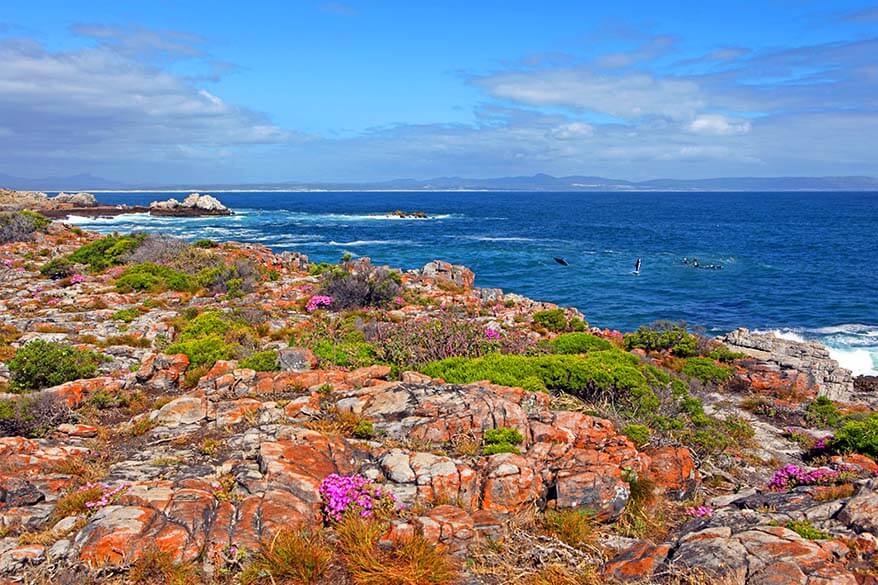
7. South Africa Wine Region: Stellenbosch and Franschhoek
South Africa has become world-famous for its wines and the best region to see the wineries and taste some wines is the beautiful area between Stellenbosch, Paarl, and Franschhoek.
This wine region is just a short drive from Cape Town and is therefore really easy to visit, even if you only have limited time in South Africa.
Stellenbosch and Paarl are bigger towns and I’m not sure if they are worth a visit, but the nearby wineries and the surrounding scenery is a must. We loved the quaint little Franschhoek town with its white buildings, hilly landscapes, and a very cozy atmosphere. Such a beautiful region – a place you have to see in South Africa!
TIP: Don’t drink and drive! If you are staying in Cape Town, you can visit the wine region with an organized day tour. Here is one of the best-rated and most complete wine region tours from Cape Town that I was able to find.
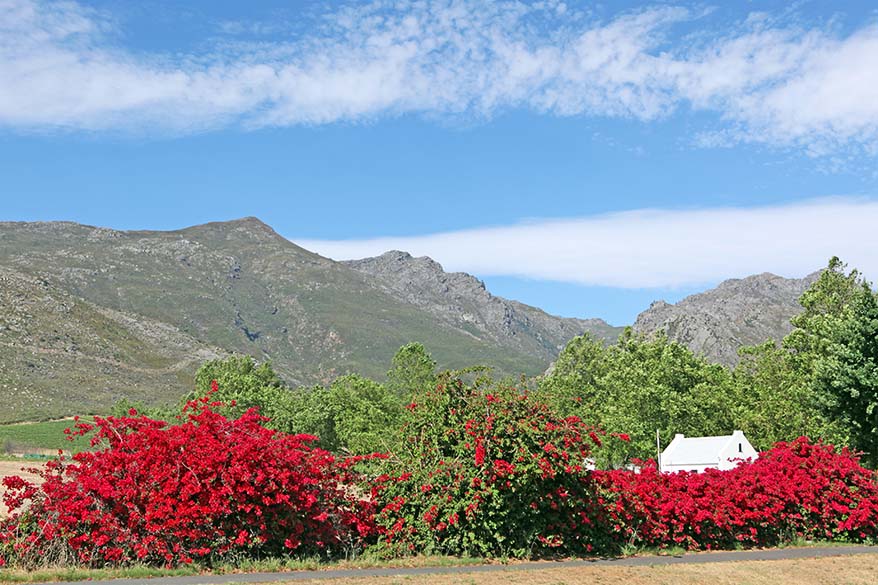
8. Cape Agulhas – Southernmost Tip Of Africa
Cape Agulhas, the Southernmost place in Africa , is so far from every other landmark in South Africa and main tourist routes that it doesn’t get the attention it deserves. But what a beautiful and unique place it is!
Standing at this point where two oceans meet you truly feel like you’ve reached the end of the world…
The best way to visit Cape Agulhas is by making a stop there on your way from Cape Town to the Garden Route (or vice versa). We once did it in a day, just stopping there when driving from Knysna to Cape Town, but it was a really long drive.
TIP: I suggest that you break the drive and either stay in Cape Agulhas or in the area around Hermanus or Gansbaai for one night.
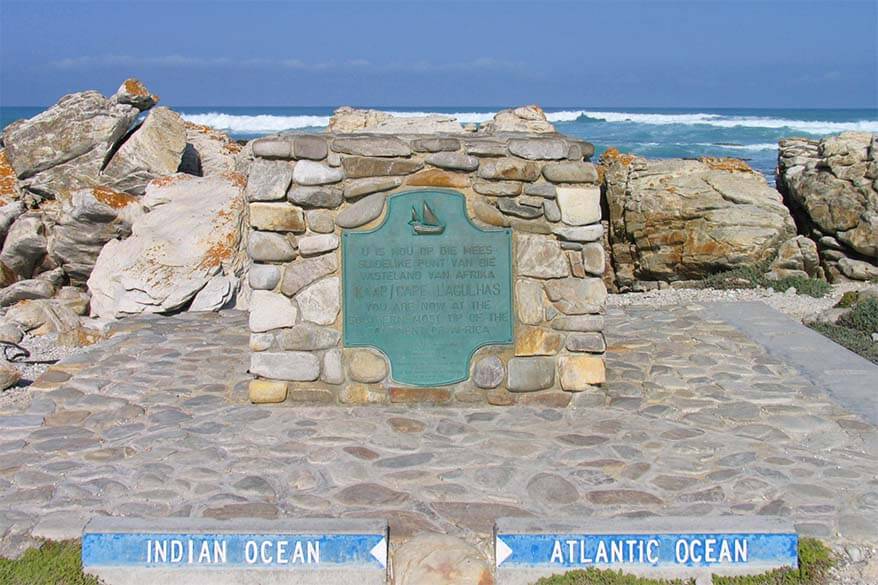
9. Drakensberg
Another wonderful region a bit off the beaten tourist path in South Africa is the Drakensberg mountains . The Dragon Mountain is a +-200km mountain range between the Kingdom of Lesotho and KwaZulu Natal province in South Africa, a few hours drive from Durban.
The region is known for its incredible vistas, countless waterfalls, mountain streams, rock pools, caves, and tranquil scenery pretty much undisturbed by human development. The Drakensberg is the highest mountain range in South Africa and if you visit here in the winter (July) as we did, be prepared for the freezing cold temperatures at night.
Theoretically, you could visit the Drakensberg region just for a day, but ideally, you spend at least a couple of days here. There is a wide range of outdoor activities available, such as hiking or golf to mention just a few…
TIP: If you stay close to the Underberg area (we stayed at this hotel ), you can pop over the border and visit Lesotho for a day ( day tours are available too).
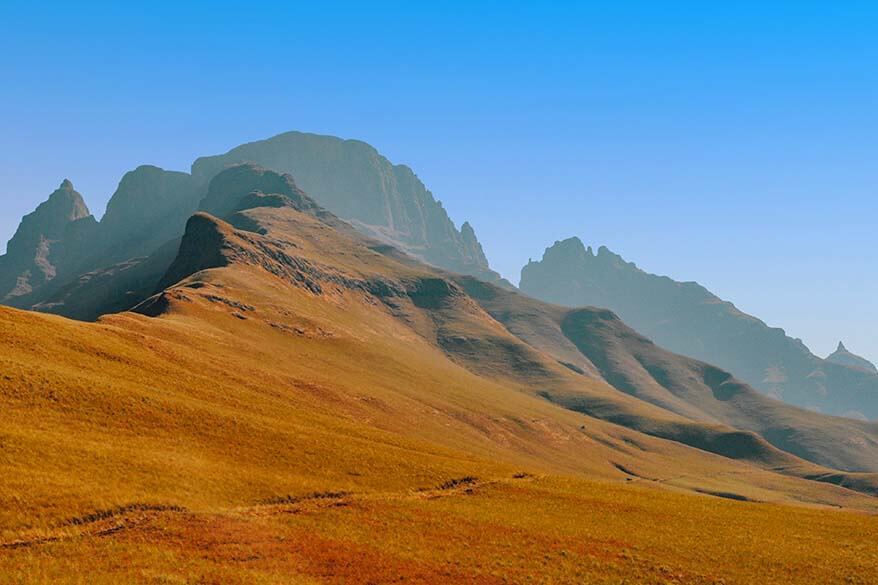
10. Addo Elephant National Park
If you are looking for a malaria-free family-friendly safari experience in Africa, Addo Elephant National Park is one of the very best places to do that.
South Africa’s third-largest National Park is located in the southern part of the country, close to Port Elizabeth and just a few hours drive from the Garden Route.
As the name suggests, Addo Elephant NP is a perfect place to see wild elephants. This park is home to over 600 elephants and they are all around. Many other African animals live here as well and if you are really lucky, you may even get to spot The Big 5…
TIP: You can easily explore the park on a self-drive safari. But – as always – a guided open-jeep safari tour will give you a very different experience. If you come here for a few days and have your own car, I suggest you do both – visit the park on your own but also book at least one safari ride.
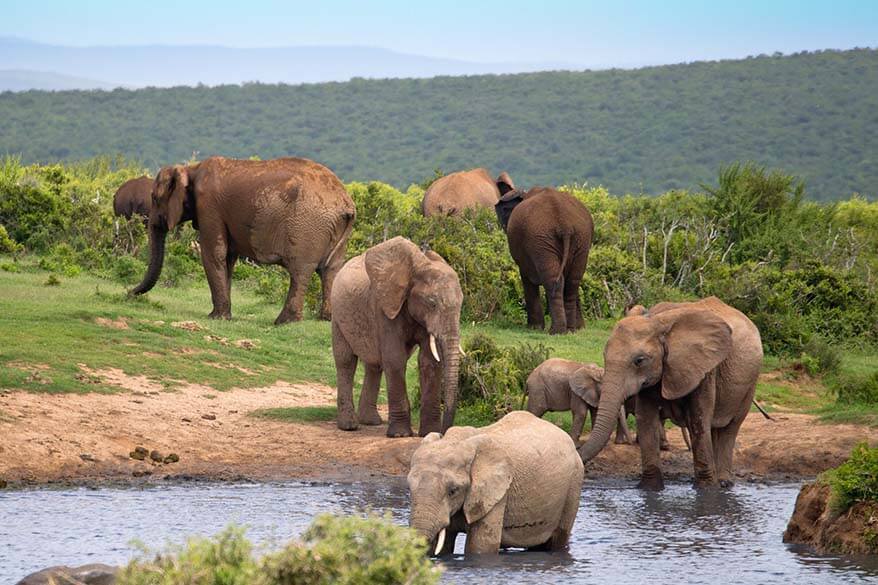
11. iSimangaliso Wetland Park
Listed as a UNESCO World Heritage Site, iSimangaliso Wetland Park has a lot to more to offer than it looks at first sight. It’s not that widely known and definitely not one of the main tourist attractions in South Africa, but it’s well worth a trip.
iSimangaliso Wetland Park has it all: beautiful scenery, unique landscapes, white-sand beaches, snorkeling, diving, and lots of wildlife. You can expect to see rhino, zebra, buffalo, troop baboons, wildebeest, and even elephants, to name just a few…
One of the main reasons tourists visit this area is to see hippos in the wild. iSimangaliso Wetland Park is a paradise for water-loving animals and is, therefore, one of the best places to see hippos and crocodiles in South Africa .
TIP: You can visit the park by car, but if you really want to get close to the hippos and the crocodiles in a safe way, it’s best to book St. Lucia estuary boat tour . The boat tour takes just two hours, so you can spend the rest of the time self-driving and exploring the park.
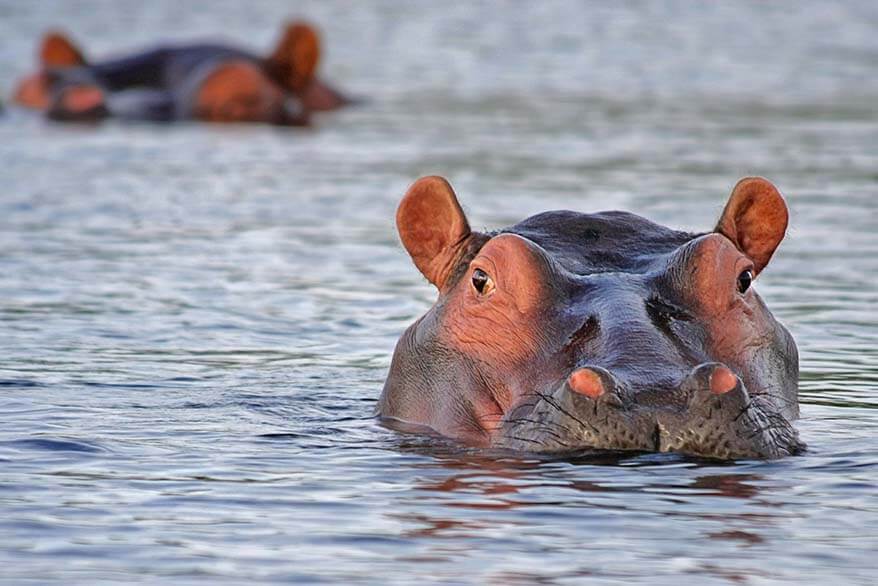
12. Pilanesberg National Park
Just over 2 hours drive from Johannesburg, Pilanesberg National Park is probably one of the easiest and best-accessible places for a wildlife safari in South Africa.
Pilanesberg Game Reserve is set in an extinct volcanic crater, where the soil is rich with grasslands, perfect for wildlife. A man-made lake, Mankwe Dam, is used as a drinking waterhole – a perfect place to see African animals.
Wildlife here includes zebras, lions, elephants, rhinos, leopards, and many other species. Because the park is rather small, it’s quite easy to find the animals, even if you come here just for a few hours.
TIP: You can visit Pilanesberg National Park as a day trip from Johannesburg , but if you have some time to spare, stay a few days. If you like places like Las Vegas in the US , don’t miss the nearby Sun City with entertainment for young and old.
From luxury resorts and casinos, waterparks and golfing, to outdoor activities, wildlife viewing, and even hot air balloon safari – this area truly has it all.
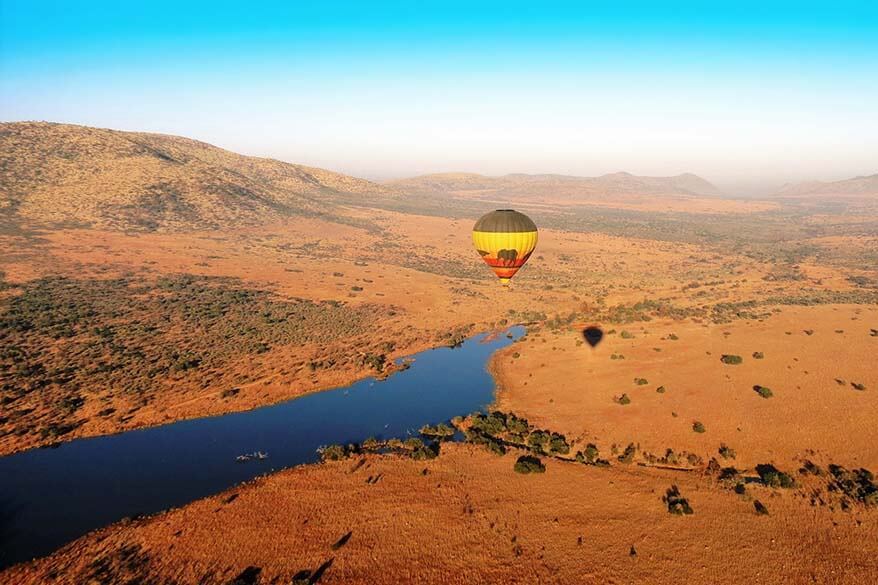
13. Hluhluwe-iMfolozi Park
One can never have too many safari experiences in Africa, right? So if you are visiting St.Lucia/Durban area, then I really recommend a day trip to Hluhluwe-iMfolozi Park .
This park is not as well known as Kruger and the other National Parks mentioned above, but it’s just as beautiful and offers amazing wildlife viewing. Africa’s Big 5 live here and, of course, many other animals.
TIP: You can visit this park on a self-drive safari or take a guided safari tour from Durban . If you want to make the best of your short time, you can also opt for a tour that combines Hluhluwe and iSimangaliso Wetlands, mentioned above.
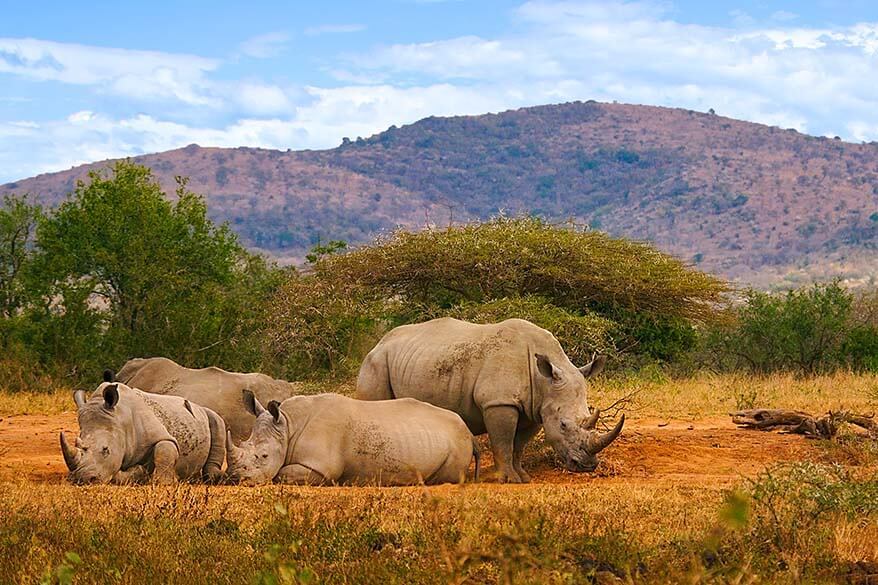
14. West Coast National Park
Just an hour drive north of Cape Town, West Coast National Park is the locals’ favorite, so if you come in a warm season, expect it to be busy. This park has beautiful beaches, stunning coastlines, scenic hiking trails, wildlife, and lots of wildflowers.
Springtime (August – September) is the best time to see the flowers and the park might be even busier than usual.
West Coast National Park is considered a real jewel. It’s not a must-see in South Africa if you are short on time, but if you are staying in Cape Town and have a day to spare, definitely check it out!
TIP: There aren’t many facilities here; it’s all about nature. So if you come for a day, make sure to bring some food and plenty of water.
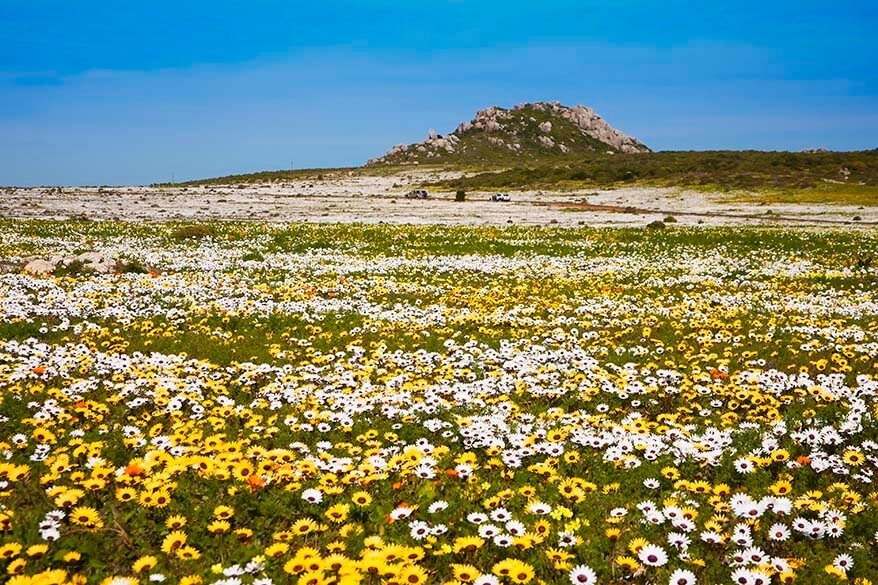
Durban is considered one of the cities that you should see in South Africa. We found that there were better ways to spend our time in South Africa than visiting its cities… so we didn’t stay in Durban longer than necessary. Just in case you wonder, Cape Town is a whole other story, one city you have to see.
Nevertheless, if you are traveling in this area, you shouldn’t miss Durban. One of the best things to do here is go to the beach and stroll the Golden Mile , visit UShaka Marine World or Durban Botanic Gardens .
Durban is also a good base for a day trip to the earlier mentioned Hluhluwe-iMfolozi NP and iSimangaliso Wetland Park, and also to the Drakensberg mountains. A really interesting thing to do in Durban is also this Shakaland and Zulu culture day trip .
TIP: If you are short on time, fly from Durban to Port Elizabeth or Cape Town – it will save you lots of driving.
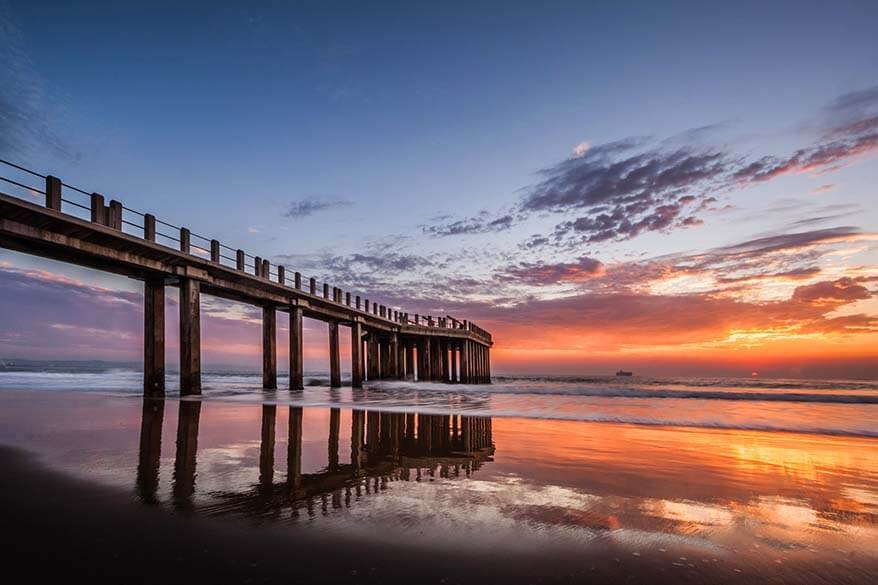
16. Johannesburg
The largest city in South Africa, Johannesburg’s history goes back to the 19th century. It’s hard to believe that this bustling city with a population of 1 million started as a gold-mining settlement.
If you want to learn about South Africa’s long part to democracy, then don’t miss Soweto township ( go with a guide! ) which was once home to Nelson Mandela and also Desmond Tutu.
Must-see in Johannesburg is the Apartheid Museum and Constitution Hill , a former prison complex. Mahatma Gandhi, Nelson Mandela, and tens of thousands of others were imprisoned here at some point in South Africa’s turbulent history…
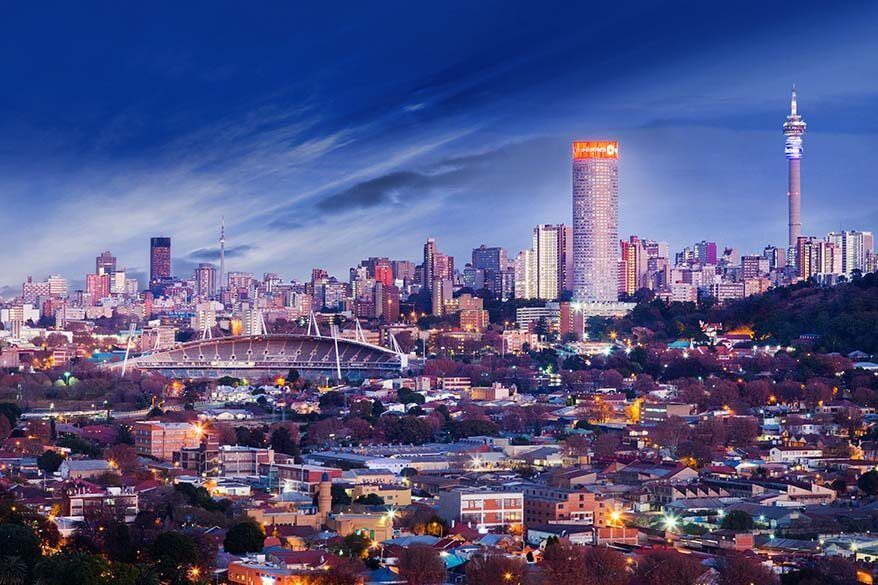
17. Namaqua National Park & Namaqualand
Namaqualand and Namaqua National Park , close to the Namibian border, are so far from all the other tourist attractions in South Africa that you’ll hardly ever see it mentioned as one of the best places to visit in the country. It’s actually more of a hidden gem of South Africa.
Come spring and the dusty valleys are transformed into a magical wildflower wonderland. The whole area is covered in colorful flower carpet, attracting local visitors and international tourists alike.
If you are visiting South Africa in August-September and feel like getting off the beaten path, you may want to include this unique region in your itinerary.
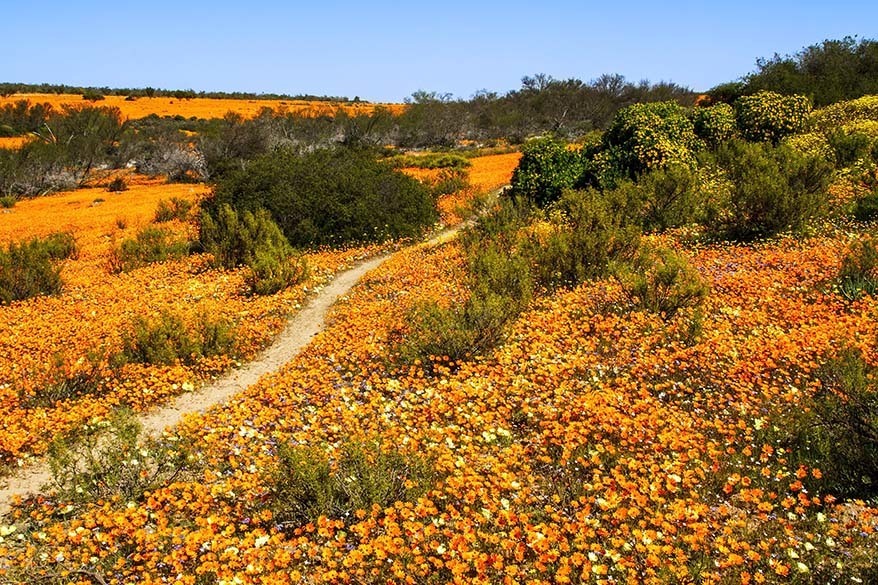
Best places to visit in South Africa on the map
In order to help you plan your trip to South Africa and visit as many of the highlands as possible, I created this map indicating all the places mentioned in this article. This way you can get a better idea of where everything is located and plan accordingly.
How to use this map: Use your computer mouse (or fingers) to zoom in or out. Click on the icons to get more information about each place. Click the arrow on the top left corner for the index. Click the star next to the map’s title to add it to your Google Maps account. To view the saved map on your smartphone or PC, open Google Maps, click the menu and go to ‘Your Places’/’Maps’. If you want to print the map or see it in a bigger window, click on ‘View larger map’ in the top right corner.
So, this is our list of the most beautiful and trip-worthy places to visit in South Africa . If you are wondering where to go and what to see in South Africa, now you should have a much better idea.
South Africa Travel FAQ
Here are some of the popular questions our readers ask about visiting South Africa:
South Africa is a year-round destination and every season has something to offer. The best time to see wildlife in Kruger National Park is the dry season between May and October. Whereas the best time to visit Cape Town and the Garden Route is between September – November and from March to May.
South Africa is huge and there are so many beautiful places to see. But if you have to choose just one area to visit, we recommend Cape Town and Cape Peninsula.
South Africa is not the safest place to visit in the world and the crime rate is quite high. That being said, if you are cautious, aware of your surroundings, and do not take unnecessary risks, crime against tourists is really not that common. We visited South Africa several times, also with kids, and we never experienced any problems.
No, South Africa is not an expensive destination. The biggest cost or the trip is the flight to get there. Accommodation, food, and activities are quite cheap in South Africa. But – as everywhere in the world – a lot depends on the choices you make and mostly on the accommodations that you choose.
2 weeks is the minimum time if you want to see the most beautiful places of South Africa. If you have about 10 days, spend 3 days in Kruger NP and fly to the south of the country for the rest of the trip. If you have 1 week or less, it’s best to concentrate on just one area – either Kruger NP and surroundings or Cape Peninsula and the Garden Route.
TIP: When planning a trip to South Africa, make sure to also check our South Africa itinerary . It contains most of the highlights of South Africa from this list and shows you how to see all the best places in just two weeks. Check it out – it will help you plan a trip of a lifetime!
And if you are traveling with a family, check out this guide for more info on what to expect and where to go when visiting South Africa with kids .
If you found this post helpful, don’t forget to bookmark it and share it with your friends. Are you on Pinterest? Pin these images!
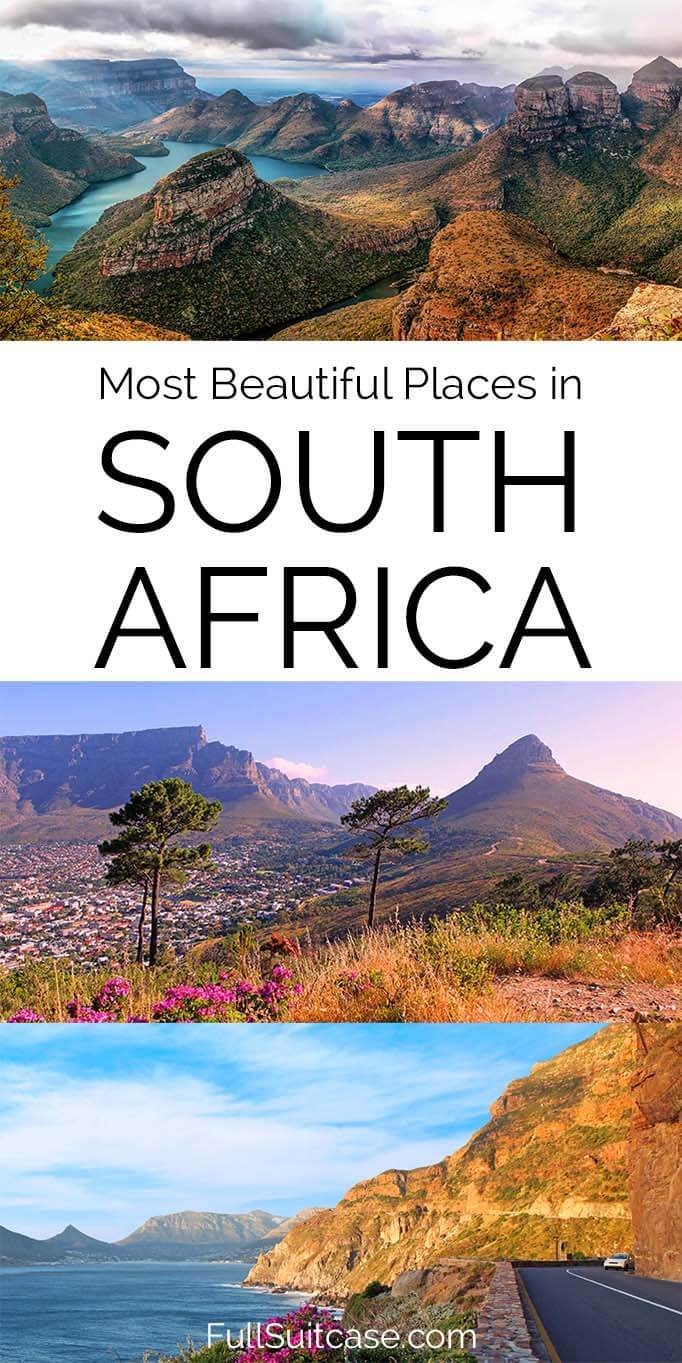
This site uses Akismet to reduce spam. Learn how your comment data is processed .
Sunday 30th of October 2022
Hi, South African here living in Jhb. A must is Oribi Gorge Southern KWAZULU-NATAL, if planning a Durban trip. I love traveling my country as well as other African countries.
We just got back this September from a road trip to Etosha National Park, Namibia. As always we absolutely loved it.
Sunday 6th of November 2022
Thanks for the additional tip and happy travels, Vennie!
Sunday 18th of September 2022
This is so helpful! I will definitely go to South Africa someday. Thank you so much!
Monday 19th of September 2022
Glad to hear that. Hope you can visit South Africa one day - it's a wonderful country!
Wednesday 4th of May 2022
Thanks Jurga! This is a great source of information. Just planning a three week trip to South Africa for December 2022. My first trip to South Africa since 1991. You've given me plenty of ideas for my itinerary.
Oh, lucky you! We're also contemplating another trip to S-A soon. Good luck with the planning and have a great trip! PS We also have a guide with a sample 2-week South Africa itinerary - check it out. You could build on it if you want to visit all these places and add more since you have 3 weeks.
Tuesday 22nd of March 2022
Thanks for sharing such a beautiful informative information on the blog. I have read your other posts which are all really informative for any traveler before arriving South Africa.
Wednesday 23rd of March 2022
Glad to hear you found our guides useful. Happy travels!
Thursday 10th of February 2022
The end of this month I am going to travel to South Africa by myself. I am 21 years old and I am from the Netherlands. The first 2 weeks I am going to work at an Baboon orphanage center in Phalaborwa, which is next to the Kruger National Park. In these two weeks I will have some free time to visit the Kruger Park on a safari. After the two weeks I have 4 weeks to travel by myself to see other beautiful places in South Africa, and stay in hostels etc. My idea is to take a flight after the two weeks from Hoedspruit airport to Durban or Kaapstad, and then stay there for a while and see other nice places. Do you guys have any tips for my journey?
Kind regards,
Friday 11th of February 2022
Hi Jesse, this sounds like an amazing experience for you! With 4 weeks to travel in South Africa (and already having seen Kruger before), you can see a lot. Durban - Drakensbergen area is nice, but I'd definitely try to spend more time in the south - the Garden Route, Cape Town, etc. If you are not renting a car, it will be a bit more difficult to explore outside the cities, but you can find a lot to do in/near them too. If you choose just one place, then Cape Town is really the best option. And you can also take some tours if there are some places you absolutely want to see and can't easily get to on your own. Hope this helps a bit. Have a great time in South Africa!

- Africa / Ask RAI / Travel Hacks / Travel tips
35 [Essential] South Africa Travel Tips for Your First Trip in 2024
Published October 6, 2023 · Updated October 6, 2023
Oh hey traveler… You’ve read my 20 reasons why you should travel to South Africa , and are now planning your very first trip to the tip of Africa .
Today you get to find out my best travel tips to South Africa in preparation for your adventure, on arrival at the airport and when travelling through the country. This article will ensure you are well-informed and well-prepared for that trip of a lifetime.
Read on to discover my essential South Africa tips worth knowing before you go ⇓
Reading time: 8 minutes
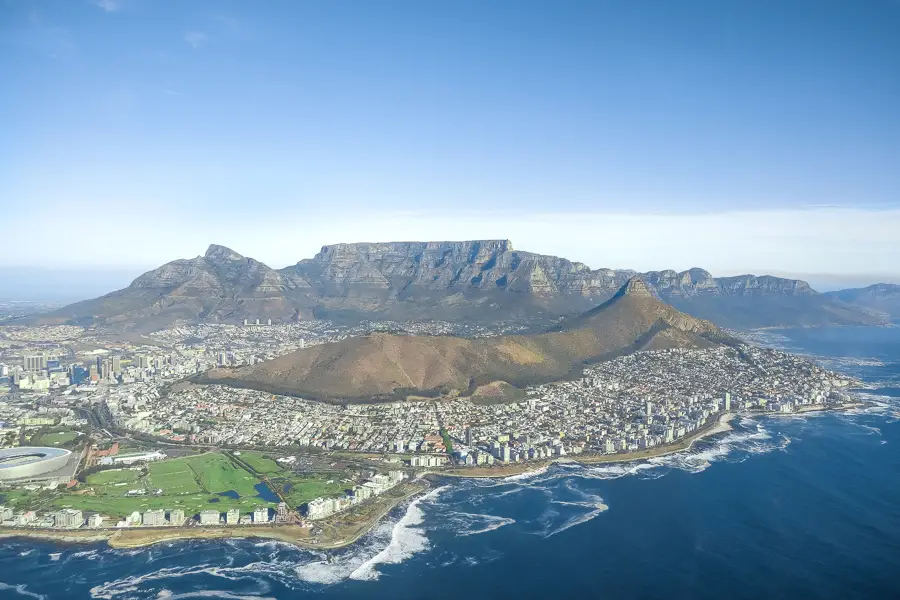
South Africa is often referred to as a rainbow nation with a melting pot of diverse people, languages, and African and Colonial cultures. This is location dependent somewhat, but you will fit in no matter the language you speak, the clothes you wear, or the colour of your skin.
A trip to South Africa should be on the bucket list of every intrepid traveler . The country at the tip of Africa welcomes thousands of visitors each year looking to experience its diversity, its beauty, its landmark attractions , and its endless possibilities for adventure.
You often hear visitors saying, “I wish I had known …”
What follows is my travel guide and tips for visitors planning on traveling to South Africa for the first time .
Whether you’re going on a safari, planning a road trip along the coast, or visiting the lively cities of Cape Town, Johannesburg, and Durban, I’ve got you covered ↓
Useful South Africa Travel Tips
Before I continue, note that I don’t think you have to know everything before you arrive. Part of the pleasure and gratification of travel is discovering and exploring the unknown without any preconceived ideas or expectations.
It is good to be prepared, but leave some revelations and encounters for the actual journey .
>> Read next: The best places to visit in South Africa
If you’re looking for more travel preparation tips, check out this guide about what to know before travelling to Egypt .
To help you prepare you for the unexpected and to arrange a stress-free trip , here are my top tips for your first trip to South Africa!
Let’s get into it. First up….
Before Travelling to South Africa: Tips
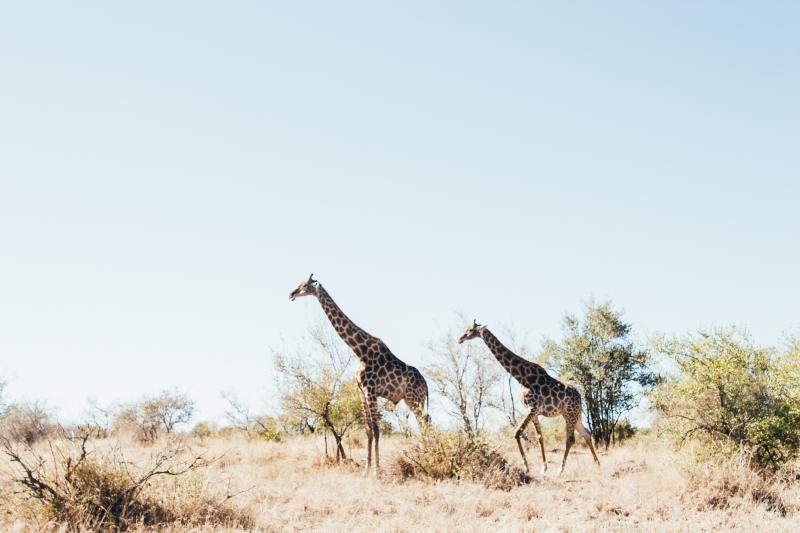
Planning a trip to South Africa:
It is worth having, in advance, a practical list of what to expect and know before travelling to and on arrival in South Africa. I know you’re wondering:
IS SOUTH AFRICA SAFE?
This is a question I get asked a lot . “Yeah, but is South Africa as a country a safe destination?”
Yes, within reason and with precaution .
Safety is a major concern of first-time visitors to South Africa. Although the country has a high crime rate and crime is an issue, the majority of incidents occur in areas that are away from the usual tourist trail and so the risk to tourists is low.
It is imperative to use common sense and to always be aware of your surroundings . It is also helpful to know which actions and places to avoid to stay safe in South Africa. With proper precaution and preparation, many problems can be avoided.
How to remain safe in South Africa as a traveller:
— Do blend in To stay safe avoid looking like a tourist.
— Avoid ostentatious displays of expensive possessions such as jewellery, cameras, mobile phones and other valuables.
— Do not keep any items unattended … like you may do so back home. Store valuables (including passports) in the safety deposit box of your accommodation. Keep huge camera equipment, handbags, phone and other valuable belongings out of view to avoid attracting any unwanted attention.
— Better safe than sorry As a preventative measure and common caution, remember to keep your car doors locked at all times.
— Pay attention to your location and surroundings as you would in every major city around the world
— Know where you are going before you head off particularly at night
— Do not put any valuables in suitcases Carry all valuables with you in hand luggage as opposed to leaving in the checked luggage. I hear things are better now, but Johannesburg airport, in particular, had a bad reputation for things going missing from luggage.
>> Related reading: The safest African countries in 2024 ranked + essential safety tips when in Africa
WEATHER IN SOUTH AFRICA
The Best Time to Visit
South Africa experiences a sub-tropical temperate climate that is warm and generally dry . The weather is pleasant and sunny for most of the year. Winters (June – August) are mild with snowfall in the mountainous regions.
Check the weather before arrival in South Africa and make a note of the season.
Many visitors incorrectly think that it’s constantly hot , this being Africa after all. No, there are district seasons each with their own climate.
The Western Cape, including Cape Town, receives most of its rainfall during winter, so it’s best to travel here outside of this period. On the flip side, when it is hot, you can easily get sunburnt. So pack some sunscreen.
Seasons: Summer – December to February Autumn – March to May Winter – June to August Spring – September to November
AVOID : if at all possible, avoid visiting South Africa during the peak summer months of December – February . You will have to put up with inflated prices and also enlarged crowds as both international and local visitors take a break in the holiday season. You will also want to avoid school holiday periods that include mid-June to mid-July.
HEALTH REQUIREMENTS: VACCINATIONS
— Malaria tablets are advisable should you be travelling within a malaria region in malaria season.
— Currently, no vaccinations are required when visiting South Africa, however, proof of yellow fever vaccinations on arrival are needed if you travel through a country with a risk of yellow fever.
Travel Tip: Don’t forget to pack some insect repellant that is essential in helping to ward off mosquitoes and other insects.
[Covid19]: Travelling to South Africa
All visitors to South Africa are expected to follow the rules set out by the government. These include following social distancing in public spaces, regular washing or sanitizing of hands, and a compulsory wearing of masks.
In addition to this, all international travellers arriving at the designated airports will be required to provide a negative COVID-19 test result , recognized by the World Health Organization, that was obtained less than 72 hours from the time of departure .
Failing to submit a negative COVID-19 test result, will lead to an antigen test being conducted on arrival at own cost. Testing positive for COVID-19 will result in compulsory isolation at own cost, for a period of ten days.
❗ Update: All of South Africa’s COVID-19 entry restrictions have been lifted on June 22, 2022 . As a result: · No proof of negative pre-departure COVID-19 test results are required. · No proof of vaccination is required to enter South Africa. Yeaahhhh!
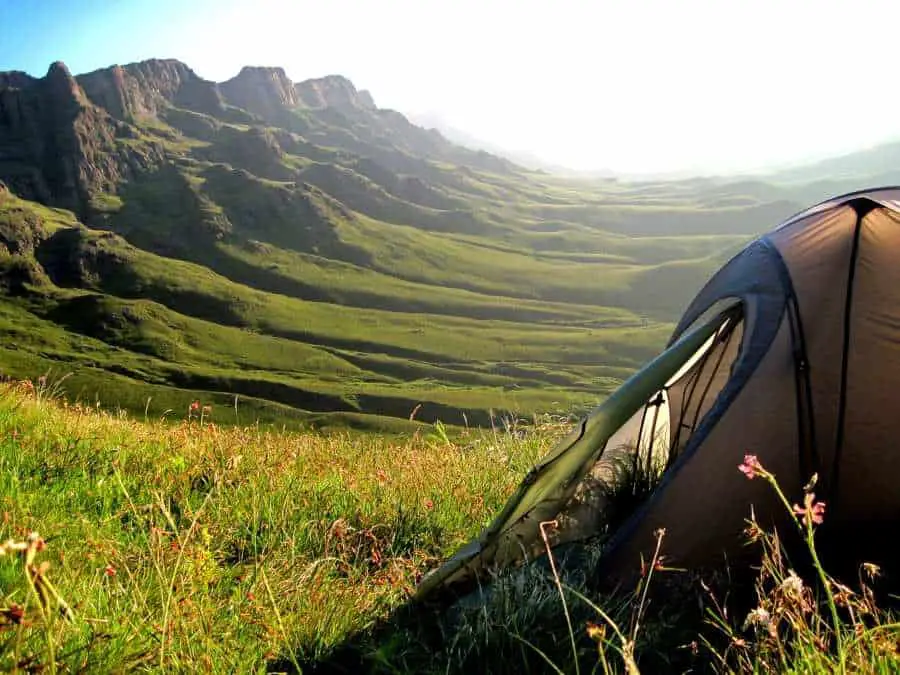
SOUTH AFRICA PACKING LIST
Don’t overpack. This common mistake should be avoided.
Be sure to leave some room space in the luggage for souvenirs and other stuff you will come across. South Africa is a relatively affordable vacation for visitors and you will want to make purchases along the way.
What To Wear
Bring a mix of stylish and old clothes. You will have use for both depending on your activity or occasion.
Most hotels and game lodges offer an extremely quick laundry turnaround, often a same-day service, at additional services. It is not necessary to bring a separate change of clothing for each day and evening. I would recommended that you keep luggage to a minimum for your own comfort and ease of transport, especially if you are using light aircraft transfers.
Bring clothes that are lightweight, cool, and comfortable made of a natural, “breathable” fabric. Summer temperatures can reach well into the 30 – 40 degree Celsius range in some areas. Definitely bring a swimming costume and possibly an umbrella or raincoat as this is when most of the country gets its rain.
The winters are generally mild, but there are periods when a cold front makes an appearance, so be prepared with a warm jacket, fleece or sweater. Cape Town gets its rain during the winter season so it’s recommended to bring rain gear.
— Always bring a hat, sunglasses and sunscreen as the sun can be strong even in the winter months.
— Walking shoes are a good idea all year-round.
— Some establishments stipulate smart casual and a collard-shirt and trousers or slacks, a blouse and skirt is needed.
— For game viewing, a couple of lightweight, khaki or neutral-toned items will be useful. A scarf and hat for the dust and heat is recommended.
— Binoculars
— Camera and accessories
— Personal toiletries, lip balm and insect repellent
Wide variety of shopping
Don’t dread if you forget to pack something. Great shopping malls are dotted throughout the country, ensuring you’ll find what you need.
ACCOMMODATION OPTIONS
You will find a variety of accommodation options available , from world-class hotels and safari lodges to guesthouses, self-catering apartments, and backpacker lodges. The accommodation you choose will be entirely based on your budget, purpose of travel, and itinerary within South Africa.
If travelling during the peak season of November – January, it is important to book your accommodation in advance to get first pick and the best rates.
SOUTH AFRICA IS A DEVELOPED COUNTRY
No, you won’t find wild animals roaming the streets , according to a popular misconception.
What you will find is everything from world-class shopping centres, paved roads, and highways to gourmet restaurants, farmers’ markets, and museums here.
While some villages that border animal reserves have to deal with the occasional predator stalking their domestic cattle, you won’t spot any wild animals outside the game reserves.
Did you know: South Africa does not have one capital city , but three. Pretoria is the executive capital, Cape Town is the legislative capital, while Bloemfontein is the judicial capital.
TRAVEL INSURANCE
Do You Need?
I’ve said it before, South Africa certainly is one of the adventure capitals of the world . An adventure-traveler’s delight. You can swim with sharks, jump off the highest commercial bungee in the world, go on epic hikes, or paraglide off mountains.
If you’re planning on getting your adventure on during your travels in South Africa, do make sure that your travel insurance covers extreme sports activities .
You’ll also need general comprehensive travel insurance . With this country in Africa being a relatively far destination for most visitors, it is always a good idea to make sure you’re covered for any flight cancellations and unwanted trips to the hospital.
South Africa Travel Tips On Arrival at the Airport
Travel passport.
Entry and Exit Requirements
Make sure to have at least two blank pages available in your passport should you require a visa to travel to South Africa. Otherwise one blank page is sufficient, even though only half a page is needed for the stamp at immigration.
Your passport must be valid for at least 6 months after the date of departure from South Africa.
SOUTH AFRICA VISA REQUIREMENTS
You may need a visa to enter South Africa , depending on your nationality. Citizens of 48 countries, including Canada, USA , Australia , Ireland, and the UK, can enter South Africa for tourism for up to 90 days, while passport holders from an additional 28 countries can spend up to 30 days visa-free.
All other travellers and foreign nationals need a visa to enter. Apply in person in the country of your ordinary residence or citizenship from a South African Embassy or Consulate. A system is in the process of implementing the online tourist eVisa application that will make it easier and faster to get a travel visa arranged before the trip.
No extension is available on tourism visas.
MONEY MATTERS IN SOUTH AFRICA
The currency is the Rand , which is divided into 100 cents. There are R200, R100, R50, R20 and R10 notes. Coins come in R5, R2, R1, 50c, 20c, 10c and 5c.
Automatic teller machines (ATM) are situated in every mall and outside most banks in towns and cities, operating 24 hours a day.
Always advise your bank of our intention of travelling outside of the country so that your purchases are not blocked while abroad.
Credit Cards
All major international credit cards such as MasterCard, American Express, Diners Club and Visa are widely accepted . You can’t purchase fuel with a credit card but you can pay road tolls with MasterCard or Visa.
In some small towns and smaller shops, you may find you’ll need to use cash . You will also need cash for tips.
I recommend withdrawing cash from the ATM when you arrive . You will get a better exchange rate from the machines when compared to using a currency exchange service at the airport.
There are plenty of ATM’s around so just take out as much as you think you may need for a few days, rather than carrying large amounts of cash.
Current exchange rate: 1 ZAR = 0,066 USD
IS SOUTH AFRICA CHEAP
How to save money
South Africa is an affordable destination , particularly when visiting from a country with a stronger currency exchange. Nevertheless, here are some ways to save money while travelling through the country:
- Visit South Africa during the shoulder or off-peak season This means planning a trip to South Africa in Autumn (March to May) or Spring (September – November). The weather is pleasant and costs are not inflated.
- A great way to get around South Africa on a budget over longer distances is by using the bus . My recommendation for a reliable, efficient company: Greyhound. They have an extensive long-distance network or routes across the country.
- Choose outdoor activities that are free or cost little to nothing. Hiking is a particularly good option and the abundance of routes will delight you. Choose from Lion’s Head or Table Mountain in Cape Town to the Fanie Botha Trail in Mpumalanga and the Drakensberg Grand Traverse in Kwa Zulu Natal to Wild Coast Hike in the Eastern Cape. The options are almost endless.
- Include camping There are variety of well-maintained, affordable campsites throughout South Africa, from Tsitsikamma National Park to Kruger National Park and a handful in-between.
Is South Africa Africa’s wealthiest country ? Check out the full list here.
TRAVELLING WITH CHILDREN
All minors require the consent of their parents when travelling into or out of South Africa.
From 1 June 2015, parents or guardians travelling with children under the age of 18 will need to carry and yield on request an unabridged birth certificate along with a valid travel document.
There are additional settings for minors travelling with only one parent or unaccompanied. These rules should be checked confirmed prior to arrival in South Africa.
Although no longer compulsory as of December 2018, South Africa immigration officers still reserve the right to request a copy at their individual discretion.
BAGGAGE RESTRICTIONS
Do take note of the following baggage restrictions applied at OR Tambo International Airport:
- Only regular-shaped bags will be allowed to be checked in. This means that the bags must have at least one flat surface to be accepted.
- Round or irregular-shaped bags will not be allowed.
- Bags with longs straps will not be allowed.
Passengers who try to check in bags that don’t conform to these rules will have the option of having their baggage wrapped with one flat side at airport-approved baggage wrapping stations.
AIRPORT CUSTOM ALLOWANCES
Currently the following duty-free allowance applies per person:
200 cigarettes, 250 grams of tobacco and 20 cigars, two litres of wine, one litre of other alcoholic beverages, , 50 ml of perfume and 250 ml of eau de toilette. Also, gifts, souvenirs and all other goods to the value of R 500.00. No person under 18 is entitled to the alcohol or tobacco allowance. Duty is levied at 20% thereafter.
Tax Value Added Tax (VAT)
Tax Value Added Tax (VAT) of 15% is levied in South Africa.
International travelers taking goods out of South Africa are able to reclaim the VAT that they paid on these goods. Reclaiming VAT is only applicable for goods that you are able to produce at the airport and not for any services whatsoever. When purchasing your products you should request a tax invoice.
VAT Reclaim Offices are found at Johannesburg, Durban and Cape Town Airports. Before departing, visit the customs official offices where your invoices and goods purchased will be inspected. Once your invoices have been approved and stamped, the VAT Reclaim Office will refund you the appropriate amount.
MOBILE SERVICE IN SOUTH AFRICA
Mobile data connection
If your phone is unlocked, you can purchase a local pay-as-you-go SIM card from one of the many vendors around the country. The big four network operators in South Africa are Vodacom, Cell C, MTN, and Telkom.
You can also get a SIM card at the airport on arrival, but it’s a usually more expensive. You do need to show identity, such as passport, and address/proof of where you’re staying, in order for the card to be activated.
You can get data bundles that will help you stay connected as well as airtime for any phone calls you need to make. Do note that data costs are relatively high, so save all the browsing and downloading for when you’re able to connect to free wifi. Also, internet speeds are not the greatest, for the most part. But, good enough to get things done.
Mobile Phone Coverage
Cellphone coverage and network availability is extensive and easy to access . This means you’re not going to be unplugged from the outside world or family and friends back home while travelling in South Africa.
However, it is worth noting that many remote areas, don’t have cellular reception or internet connection.
The international dialling code for South Africa is 27. Emergency numbers: 112 for any emergency from a cell phone, 10111 for police response, 10177 for ambulance response.
Tips when Travelling through South Africa
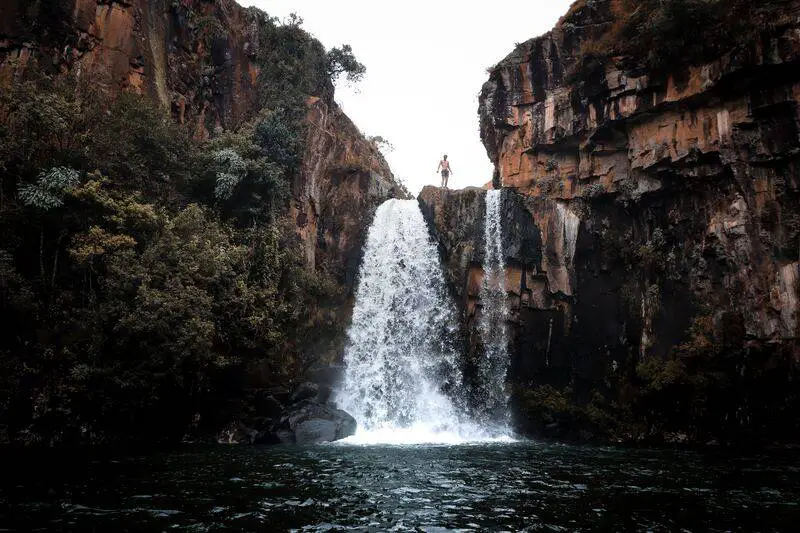
ELECTRICITY SUPPLY
Power Adaptor
The South African electricity supply is 220/230 volts with sockets accepting either two-pin or three-pin rounded plugs. Hotels often have 110 volt sockets for electric razors and a USB socket for other electronic items.
A travel (power plug) adaptor will be needed for the South African round 3-pin plug.
TIPPING ETIQUETTE IN SOUTH AFRICA
Whilst tipping is certainly not obligatory, the amount of the gratuity should express the degree of satisfaction that you have obtained. Tipping 10 – 15% of the service fee is common practice (e.g. restaurant bills, taxi fares etc.)
The above are merely guidelines and you should be comfortable with the gratuity you give. On safari it is customary to tip your guide and tracker, and this is variable based on the length of your stay, group size, experience, service, etc.
Remember, even a little (a couple rands) goes a long way.
CAN YOU DRINK THE WATER
Testing and treatment of the tap water is up to general standards and as a result it is perfectly safe and good to drink straight from the tap.
Remember to bring a reusable water bottle and fill it up throughout the day.
You don’t have to worry about buying bottles of water while travelling in South Africa. Bottled water can be used as an individual preference or when in areas where the mineral content is higher than normal. This could happen, for example, when staying at a safari lodge, but the accommodation will be able to advice in this regard. These remote locations when on game drives often have a water filtration system in place to make the water drinkable.
Water shortages: There have been water restrictions throughout the country in recent years and there were real fears that Cape Town would run out of water in 2018. The situation has drastically improved since, but even if water seems plentiful, please don’t waste it.
GETTING AROUND SOUTH AFRICA
Public transport is certainly not up to standard and there isn’t much of a system in place.
However, travelling around South Africa is possible by air, road, and rail.
It is recommended to use Uber or Bolt for shorter trips and to get around in the major cities. This service is convenient, practical, and cheaper than metered taxis. Background checks are done on the drivers to make sure their driver’s licenses are real.
There is also the Gautrain rapid transit railway system in Gauteng Province which links Johannesburg, Pretoria, Ekhuruleni and OR Tambo International Airport.
Another means of getting around South Africa are luxury inter-city bus services such as Greyhound and Trans-Lux.
DRIVING IN SOUTH AFRICA
Car rentals are legit
Another worthwhile recommendation is to hire a car to get around.
Having a car is the most viable way of seeing the region. It makes it convenient and easy to explore the country, whether it be along the Garden Route, through the Drakensberg mountains, or a self-drive safari in the Kruger National Park.
A couple things to note about driving in South Africa: — Driving is on the left-hand side of the road.
— Keep in mind that the speed limit on major motorways is 120km/h (75mph).
— Do take note in preparation and implementation, that distances take longer to drive than Google Maps suggests.
— A valid international driver’s licence is required.
— Wearing seat belts is compulsory and cellphones can only be used ‘hands free’.
— Most global car hire firms have branches in South Africa
— When renting a car: get full insurance protection, be vigilant of speed drivers, and keep nothing of value in the vehicle (or keep it in the boot, if you must).
— Manual/stick shift drive cars are particularly common in Southern Africa. If you are not comfortable with manual drive, ensure you select an automatic drive car when renting.
FUEL STATIONS: GARAGES
The fuel stations (called garages) are not self-service like in some parts of the world, but are staffed by attendants who will fill up your car for you. Here you will also be asked if you want your windscreen washed, tyre pressure checked, oil and water replenished.
It’s polite and customary to tip the attendant a couple rands for their service. Even a small amount goes a long way and is always appreciated.
Parking attendants
Often, wherever you park, be it outside restaurants, at the beach, supermarket, amongst others, will find young men offering to watch over your car and protect it from break-ins while you’re away, in exchange for some payment (a few rand) on your return.
Some of these car watchers are officially hired by the venue and some are young unemployed guys just trying to earn some money.
STOPPING AT TRAFFIC LIGHTS
Speaking of traffic lights, don’t be surprised to see guys selling all sorts of items at busy intersections. These items range from newspapers to toys, bags, and electronic accessories, among others.
Apart from selling items, you will also find some guys begging, collecting rubbish or handing out flyers. I politely decline if not interested.
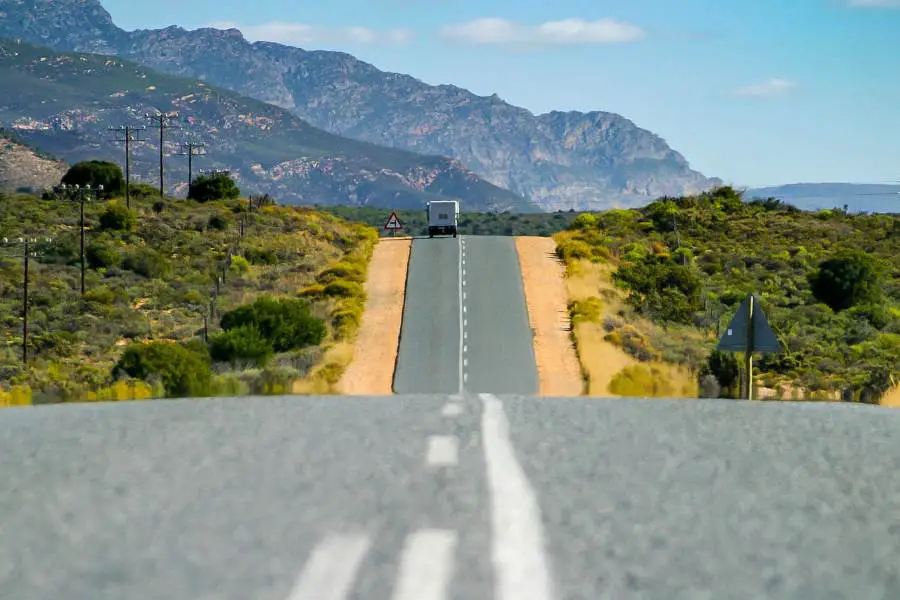
PEOPLE OF SOUTH AFRICA
People are generally friendly , willing to help should the need arise, and excited to share their stories and culture with you.
Don’t let the misconstructions and impressions of the apartheid days make you think otherwise.
Men generally greet each other with a handshake, while women greet with a kiss on the cheek. If you’re not sure, a handshake is a safe bet.
LANGUAGE IN SOUTH AFRICA
There are 11 officially recognised languages , most of which are indigenous to the country.
English is spoken everywhere you go so it is fairly easy to communicate as you go around. English is the language of the cities, of commerce and banking, of government and official documents. All the road signs and official forms are in English and service staff will speak English.
Official languages: Afrikaans, English, Ndebele, Northern Sotho, Sotho, SiSwati, Tsonga, Tswana, Venda, Xhosa, and Zulu!
>> Related reading: Learn how to say hello and thank you in South Africa and around the world here.
LOCAL PHRASES
In South Africa, roundabouts are called circles and traffic lights are referred to as robots! So, don’t be surprised if you’re told to continue past the circle and turn left at the first robot.
Howzit is a common greeting that is used instead of hi or how are you while lekker is an Afrikaans word that is now mainstream, meaning nice, awesome, or good.
SOUTH AFRICA TIME
Time zone: South African Standard Time is Greenwich Mean Time GMT + 2 hours . Central European Winter Time +1 , and Eastern Standard Winter Time +7.
The country does not change its clocks during the year, and there are no regional variations within the country.
Speaking of time, apart from Johannesburg, South Africa operates on a laidback, slow pace. This is the wonderfully slow South African way, as rarely are things on time. Embrace it as you’ll be back home and rushing around before you know it.
Also, locals tend to eat dinner earlier in the evening than the rest of the world average. On the same note, attractions tend to close earlier than the rest of the world average. Take note of this when planning.
WHAT IS THE FOOD LIKE IN SOUTH AFRICA
A trip to South Africa is guaranteed to encompass good food as the country boasts an amazing variety of restaurants from fine dining to casual eateries.
The vast number of supermarkets are also stocked with a wide range of produce, making self-catering simple.
>>Related reading: Crazy weird foods around the world (including mopani worms in South Africa) Full details HERE
The ever popular braai
The country is big on meat . “Braais” the Afrikaans word for grilled meat, comparable to a BBQ, is insanely popular all over. Any social gathering is bound to have a braai going on.
Confession: I am not a fan of the braai, in the least. I know, what kind of local am I?
Other popular dishes to try include chakalaka, potjiekos, malva pudding , bobotie, mealie pap, bunny chow, melktert, and the ever popular biltong.
At restaurants, waiters do not automatically bring the bill at the end of the meal, but will wait until you ask for it.
Post-meal etiquette
Taking your meal home in a “ doggy bag ” is completely normal.
SMOKING LAWS
In accordance with South African law, do note that smoking is prohibited in public areas and buildings, unless they are specifically designated as smoking areas.
SAFARI IN SOUTH AFRICA
There is a plethora of game reserves where you have the potential of seeing some incredible wildlife, including the big 5, in their natural habitat. If you’ve been about seeing animals in the wild, South Africa is your calling.
It can be dry and very dusty on game drives through the reserves. Be sure to take a scarf and sunglasses along, as this will come in handy. It is also recommended to bring your own pair of binoculars along.
National Park fees
Each of the SANS national parks are individually gated, even when within a brief distance of each other. This means an entry fee needs to be paid for each park .
The non-residential fee is often three times the rate for locals.
Watch out for baboons
In the national parks and some rural regions, there is a real hazard of baboons going through your belongings should they smell food.
Ocean currents
You won’t be able to spend a whole lot of time in the waters along the West coast, as these tend to be icy cold from the Benguela current. On the other hand, waters on the East coast are perfectly suited for swimming.
DO BRING MORE MEMORY
You may just need more memory cards than initially anticipated for all the moments that you will want to capture while traveling South Africa.
IT MAY BE ADDICTIVE 😉
Yes, many travellers often return to South Africa after that initial experience. You might just become one of them.
>> Get hyped for your trip to SA with this: List of best songs about Africa .
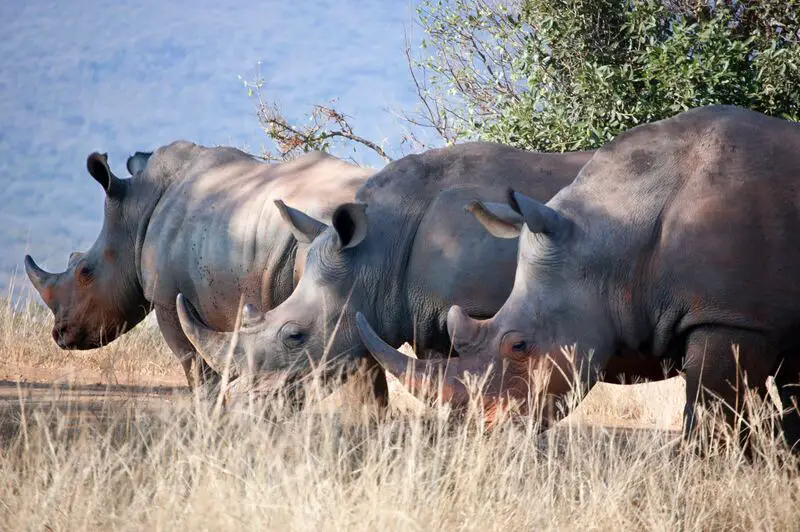
Keep these tips for traveling South Africa in mind and have a good trip. As always, do not hesitate to contact me should you require additional information about any upcoming travels, here or on Instagram . Be sure to check out this list of the best places to visit in South Africa for first timers
>> Read Next:
- 20 reasons to visit South Africa
- The best countries to visit in Africa
- The 15 most beautiful countries in Africa to visit
- 200 quotes about Africa to inspire
- What is responsible tourism + simple ways to implement
Have you been to South Africa? What else would you like to know before you go? Let me know in the comments below!
Hamba Kahle,
Save this for later. PIN it to your Africa Travel Board!
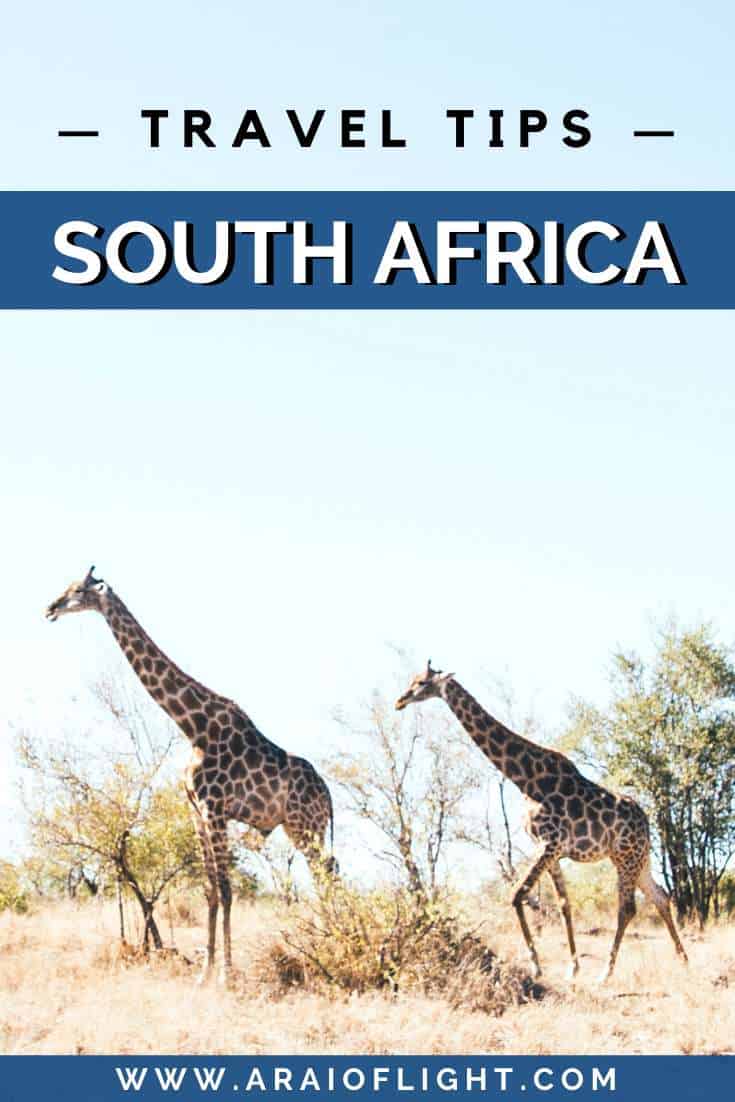
Tags: adventure africa First time south africa Travel Tips
You may also like...
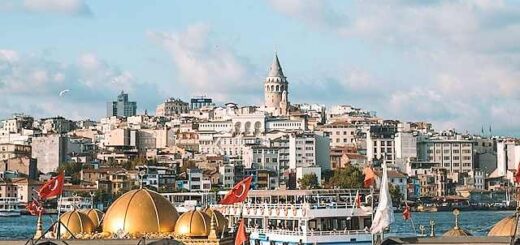
The BEST Kebab in Istanbul: 15 Restaurants to Find the Best One!
April 3, 2024
by Raihaan · Published April 3, 2024
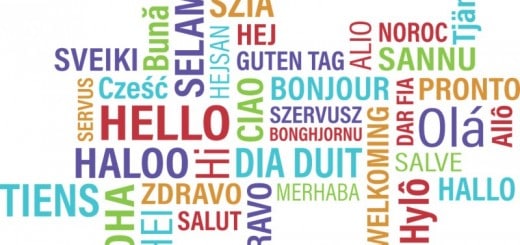
200+ Ways To Say HELLO in Different Languages! (With Pronunciation)
January 27, 2024
by Raihaan · Published January 27, 2024
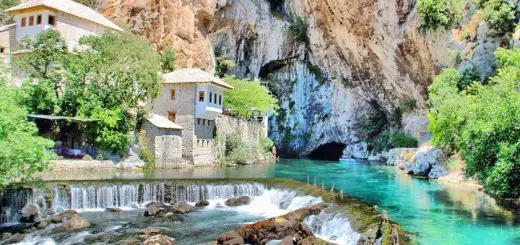
Travel Guide to Blagaj Buna: Bosnia and Herzegovina
January 14, 2021
by Raihaan · Published January 14, 2021 · Last modified September 1, 2021
3 Responses
- Pingbacks 1
really helpful article.. thank you for sharing
Good to hear – you’re welcome
[…] Related: 30 tips for first-time travellers to South Africa […]
Leave a Reply Cancel reply
Your email address will not be published. Required fields are marked *
- Next story Your [PERFECT] One Day in Bratislava Itinerary: Things To Do
- Previous story 150 [BEST] Trivia Questions for Road Trips and Car Rides
WHO IS ARAIOFLIGHT ✈
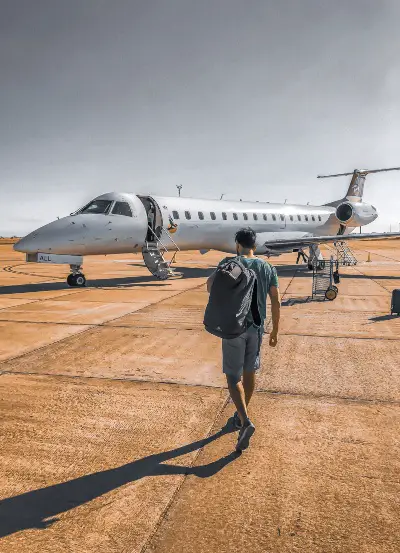
Welcome to A Rai of Light!
A home for extraordinary people around the world. If you've ever felt like there must be more to life, this site is for you.
Out of a love for travel, writing, photography, sharing stories and a desire to inspire others , I created this space to connect with other like-minded individuals.
Along the way, I share my journey and strategies on Travel , Art and Life . Enjoy!
DISCOVER MORE: POPULAR ✈
- Recent Posts
- Popular Posts

USA BUCKET LIST | World Travelers Reveal The Best 100 Places To Visit in USA
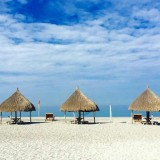
Where To Stay in Zambales: BEST Beach Resorts

10 Most Beautiful Spanish Islands To Visit [2024]

My Stay at the Hyatt Centric Juhu Mumbai: Hotel Review

ᐅ LAUGH OUT LOUD with these Funny Travel Quotes

10 of the Best Tropical Islands to Visit Around the World (that won’t break the bank)

15 Romantic Getaways in the Midwest USA

Ranked: 15 Most Beautiful Flags in the World in 2024
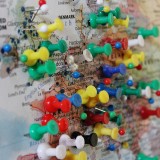
List: Which Countries Can You Visit on a Schengen Visa in 2024

WEIRD Food around the world | 35 World Travelers reveal the strangest food they’ve ever eaten

First Trip to Egypt? My Ultimate Guide of Insider Tips To Know BEFORE You Go
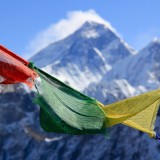
Epic List: The Best Short Treks in Nepal!

Flying Tips: 13 Things NOT To Do on an Airplane
FOLLOW THE ADVENTURE ✈
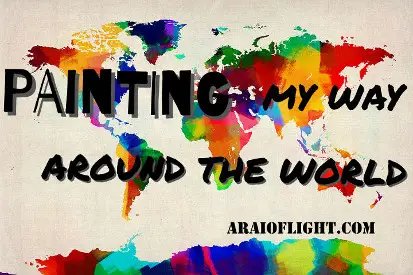
- Travel Website
- Travel trade website
- Business events website
- Corporate & media website
- Welcome to South Africa
- What you need to know
- Things to do
- Places to go
- Get in touch
Choose your country and language:
- South Africa
Asia Pacific
- South Korea
- Netherlands
- United Kingdom
By creating an account, I agree to the Terms of service and Privacy policy
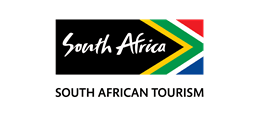
S outh Africa is a country like no other. It is the ideal destination for those seeking a unique sensory/spiritual reawakening, a place that leaves its visitors feeling inspired, enriched and rejuvenated.
South Africa gives travellers the opportunity to reconnect with real life
South Africa offers a diversity of options to suit every traveller that will excite and revive you, that will suit your pocket, that will answer your every need and desire.
South Africa is a welcoming, friendly and fun destination, with people known for warmth, hospitality and authenticity.
So... Come to South Africa
Take in everything we have to offer
Escape the mundane and truly Live Again!
to tell new stories
Wildlife safari.
When you've seen a pride of lions resting in the shade in summer or a herd of elephant crossing the road on their way to the watering hole, it’s an incredible reminder of why the untouched wild has always been so inspiring. Explore it!
Vibrant culture
With Ndebele, Zulu, Xhosa, Sotho, Swazi, Venda, Afrikaans, Cape Malay, Cape Coloured, Khoisan and European cultures all calling this land home, South Africa is certainly a melting pot of diverse cultural depth worth exploring!
Active adventure
Fancy taking a dip with a great white shark? Or hiking up a mountain? What about plunging off the world’s highest commercial bridge bungee? Whatever gets your heart racing, South Africa’s got it!
Breathtaking scenery
Endless horizons, deep valleys, soaring mountains, cliff sides overlooking endless oceans – a journey through South Africa will take your breath away and leave you with memories that will last forever.
Sun-soaked coasts
Teeming with marine life and some of the best surfing the world has to offer and an abundance of blue-flag beaches, South Africa’s sun-soaked coast lies ready all-year round to share its secrets, adventures and lazy days with you.
Bustling city life
From the calm serenity of sundowners at the beach in Cape Town to the boundless energy of a nightclub in Johannesburg, South Africa’s cities buzz with the soul of a nation. Feel the rhythm of South Africa in an urban safari and let the beat of the concrete jungle flow through you.
World-class infrastructure
Whether you’re hitching a ride via plane, train, bus or car, with world-class infrastructure, it’s easy to get to your next South African adventure.
World heritage sites
South Africa has eight UNESCO World Heritage Sites, areas that have been given special international status for their unique qualities. If you are interested in culture and South African history, then you may well want to consider visiting one of these sites.
Exceptional value
You won’t need to put yourself out of pocket for your South African adventure. With options available for every budget, South Africa offers exceptional value for your hard earned money.
Something for everyone, everywhere
Whether you’re in it for wildlife, adventure, lifestyle, culture or scenery – there are always multiple experiences for every type of traveller around the corner no matter which part of the country you’re in. That’s the beauty of it!
What would you like to experience?
A journey through South Africa will take your breath away and leave you with memories that will last forever.
Feel the rhythm of South Africa in an urban safari and let the beat of the concrete jungle flow through you.
With numerous cultures calling this land home, South Africa is certainly a vibrant melting pot worth exploring!
Whatever gets your heart racing, South Africa’s got it!
An incredible reminder of why the untouched wild has always been so inspiring.
South Africa’s sun-soaked coast lies ready all-year round to share its secrets, adventures and lazy days with you.
South Africa on social media
The BMW International Open has made us excited for the BMW Golf Cup World Final to be hosted in SA. We caught up wi… https://t.co/XiU3waBo1T
Always a pleasure partnering with local businesses to promote SA on the global stage. Warren Weitsz, Co-Founder of… https://t.co/YRxoX6Jdtx
To say the players are bringing their A-game is an under statement! Round 2 has given us many unforgettable moments… https://t.co/4bBdAuXMUL
"...Patrons have been keen and interested in engaging on where the best fairways in SA are. Paired with some of our… https://t.co/tIoXM2uUrh
Our stand at the BMW International Open has been drawing a lot of attention – and rightfully so! “We are proud and… https://t.co/ulYSTje4CB
Clear skies, rolling greens, supportive crowds – the conditions couldn’t be better for a day at Golfclub München Ei… https://t.co/3TMmUxsN0m
What happens when an amateur and pro hit the fairway together? Find out in the Pro-Am Tournament, where 3 amateurs… https://t.co/hkvHUw0H0E
Ready to get into the swing of things? The Pro-Am Tournament of the 2023 BMW International Open starts today in Mün… https://t.co/WqLU7FshdH
South Africa has many exquisite golf courses. As we gear up for The BMW International Open in Germany, we hope to s… https://t.co/vTFwgOa78W
South African Tourism will be showcasing our beautiful country's offerings in Germany! We have so much to offer glo… https://t.co/O1m4yVy491
#DidYouKnow South Africa has produced some of the top golfers in the world. As we gear up for the BMW International… https://t.co/E1GsW6z1Fy
#DidYouKnow ? #VisitSouthAfrica ❤️🇿🇦 https://t.co/Y4zWjb8xIz
RT @Roberto_EUBXL: Amazing #YouthDay2023 long weekend in @MidlandsMeander ! Another 💎 of multifaceted #SouthAfrica : touches of 🇬🇧 🇧🇪 🇱🇺 co…
What does golf, South Africa, BMW and Germany have in common? The 34th staging of the BMW International Open in Ger… https://t.co/YdvuWOjs8O
Golf was first played in South Africa in 1885, in Cape Town. Now we are taking our love of golf to the world, as we… https://t.co/dXc5uIyGxI
RT @PublicSectorMan: Today marks 47 years since the youth uprising of 16 June 1976. Deputy President Paul Mashatile will lead the commemor…
We look forward to showcasing South Africa’s abundant tourism offerings to a global audience while reminding them a… https://t.co/yVz97hDGaa
A dynamic collaboration between SA Tourism and the iconic BMW Group is set to supercharge the country’s efforts tow… https://t.co/JhLDwHlLix
50 days until the kick-off – or shall we say the tip-off – of the Vitality #NWC2023 in SA! Excitement levels are at… https://t.co/Ni2fHwh2NJ
#VisitSouthAfrica ❤️🇿🇦 https://t.co/ApcA6wNNop

- Useful links
- Travel partners
- Business events
- Travel trade
- Accommodation
- Useful contacts
- Visa & entry info
- Digital Assets Library
- Image Library

- Skip to main content
- Skip to "About this site"
Language selection
Search travel.gc.ca.
Help us to improve our website. Take our survey !
COVID-19: travel health notice for all travellers
South Africa travel advice
Latest updates: Editorial change
Last updated: August 7, 2024 15:04 ET
On this page
Safety and security, entry and exit requirements, laws and culture, natural disasters and climate, south africa - exercise a high degree of caution.
Exercise a high degree of caution in South Africa due to the significant level of serious crime.
Back to top
Nationwide power shortages or rolling blackouts, referred to as load shedding, are still occurring regularly. They are occurring numerous times a day and for multiple-hour stretches. They are expected to continue through 2023 and into 2024.
Though the potential for a nationwide blackout is low, the associated risks are high, including a nationwide loss of power for days or weeks.
South Africa has already experienced blackouts for up to 12 hours in a 24 hour period. Increased demand for power during the coldest winter months of June and July means that blackouts could last longer. Expect a dark and cold winter.
An official schedule of the planned blackouts provides advance notice of the shortages. However, they can also occur with very little notice.
Blackouts could increase the risk of criminal activity in affected areas, which could in turn lead to opportunistic theft and prolonged outages.
Blackouts can affect the following services and businesses:
- telecommunications and security systems
- stores and food supply
- hotels and other accommodations
- banks and ATMs
- gas stations
- public lighting and traffic lights
Interruptions to water supply occur occasionally and can be lengthy in some areas, causing considerable inconvenience.
If you’re in South Africa:
- be prepared for extended power outages
- make sure you always have a complete emergency kit on hand, including several flashlights
- always carry a cell phone, power banks, chargers and a list of emergency numbers handy
- keep a sufficient supply of water, food, medication and fuel on hand for several days
- keep your travel documents up-to-date
- monitor local media
- follow the instructions of local authorities
Useful links
- List of planned blackouts - Eskom, South African electricity public utility
- Get Prepared - basic emergency kit
Violent crime
South Africa has a very high level of crime. Crime is the primary security threat to travellers.
Violent crimes, including rape and murder, occur frequently and have involved foreigners.
Muggings, armed assaults and theft are also frequent, often occurring in areas that are popular among tourists. Carjackings, robbery and assault also occur.
Armed robberies at shopping malls occur. To minimize the risk of personal assault if confronted by an armed individual:
- immediately comply
- avoid making sudden movements
- avoid resisting or antagonizing the assailants
- avoid eye contact with your assailant
Crime significantly increases after dark in major city centres and townships. After dark, avoid the areas of:
- Hillbrow and Yeoville in Johannesburg
- Sunnyside in Pretoria
- the beachfront and Victoria wharf in Durban
- Cape Town downtown hotels to the waterfront
Crimes of opportunity
There is a high risk of pickpocketing. You should not carry your wallet in your back pocket.
Do not show signs of affluence, display money or carry valuables such as laptop computers or cameras.
When at restaurants or bars, do not leave your bag under your chair or table or hung over the back of a chair; keep it on your lap.
Ensure that all your bags’ zippers, straps and fasteners are closed and secure, and be aware of people behind and around you.
Criminals are known to target people who appear distracted and are not paying attention to their immediate surroundings.
If you believe that you are being followed, go directly to a police station.
Crime in and around airports
Passengers have been followed upon arrival at airports and then robbed either on their way to or once they arrived at their final destination. There are also reports of theft from checked luggage.
Some areas around Cape Town International Airport are less secure. There are reports of an increased risk of attack on secondary roads near the airport.
When travelling to and from an airport:
- stay on highways and main roads
- avoid shortcuts
- if you are using a GPS, make sure that the itinerary avoid townships and secondary roads
- plan your trip in advance and verify your travel itinerary with a trusted local source
- consider arranging an airport transfer
On the road
Be vigilant at vulnerable points such as:
- traffic lights
- yield signs
- highway off-ramps
Smash and grab incidents are frequent. This is when car windows are broken and valuables such as handbags are taken while cars are waiting at junctions.
- Park in well-lit areas
- Do not pick up strangers
- Ensure that vehicle doors are locked and windows are closed at all times
Hotel theft
Theft from hotel rooms and guest houses is common. Never leave your windows or doors open or unlocked, even when you are present.
- Check the level of security at guest houses, hotels, lodges, backpacker lodges or any accommodation before making bookings
- Don’t leave luggage and valuables unattended; place them in safekeeping facilities
- Don’t open the door to anyone without taking necessary precautions. If someone claims to be a member of staff, verify with the reception prior to opening the door
Police officer impersonation
Criminals may pose as police officers to extort or rob tourists. There are reports that criminals use fake IDs and flashing blue lights to stop cars with the intent to rob the passengers or steal the vehicle.
If you face this situation:
- do not stop your vehicle
- put on your hazard lights and continue to the nearest police station or secure location
There is a threat of kidnapping across South Africa. Foreign nationals have been kidnapped in the past. Kidnappings are generally for financial gain or motivated by criminality.
Scammers could kidnap you to extort money from your loved ones in exchange for your release.
- Be wary of online romance, employment and money scams
- Never accept an invitation to travel to an unfamiliar location
- If you think you've been scammed, do not travel overseas to get your money back
Demonstrations
Demonstrations can occur anywhere across the country and sometimes on short notice. Even peaceful demonstrations can turn violent at any time. They can also lead to disruptions to traffic and public transportation.
- Avoid areas where demonstrations and large gatherings are taking place
- Follow the instructions of local authorities
- Monitor local media for information on ongoing demonstrations
Mass gatherings (large-scale events)
Cases of attempted fraud are frequently reported in South Africa. Do not give personal or financial account information to anyone.
Don’t attempt to use ATMs that appear damaged or defective, or are in isolated or poorly lit areas. Don’t accept any offer of assistance with your transaction. If suspicious at any time, cancel your transaction and use another ATM.
- Pay careful attention when your cards are being handled by others
- Use ATMs located in well-lit public areas or inside a bank or business
- Avoid using card readers with an irregular or unusual feature
- Cover the keypad with one hand when entering your PIN
- Check for any unauthorized transactions on your account statements
Overseas fraud
Reserves and hiking trails
There have been attacks on hikers and tourists at reserves, hiking trails, including Table Mountain, Lions’ Head, Signal Hill and other tourist attractions and their parking lots.
Avoid the Numbi Gate entrance to the Kruger National Park, as well as the R538 road leading to it due to an increase in criminal activity in the area, including the murder of a foreign national in October 2022.
- Hike in groups and take all appropriate precautions
- Avoid isolated picnic areas and beaches
- Don’t stop at deserted roadside resting places on national roads
Spiked food and drink
There have been incidents of food or drink being drugged and tourists robbed when unconscious.
Never leave food or drinks unattended or in the care of strangers. Be wary of accepting snacks, beverages, gum or cigarettes from new acquaintances. These items may contain drugs that could put you at risk of sexual assault and robbery.
There is a threat of terrorism. Terrorist attacks could occur at any time. Individuals who may be inspired by terrorist groups may carry out “lone actor” attacks targeting public places, including where foreigners gather.
Targets could include:
- government buildings, including schools
- places of worship
- airports and other transportation hubs and networks
- public areas such as tourist attractions, restaurants, bars, coffee shops, shopping centres, markets, hotels and other sites frequented by foreigners
South African authorities have successfully disrupted planned attacks and made arrests related to terrorism offences. Always be aware of your surroundings when in public places.
Regional unrest
Xenophobic attacks, primarily targeting refugees or immigrants from other African nations, related demonstrations, looting and outbreaks of violence occur. This type of unrest could occur in any region of the country and with little warning.
Avoid large gatherings and demonstrations, monitor local media and follow the instructions of local authorities at all times.
Townships and rural areas
Avoid townships and informal settlements if you are unfamiliar with them, except when travelling with organized tours provided by a reputable company or in association with an experienced local organization.
Wildlife viewing
Wildlife viewing poses risks, particularly on foot or at close range. Be aware of the threat of monkeys and baboons overwhelming sightseers in their search for food. They are known to get very aggressive.
- Always maintain a safe distance when observing wildlife
- Only exit a vehicle when a professional guide or warden says it’s safe to do so
- Only use reputable and professional guides or tour operators
- Closely follow park regulations and wardens’ advice
Water activities
Coastal waters have unpredictable wave and currents patterns, which can be dangerous. Shark attacks have been reported in several areas, including in KwaZulu-Natal and Western Cape.
- Follow the advice and warnings of local authorities
- Be cautious when swimming in lakes and rivers because of the risk posed by wildlife
Water safety abroad

Telecommunications
Cellular phone reception is generally good in major towns and cities but can be intermittent in rural areas. Extended periods of rolling blackouts are impacting internet connectivity and cell phone networks.
Always carry a cellular phone in the event of an emergency. If using your own phone, ensure that it has international/roaming capability for use while in South Africa.
Road safety
Fatal road accidents are common in South Africa. Accidents occur especially in wet conditions, as roads can be very slippery. Traffic lights are frequently out of order. GPS navigation systems may suggest the most direct route but not the safest.
- Observe the recommended following distances
- Avoid undertaking overland travel after dark
- Treat all intersections with malfunctioning traffic lights as a four-way stop
- Verify your travel itinerary with a trusted local source, such as your hotel, your travel agent or local police, before driving
Road conditions
Driving can be dangerous due to:
- insufficient lighting
- pedestrians crossing major highways
- wild animals and stray livestock on the road
Driving habits
Drivers do not always respect traffic laws, especially at night. Drivers often drive at excess speed and ignore traffic signs. Drinking and driving is common.
Drivers are often aggressive toward pedestrians and fail to yield the right of way even on marked crosswalks.
Travel on foot is inadvisable in most areas. If walking is unavoidable, use only brightly lit, busy streets in popular tourist areas and maintain awareness of your surroundings.
If you choose to drive in South Africa:
- always drive defensively
- plan your trip in advance, especially if you are visiting a rural area
- avoid travelling after dark
- choose a vehicle with a robust central locking system, lockable fuel tank cap and vehicle alarm
- use a reliable rental company offering 24-hour emergency service and ensure that you have the contact details for the service
Public transportation
Avoid using public transportation.
Tourists have been mugged and assaulted in and around bus stations. Avoid the central bus station in Johannesburg.
Train services are slow and several serious accidents in recent years have raised concerns over safety standards.
Violent attacks have occurred on commuter and metro trains between Johannesburg and Pretoria, as well as on commuter trains in Cape Town. Don’t travel by train, especially second or third class.
The Gautrain between O.R. Tambo International Airport in Johannesburg and Pretoria, as well as the Blue Train and Rovos Rail, are, however, safe for tourists.
Taxis cannot be hailed in the street. Ask your hotel to arrange a taxi and ensure that you prearrange transport for your return journey.
Sit in the rear of the vehicle and keep windows up and doors locked at all times. Keep valuables out of sight and place bags by your feet. Negotiate the fare with the driver in advance. Avoid using minibuses and unlicensed taxis.
We do not make assessments on the compliance of foreign domestic airlines with international safety standards.
Information about foreign domestic airlines
Every country or territory decides who can enter or exit through its borders. The Government of Canada cannot intervene on your behalf if you do not meet your destination’s entry or exit requirements.
We have obtained the information on this page from South African authorities. It can, however, change at any time.
Verify this information with the Foreign Representatives in Canada .
Entry requirements vary depending on the type of passport you use for travel.
Before you travel, check with your transportation company about passport requirements. Its rules on passport validity may be more stringent than the country’s entry rules.
Regular Canadian passport
You may also be denied boarding at the point of departure if you don’t have enough blank pages for the visa. If you plan to visit neighbouring countries and return to South Africa, ensure that there are sufficient visa pages in your passport for those countries’ visas and those of South Africa.
Passport for official travel
Different entry rules may apply.
Official travel
Passport with “X” gender identifier
While the Government of Canada issues passports with an “X” gender identifier, it cannot guarantee your entry or transit through other countries. You might face entry restrictions in countries that do not recognize the “X” gender identifier. Before you leave, check with the closest foreign representative for your destination.
Other travel documents
Different entry rules may apply when travelling with a temporary passport or an emergency travel document. Before you leave, check with the closest foreign representative for your destination.
- Foreign Representatives in Canada
- Canadian passports
Tourist visa: not required for stays up to 90 days Business visa: not required for stays up to 90 days Student permit: required Employment permit: required
Canadians don't need a tourist visa to enter South Africa. However, upon arrival, immigration officials will issue a temporary residents visa (TRV) for up to 90 days. Check the expiry date of your TRV to ensure you don’t overstay.
If you overstay without authority, you may be forced to pay a fine upon departure and/or can be refused entry for up to 5 years.
Serious offenders may be arrested before departure and detained until their court appearance. In such cases, visitors may face a very substantial fine and be deported at their own expense.
South African visas - South African Department of Home Affairs
Changing or extending your visa
Some foreigners travelling to South Africa have not gone through the correct channels to obtain, change or extend their relevant visas. This has resulted in arrest and detention due to fraudulently issued visas.
While in South Africa, you must go through regional or district offices of the South African Department of Home Affairs for information on visa requirements and issuance.
Regional travel
If you leave and re-enter South Africa, even for a short time, you will not automatically be given an additional 90-day visitor’s visa. An immigration official can deny you re-entry into South Africa. The immigration officer can also allow you to enter for a limited time only.
If you wish to extend your stay, contact the South African Department of Home Affairs 60 days before your visitor’s visa expires.
South African Department of Home Affairs contact information
Work or study
If you intend to work or study in South Africa, you must apply for the relevant visas prior to your arrival; otherwise, you risk being refused entry and may be returned to your point of origin. You cannot change the type of visa once in South Africa.
Other entry requirements
You must be in possession of a return or an onward ticket. Without one, you may be required to deposit the equivalent of a fare home with customs. The money will be refunded after departure from South Africa.
Residence permit
If you reside in South Africa, you must have valid residence permit in your passport each time you enter and leave the country.
Dual citizenship
Dual citizens must enter or depart South Africa using their South African passport only.
For further information on dual citizenship, contact the High Commission for the Republic of South Africa in Ottawa.
- Children and travel
Minors traveling to and from South Africa must have a valid passport and may be subject to additional requirements.
You must produce a long form birth certificate when travelling with children under the age of 18 to neighbouring countries. The long form birth certificate must be in English or translated into English.
Contact the nearest South African mission abroad or visit the South African Department of Home Affairs website, before travelling, to verify the latest requirements.
- Entry regulations when travelling with children - South African Department of Home Affairs
- Travelling with children
Yellow fever
Learn about potential entry requirements related to yellow fever (vaccines section).
Relevant Travel Health Notices
- Global Measles Notice - 13 March, 2024
- COVID-19 and International Travel - 13 March, 2024
This section contains information on possible health risks and restrictions regularly found or ongoing in the destination. Follow this advice to lower your risk of becoming ill while travelling. Not all risks are listed below.
Consult a health care professional or visit a travel health clinic preferably 6 weeks before you travel to get personalized health advice and recommendations.
Routine vaccines
Be sure that your routine vaccinations , as per your province or territory , are up-to-date before travelling, regardless of your destination.
Some of these vaccinations include measles-mumps-rubella (MMR), diphtheria, tetanus, pertussis, polio, varicella (chickenpox), influenza and others.
Pre-travel vaccines and medications
You may be at risk for preventable diseases while travelling in this destination. Talk to a travel health professional about which medications or vaccines may be right for you, based on your destination and itinerary.
Yellow fever is a disease caused by a flavivirus from the bite of an infected mosquito.
Travellers get vaccinated either because it is required to enter a country or because it is recommended for their protection.
- There is no risk of yellow fever in this country.
Country Entry Requirement*
- Proof of vaccination is required if you are coming from or have transited through an airport of a country where yellow fever occurs.
Recommendation
- Vaccination is not recommended.
- Discuss travel plans, activities, and destinations with a health care professional.
- Contact a designated Yellow Fever Vaccination Centre well in advance of your trip to arrange for vaccination.
About Yellow Fever
Yellow Fever Vaccination Centres in Canada * It is important to note that country entry requirements may not reflect your risk of yellow fever at your destination. It is recommended that you contact the nearest diplomatic or consular office of the destination(s) you will be visiting to verify any additional entry requirements.
There is a risk of hepatitis A in this destination. It is a disease of the liver. People can get hepatitis A if they ingest contaminated food or water, eat foods prepared by an infectious person, or if they have close physical contact (such as oral-anal sex) with an infectious person, although casual contact among people does not spread the virus.
Practise safe food and water precautions and wash your hands often. Vaccination is recommended for all travellers to areas where hepatitis A is present.
Measles is a highly contagious viral disease. It can spread quickly from person to person by direct contact and through droplets in the air.
Anyone who is not protected against measles is at risk of being infected with it when travelling internationally.
Regardless of where you are going, talk to a health care professional before travelling to make sure you are fully protected against measles.
Hepatitis B is a risk in every destination. It is a viral liver disease that is easily transmitted from one person to another through exposure to blood and body fluids containing the hepatitis B virus. Travellers who may be exposed to blood or other bodily fluids (e.g., through sexual contact, medical treatment, sharing needles, tattooing, acupuncture or occupational exposure) are at higher risk of getting hepatitis B.
Hepatitis B vaccination is recommended for all travellers. Prevent hepatitis B infection by practicing safe sex, only using new and sterile drug equipment, and only getting tattoos and piercings in settings that follow public health regulations and standards.
Coronavirus disease (COVID-19) is an infectious viral disease. It can spread from person to person by direct contact and through droplets in the air.
It is recommended that all eligible travellers complete a COVID-19 vaccine series along with any additional recommended doses in Canada before travelling. Evidence shows that vaccines are very effective at preventing severe illness, hospitalization and death from COVID-19. While vaccination provides better protection against serious illness, you may still be at risk of infection from the virus that causes COVID-19. Anyone who has not completed a vaccine series is at increased risk of being infected with the virus that causes COVID-19 and is at greater risk for severe disease when travelling internationally.
Before travelling, verify your destination’s COVID-19 vaccination entry/exit requirements. Regardless of where you are going, talk to a health care professional before travelling to make sure you are adequately protected against COVID-19.
The best way to protect yourself from seasonal influenza (flu) is to get vaccinated every year. Get the flu shot at least 2 weeks before travelling.
The flu occurs worldwide.
- In the Northern Hemisphere, the flu season usually runs from November to April.
- In the Southern Hemisphere, the flu season usually runs between April and October.
- In the tropics, there is flu activity year round.
The flu vaccine available in one hemisphere may only offer partial protection against the flu in the other hemisphere.
The flu virus spreads from person to person when they cough or sneeze or by touching objects and surfaces that have been contaminated with the virus. Clean your hands often and wear a mask if you have a fever or respiratory symptoms.
Malaria is a serious and sometimes fatal disease that is caused by parasites spread through the bites of mosquitoes. There is a risk of malaria in certain areas and/or during a certain time of year in this destination.
Antimalarial medication may be recommended depending on your itinerary and the time of year you are travelling. Consult a health care professional or visit a travel health clinic before travelling to discuss your options. It is recommended to do this 6 weeks before travel, however, it is still a good idea any time before leaving. Protect yourself from mosquito bites at all times: • Cover your skin and use an approved insect repellent on uncovered skin. • Exclude mosquitoes from your living area with screening and/or closed, well-sealed doors and windows. • Use insecticide-treated bed nets if mosquitoes cannot be excluded from your living area. • Wear permethrin-treated clothing. If you develop symptoms similar to malaria when you are travelling or up to a year after you return home, see a health care professional immediately. Tell them where you have been travelling or living.
In this destination, rabies is commonly carried by dogs and some wildlife, including bats. Rabies is a deadly disease that spreads to humans primarily through bites or scratches from an infected animal. While travelling, take precautions , including keeping your distance from animals (including free-roaming dogs), and closely supervising children.
If you are bitten or scratched by a dog or other animal while travelling, immediately wash the wound with soap and clean water and see a health care professional. In this destination, rabies treatment may be limited or may not be available, therefore you may need to return to Canada for treatment.
Before travel, discuss rabies vaccination with a health care professional. It may be recommended for travellers who are at high risk of exposure (e.g., occupational risk such as veterinarians and wildlife workers, children, adventure travellers and spelunkers, and others in close contact with animals).
Safe food and water precautions
Many illnesses can be caused by eating food or drinking beverages contaminated by bacteria, parasites, toxins, or viruses, or by swimming or bathing in contaminated water.
- Learn more about food and water precautions to take to avoid getting sick by visiting our eat and drink safely abroad page. Remember: Boil it, cook it, peel it, or leave it!
- Avoid getting water into your eyes, mouth or nose when swimming or participating in activities in freshwater (streams, canals, lakes), particularly after flooding or heavy rain. Water may look clean but could still be polluted or contaminated.
- Avoid inhaling or swallowing water while bathing, showering, or swimming in pools or hot tubs.
Travellers' diarrhea is the most common illness affecting travellers. It is spread from eating or drinking contaminated food or water.
Risk of developing travellers' diarrhea increases when travelling in regions with poor standards of hygiene and sanitation. Practise safe food and water precautions.
The most important treatment for travellers' diarrhea is rehydration (drinking lots of fluids). Carry oral rehydration salts when travelling.
Typhoid is a bacterial infection spread by contaminated food or water. Risk is higher among children, travellers going to rural areas, travellers visiting friends and relatives or those travelling for a long period of time.
Travellers visiting regions with a risk of typhoid, especially those exposed to places with poor sanitation, should speak to a health care professional about vaccination.
There is a risk of schistosomiasis in this destination. Schistosomiasis is a parasitic disease caused by tiny worms (blood flukes) which can be found in freshwater (lakes, rivers, ponds, and wetlands). The worms can break the skin, and their eggs can cause stomach pain, diarrhea, flu-like symptoms, or urinary problems. Schistosomiasis mostly affects underdeveloped and r ural communities, particularly agricultural and fishing communities.
Most travellers are at low risk. Travellers should avoid contact with untreated freshwater such as lakes, rivers, and ponds (e.g., swimming, bathing, wading, ingesting). There is no vaccine or medication available to prevent infection.
Insect bite prevention
Many diseases are spread by the bites of infected insects such as mosquitoes, ticks, fleas or flies. When travelling to areas where infected insects may be present:
- Use insect repellent (bug spray) on exposed skin
- Cover up with light-coloured, loose clothes made of tightly woven materials such as nylon or polyester
- Minimize exposure to insects
- Use mosquito netting when sleeping outdoors or in buildings that are not fully enclosed
To learn more about how you can reduce your risk of infection and disease caused by bites, both at home and abroad, visit our insect bite prevention page.
Find out what types of insects are present where you’re travelling, when they’re most active, and the symptoms of the diseases they spread.
There is a risk of chikungunya in this country. The level of risk may vary by:
The virus that causes chikungunya is spread through the bite of an infected mosquito. It can cause fever and pain in the joints. In some cases, the joint pain can be severe and last for months or years.
Protect yourself from mosquito bites at all times.
Learn more:
Insect bite and pest prevention Chikungunya
Crimean-Congo haemorrhagic fever is a viral disease that can cause fever, pain and bleeding under the skin. In some cases, it can be fatal. It spreads to humans through contact with infected animal blood or tissues, or from the bite of an infected tick. Risk is generally low for most travellers. Celebrations which include the slaughtering of animals and contact with their blood and/ or tissues may increase the risk of exposure to the virus.
Protect yourself from tick bites and wear gloves or other protective clothing if you are in contact with the blood and tissues of animals, particularly livestock. There is no vaccine available for Crimean-Congo haemorrhagic fever.
Rift Valley fever is a viral disease that can cause severe flu-like symptoms. In some cases, it can be fatal. It is spread to humans through contact with infected animal blood or tissues, from the bite of an infected mosquito, or eating or drinking unpasteurized dairy. Risk is generally low for most travellers. Protect yourself from insect bites and avoid animals, particularly livestock, and unpasteurized dairy. There is no vaccine available for Rift Valley fever.
Animal precautions
Some infections, such as rabies and influenza, can be shared between humans and animals. Certain types of activities may increase your chance of contact with animals, such as travelling in rural or forested areas, camping, hiking, and visiting wet markets (places where live animals are slaughtered and sold) or caves.
Travellers are cautioned to avoid contact with animals, including dogs, livestock (pigs, cows), monkeys, snakes, rodents, birds, and bats, and to avoid eating undercooked wild game.
Closely supervise children, as they are more likely to come in contact with animals.
Person-to-person infections
Stay home if you’re sick and practise proper cough and sneeze etiquette , which includes coughing or sneezing into a tissue or the bend of your arm, not your hand. Reduce your risk of colds, the flu and other illnesses by:
- washing your hands often
- avoiding or limiting the amount of time spent in closed spaces, crowded places, or at large-scale events (concerts, sporting events, rallies)
- avoiding close physical contact with people who may be showing symptoms of illness
Sexually transmitted infections (STIs) , HIV , and mpox are spread through blood and bodily fluids; use condoms, practise safe sex, and limit your number of sexual partners. Check with your local public health authority pre-travel to determine your eligibility for mpox vaccine.
Tuberculosis is an infection caused by bacteria and usually affects the lungs.
For most travellers the risk of tuberculosis is low.
Travellers who may be at high risk while travelling in regions with risk of tuberculosis should discuss pre- and post-travel options with a health care professional.
High-risk travellers include those visiting or working in prisons, refugee camps, homeless shelters, or hospitals, or travellers visiting friends and relatives.
HIV (Human Immunodeficiency Virus) is a virus that attacks and impairs the immune system, resulting in a chronic, progressive illness known as AIDS (Acquired Immunodeficiency Syndrome).
High risk activities include anything which puts you in contact with blood or body fluids, such as unprotected sex and exposure to unsterilized needles for medications or other substances (for example, steroids and drugs), tattooing, body-piercing or acupuncture.
Medical services and facilities
Medical facilities and supplies are widely available in large cities but can be expensive. Medical facilities are limited in remote areas.
Public and private health facilities require an up-front cash deposit for services, guarantee of payment or confirmation of medical insurance before commencing treatment.
Air evacuation may be the only option when faced with a medical emergency in remote areas.
Decompression chambers are available in many hospitals.
Make sure you get travel insurance that includes coverage for medical evacuation and hospital stays.
Health and safety outside Canada
Keep in Mind...
The decision to travel is the sole responsibility of the traveller. The traveller is also responsible for his or her own personal safety.
Be prepared. Do not expect medical services to be the same as in Canada. Pack a travel health kit , especially if you will be travelling away from major city centres.
You must abide by local laws.
Learn about what you should do and how we can help if you are arrested or detained abroad .
Penalties for using, importing or exporting drugs are severe and may include lengthy imprisonment.
Drugs, alcohol and travel
You may not import or take in-transit any firearm or ammunition without a temporary export and import or in-transit permit issued by the South African Police Service.
Dual citizenship is legally recognized in South Africa.
If you are a Canadian citizen, but also a citizen of South Africa, our ability to offer you consular services may be limited while you're there. You may also be subject to different entry/exit requirements .
Dual citizens
International Child Abduction
The Hague Convention on the Civil Aspects of International Child Abduction is an international treaty. It can help parents with the return of children who have been removed to or retained in certain countries in violation of custody rights. The convention applies between Canada and South Africa.
If your child was wrongfully taken to, or is being held in South Africa, and if the applicable conditions are met, you may apply for the return of your child to the South African court.
If you are in this situation:
- act as quickly as you can
- contact the Central Authority for your province or territory of residence for information on starting an application under The Hague Convention
- consult a lawyer in Canada and in South Africa to explore all the legal options for the return of your child
- report the situation to the nearest Canadian government office abroad or to the Vulnerable Children's Consular Unit at Global Affairs Canada by calling the Emergency Watch and Response Centre
If your child was removed from a country other than Canada, consult a lawyer to determine if The Hague Convention applies.
Be aware that Canadian consular officials cannot interfere in private legal matters or in another country's judicial affairs.
- List of Canadian Central Authorities for the Hague Convention
- International Child Abductions: A guide for affected parents
- The Hague Convention – Hague Conference on Private International Law
- Canadian embassies and consulates by destination
- Request emergency assistance
Traffic drives on the left.
You may use your valid Canadian provincial driver’s licence in South Africa, however, an international driving permit (IDP) is strongly recommended.
It is extremely difficult to obtain car insurance for car rentals or to purchase a car without an IDP. Insurance companies and rental car agencies often require proof of a South African driver’s licence or an IDP to honour an insurance claim, even when such proof was not requested at the time the policy was secured. An IDP must be obtained in Canada before travelling to South Africa, as it cannot be obtained locally.
If your licence is in French, it is advisable to obtain a translation into English and carry it with you.
Foreigners driving a rental car across any border into neighbouring countries must obtain a permit from the Cross-border Road Transport Agency prior to arriving at the border crossing. Failure to do so may lead to arrest and/or a fine.
It is illegal to carry gasoline in portable containers.
- Obtain a permit - Cross-border Road Transport Agency
- International Driving Permit
The currency is the South African rand (ZAR).
Canadian currency can be easily exchanged at major banks and foreign exchange counters. A passport and additional identification is required when undertaking foreign exchange transactions.
Foreigners are permitted to enter South Africa carrying a maximum of ZAR100,000, or US$10,000 or its equivalent in foreign currencies. Customs forms are not required to be completed, but random customs checks are conducted.
Rain Storms
The climate varies from region to region. Storms and flooding can occur throughout the country and at various times of the year. Flash storms can occur in Gauteng and North West provinces from November to April. There are heavy rains along the south coast from June to September and the Western Cape receives heavy rainfall between May and September. Dirt roads can become hazardous during these periods. After heavy rains, do not attempt to cross low-lying river bridges by car or on foot, as there have been fatalities linked to people being washed down river. Keep informed of regional weather forecasts and plan accordingly.
Veld (bush) fires are common during dry seasons. They are very unpredictable and extremely dangerous. They can spread very quickly and travel at speeds of 60 km/h or more, due to high winds. Stay clear of active fires and always verify local conditions with relevant authorities before going on bush walks, particularly during the dry seasons.
The Western Cape Province, including Cape Town, can experience periods of prolonged drought. Local authorities may impose water use restrictions. You could be fined if you do not comply with these restrictions.
Useful links:
- Information on water restrictions – City of Cape Town
- Water restrictions explained –City of Cape Town
Local services
In case of emergency, dial:
- police: 10111 or 10112 from a cellular telephone
- medical assistance: 10177
- firefighters: 10111 or 10112 from a cellular telephone
Consular assistance
South Africa, Lesotho, Madagascar, Mauritius, Namibia
For emergency consular assistance, call the High Commission of Canada in South Africa, in Pretoria, and follow the instructions. At any time, you may also contact the Emergency Watch and Response Centre in Ottawa.
The decision to travel is your choice and you are responsible for your personal safety abroad. We take the safety and security of Canadians abroad very seriously and provide credible and timely information in our Travel Advice to enable you to make well-informed decisions regarding your travel abroad.
The content on this page is provided for information only. While we make every effort to give you correct information, it is provided on an "as is" basis without warranty of any kind, expressed or implied. The Government of Canada does not assume responsibility and will not be liable for any damages in connection to the information provided.
If you need consular assistance while abroad, we will make every effort to help you. However, there may be constraints that will limit the ability of the Government of Canada to provide services.
Learn more about consular services .
Risk Levels
take normal security precautions.
Take similar precautions to those you would take in Canada.
Exercise a high degree of caution
There are certain safety and security concerns or the situation could change quickly. Be very cautious at all times, monitor local media and follow the instructions of local authorities.
IMPORTANT: The two levels below are official Government of Canada Travel Advisories and are issued when the safety and security of Canadians travelling or living in the country or region may be at risk.
Avoid non-essential travel
Your safety and security could be at risk. You should think about your need to travel to this country, territory or region based on family or business requirements, knowledge of or familiarity with the region, and other factors. If you are already there, think about whether you really need to be there. If you do not need to be there, you should think about leaving.
Avoid all travel
You should not travel to this country, territory or region. Your personal safety and security are at great risk. If you are already there, you should think about leaving if it is safe to do so.
- Search Please fill out this field.
- Newsletters
- Destinations
- Africa & Middle East
- South Africa
South Africa Guide: Planning Your Trip
:max_bytes(150000):strip_icc():format(webp)/DSC00412-5b73daf7c9e77c0057ca2198.jpg)
- Best Time to Visit
- Weather & Climate
- Places to Visit
- Driving in South Africa
- Safety in South Africa
- How to Spend 10 Days in South Africa
- Foods to Try in South Africa
- Drinks to Try in South Africa
- Best Restaurants in Johannesburg
- Best Restaurants in Cape Town
- Things to Do in South Africa
- Things to Do With Kids
- Best Beaches
- Best Surfing
- Best Dive Destinations
- Best Golf Resorts
- Kruger National Park
- 48 Hours in Johannesburg
Things to Do
- Apartheid Museum
- Airport Guide
- Table Mountain
- Game Reserves Near Cape Town
South Africa is a country of extremes, where poverty-stricken shanties exist alongside first-world art galleries, entertainment venues, sports arenas, and restaurants . Its magnificent landscapes include snow-dusted mountains and areas of arid semi-desert; whilst its twin coasts support incredible marine biodiversity. With countless ethnic groups and no fewer than 11 official languages , its human culture is just as diverse. Whether you're looking for a beach vacation , a city break, or an escape into the game-filled bush, South Africa has the ability to be all things to all people.
From deciding when to travel to choosing where to stay, this article takes a look at everything you need to consider when planning your next trip there.
Planning Your Trip
- Best Time to Visit: Although South Africa is a year-round destination, summer (December to February) is the hottest, wettest time of the year and the best time for a beach holiday. Winter (June to August) is the coolest, driest time of year and the best time to go on safari.
- Languages: Afrikaans, English, Ndebele, Northern Sotho, Sotho, Swazi, Tsonga, Tswana, Venda, Xhosa, and Zulu.
- Currency: The rand.
- Getting Around: Public transport is unreliable and unsafe in South Africa. In the larger cities you can use Uber to get around, while privately owned long-distance buses operate in between the country's major destinations. If you're not planning on joining a chauffeured itinerary, the best way to travel is to fly or hire a car .
- Travel Tip: Malaria is a risk in parts of Limpopo, Mpumalanga, and Kwa-Zulu Natal provinces . Before you travel, ask your doctor whether you should take prophylactics.
For many visitors, South Africa's awe-inspiring wilderness areas and safari parks are the main reason to visit. Outdoor activities abound, from whitewater rafting to scuba diving, mountain biking, and even skiing. However, the country's rich culture and history should also be explored, perhaps with a township tour or a visit to Cape Town and Johannesburg's apartheid-era landmarks.
- Go on safari: Experience South Africa's unspoiled natural beauty while looking for iconic animals on safari. Explore one of the major national parks (like Kruger or Addo ), experience five-star luxury in a private reserve like Sabi Sands or Phinda, or step off the beaten track with a visit to the remote Kgalagadi Transfrontier Park.
- Discover natural wonders: South Africa is also home to some jaw-dropping geological features. These include the Blyde River Canyon (the third-largest in the world ), the dizzying peaks and valleys of the Drakensberg Mountains , and the mighty Kalahari Desert. On the coast, expect coral-filled reefs and world-class surf breaks.
- Learn about local culture: South Africa is defined by the traditions of its many different ethnic groups. Visit an Ndebele or AmamPondo tribal village, or sign up for a Cape Malay cooking class in Cape Town's Bo-Kaap neighborhood.
Explore more things to do in South Africa with our full-length articles on the best swimming beaches , the best small towns , and the country's UNESCO World Heritage Sites .
What to Eat and Drink
South Africa is a foodie's paradise, with fertile lands and productive seas offering a smorgasbord of locally sourced fruits, vegetables, meat, and seafood. Traditional African staples include pap (a kind of porridge made from mealie meal) and umngqusho , a hearty stew made from samp and beans. Immigrant laborers from India founded Durban's legendary curry culture; while Cape Malay cooking is inspired by the native recipes of Indonesian and Malaysian workers brought over by Dutch colonists. The greatest South African culinary tradition of all is the braai , or barbecue. More than a way of cooking, it's a way of life that transcends all cultural barriers.
South African beverages are just as diverse. Tourists come from all over the world to visit the vineyards of the Cape Winelands , where wines of all varieties are produced but Pinotage is the national signature. Local beers range from mass-produced giants like Castle and Black Label, to small-batch microbrews with their own distinct flavor. For a uniquely South African drinking experience, try umqombothi (a Xhosa beer brewed using fermented maize and sorghum malt) or mampoer (the Afrikaans take on moonshine). Non-alcoholic drinks that every tourist should try at least once include amasi (a fermented milk popular with indigenous cultures) and rooibos, a healthy, fragrant tea made from the leaves of the red bush plant.
Explore our full-length articles on the best curry restaurants in Durban , the best South African beverages , and biltong , South Africa's improvement on beef jerky.
Where to Stay
Deciding which part of South Africa to visit and stay in will be one of the biggest decisions you'll have to make when planning your trip. There are nine provinces in South Africa: Western Cape, Eastern Cape, Northern Cape, North West, Free State, Gauteng, Limpopo, Mpumalanga, and KwaZulu-Natal. From the lush coastline of southern KwaZulu-Natal to the semi-desert interior of the Northern Cape, each one is so different that the ideal option is to rent a car and see as much of the country as possible. If you don't have unlimited time or funds, however, you may have to explore one area of the country at a time.
Choose the Western Cape for winery tours, breathtaking ocean and mountain scenery, and fine dining in Cape Town . As the birthplace of Nelson Mandela, the Eastern Cape is steeped in tribal tradition – especially in the Transkei , a previous Xhosa homeland. The arid Northern Cape is a rewarding destination for adventure seekers wanting to discover remote national parks or to see the annual super-bloom of desert flowers. Head to Gauteng to explore the historic landmarks of Johannesburg and Pretoria; or to Limpopo and Mpumalanga for unrivalled game-viewing. KwaZulu-Natal is all about the Drakensberg mountains, historic battlefields, and world-class scuba diving.
Read our full-length articles on the best hotels in Johannesburg, the best private game reserves in South Africa , and the best luxury lodges in the Kruger .
Getting There
Most overseas visitors will enter the country through O.R. Tambo International Airport in Johannesburg. From there, you can catch regular connecting flights to major hubs all over the country, including Cape Town, Port Elizabeth, and Durban. If you're planning an overland trip through Southern Africa, you can cross into South Africa from border posts in Namibia, Botswana, Zimbabwe, Mozambique, Lesotho, or Eswatini.
Most nationalities can enter the country without a visa for up to 90 days , but it's important to check the South African Department of Home Affairs website for up-to-date information. Please be aware that there are specific requirements for those traveling to South Africa with children under the age of 18.
Culture and Customs
South Africa is one of the world's most beautiful destinations; however, many travelers are put off by concerns about safety . While it's true that South Africa does have a higher crime rate than many first world countries , most visits are without incident. You can increase your chances of a hassle-free experience by following a few simple rules. These include keeping your windows and doors locked when driving through big cities, and never leaving valuables visible in your car when parked. Don't walk alone in remote areas or in urban areas at night, especially if you are a woman. Leave your expensive jewelry at home. Book accommodation in a reputable part of town, and if you want to experience life in a township, join a guided tour rather than exploring by yourself.
Discussing local history and culture with people that you meet along the way is an important part of traveling. However, remember that race and politics continue to be sensitive subjects in a country still trying to recover from the apartheid era, and foreign input is not always welcome. Judge the situation carefully before giving your opinions.
Tipping is expected for good service in South African restaurants. The amount is up to you, but 10 to 15 percent is standard. Don't forget to tip fuel attendants and car guards, too. A few rand is normal in this case.
Read these articles for in-depth advice about staying safe in South Africa and tipping in Africa .
Money-Saving Tips
- Although it has more than its fair share of five-star lodges and private reserves, South Africa is also one of the best destinations on the continent for an affordable safari. You can self-drive through all of the country's national parks , which have reasonable daily conservation fees. Most also offer budget-friendly campsites and/or self-catering chalets.
- Accommodation and food are generally affordable by American standards, even if you decide to splurge on a special meal or spend a night in an upmarket hotel. However, if you're on a tight budget, choose a self-catering guesthouse or Airbnb property and shop for ingredients at your nearest Spar, Checkers, or Pick n Pay supermarket.
- South Africa is a vast country and you can easily spend a lot on fuel and/or domestic flights if you add too many stops to your itinerary. Instead, keep costs down by choosing one or two destinations and taking the time to explore them properly.
- For the cheapest prices in terms of accommodation, flights, and tours, plan to travel outside peak season. December coincides with Christmas and the South African summer holidays and is typically the most expensive time to travel.
- Save money on expensive malaria prophylactics by choosing to visit areas of the country that are free from the mosquito-borne disease. If you do decide to visit a malaria area (of which Kruger is one), ask your doctor about cost-effective generic medication instead.
- Make sure that your travel insurance is up to date. South Africa's public hospitals often leave a lot to be desired in terms of patient care and facilities, and private hospitals are expensive.
For more money-saving tips, read our detailed articles on how to plan an affordable African safari , and the best things to do in Cape Town for under $10 .
South African Tourism . "What You Need to Know."
Centers for Disease Control and Prevention . "South Africa Traveler View."
South African Tourism . "Blyde River Canyon Nature Reserve - what a wonderful world!"
Department of Home Affairs . "Countries Exempt From South African Visas."
Overseas Security Advisory Council . "South Africa 2020 Crime & Safety Report." March 3, 2020.
Related Articles
More related articles.
Cookies on GOV.UK
We use some essential cookies to make this website work.
We’d like to set additional cookies to understand how you use GOV.UK, remember your settings and improve government services.
We also use cookies set by other sites to help us deliver content from their services.
You have accepted additional cookies. You can change your cookie settings at any time.
You have rejected additional cookies. You can change your cookie settings at any time.
South Africa
Entry requirements.
This information is for people travelling on a full ‘British citizen’ passport from the UK. It is based on the UK government’s understanding of the current rules for the most common types of travel.
The authorities in South Africa set and enforce entry rules. If you’re not sure how these requirements apply to you, contact the South African High Commission in the UK .
COVID-19 rules
There are no COVID-19 testing or vaccination requirements for travellers entering South Africa.
Passport validity requirements
Your passport must have an ‘expiry date’ at least 30 days after the date you leave South Africa and have at least 2 blank pages.
Dual nationals
If you are a South African citizen aged 18 or over, you must use a South African passport to enter and exit South Africa. It is illegal to use another country’s passport. See the South African Department of Home Affairs for further information.
Visa requirements
You can visit South Africa without a visa for up to 90 days for business or tourism.
For more information on visas, contact the South African High Commission .
Check the expiry date of your visa or entry stamp and ensure you do not overstay.
The Department of Home Affairs also has information on South Africa visas and immigration regulations .
Travelling with children
There are special requirements for travelling to South Africa with children aged 17 and under, and for unaccompanied children entering South Africa. The South African Department of Home Affairs has more information.
Vaccine requirements
To enter South Africa, you must have a certificate to prove you’ve had a yellow fever vaccination if you’re coming from a country listed as a transmission risk .
For full details about medical entry requirements and recommended vaccinations, see TravelHealthPro’s South Africa guide .
Customs rules
There are strict rules about goods you can take into or out of South Africa . You must declare anything that may be prohibited or subject to tax or duty.
Taking money into South Africa
When you enter South Africa, you must declare cash:
- in South African rand if you are bringing more than 25,000 rand per person
- in other currencies if together they are worth more than 10,000 US dollars
Related content
Is this page useful.
- Yes this page is useful
- No this page is not useful
Help us improve GOV.UK
Don’t include personal or financial information like your National Insurance number or credit card details.
To help us improve GOV.UK, we’d like to know more about your visit today. Please fill in this survey (opens in a new tab) .
- Travel Advisories |
- Contact Us |
- MyTravelGov |
Find U.S. Embassies & Consulates
Travel.state.gov, congressional liaison, special issuance agency, u.s. passports, international travel, intercountry adoption, international parental child abduction, records and authentications, popular links, travel advisories, mytravelgov, stay connected, legal resources, legal information, info for u.s. law enforcement, replace or certify documents.
Share this page:
South Africa Travel Advisory
Travel advisory february 5, 2024, south africa - level 2: exercise increased caution.
Updated to reflect safety consideration when using GPS navigation.
Exercise increased caution in South Africa due to crime and civil unrest .
Country Summary: Violent crime, such as armed robbery, rape, carjacking, mugging, and "smash-and-grab" attacks on vehicles, is common. There is a higher risk of violent crime in the central business districts of major cities after dark.
Using GPS navigation can lead to unsafe routes. GPS navigation may suggest shortcuts through townships as the quickest preferred route but can lead to increased risks of crime.
There have been incidents in which tourists traveling in Cape Town while using GPS navigation apps have been routed through residential areas with high rates of violent crime. The safest approach to return a rental car to Cape Town International Airport is to take the N2 highway and follow signs to Airport Approach Rd ( exit 16 ). Alternatively, request the rental car company to collect your vehicle and subsequently arrange an airport transfer from established taxi companies or established ridesharing services to reach the airport.
Demonstrations, protests, and strikes occur frequently. These can develop quickly without prior notification, often interrupting traffic, transportation, and other services; such events have the potential to turn violent.
Please see our Alerts for up-to-date information.
Read the country information page for additional information on travel to South Africa.
If you decide to travel to South Africa:
- Research your route in advance, stay on major highways, avoid shortcuts through townships, and avoid reliance on GPS navigation apps.
- Avoid walking alone, especially after dark.
- Avoid visiting informal settlement areas unless you are with someone familiar with the area.
- Do not display cash or valuables.
- Drive with doors locked and windows closed.
- Always carry a copy of your U.S. passport and visa (if applicable). Keep original documents in a secure location.
- Enroll in the Smart Traveler Enrollment Program ( STEP ) to receive Alerts and make it easier to locate you in an emergency.
- Follow the Department of State on Facebook and Twitter .
- Review the Country Security Report for South Africa.
- Prepare a contingency plan for emergency situations. Review the Traveler’s Checklist .
- Visit the CDC page for the latest Travel Health Information related to your travel.
Travel Advisory Levels
Assistance for u.s. citizens, south africa map, search for travel advisories, external link.
You are about to leave travel.state.gov for an external website that is not maintained by the U.S. Department of State.
Links to external websites are provided as a convenience and should not be construed as an endorsement by the U.S. Department of State of the views or products contained therein. If you wish to remain on travel.state.gov, click the "cancel" message.
You are about to visit:
Travel Vaccines and Advice for South Africa

South Africa provides a diverse experience for travelers with a variety of landscapes and cultures.
There are nine official ethnic groups in South Africa. The largest communities include people with European, Asian and multiracial descent.
Due to this large number of different ethnicities, there are 11 official languages. This is the most official languages of any country in the world. There are also many different religions practiced throughout the country.
South Africa hold three major capital cities including Cape Town, Pretoria, and Bloemfontein.
On This Page: Do I Need Vaccines for South Africa? Other Ways to Stay Healthy in South Africa Do I Need a Visa or Passport for South Africa? What Is the Climate Like in South Africa? Is It Safe to Travel to South Africa? Wine in South Africa What Should I Take to South Africa? U.S. Consulate in South Africa
Do I Need Vaccines for South Africa?
Yes, some vaccines are recommended or required for South Africa. The CDC and WHO recommend the following vaccinations for South Africa: typhoid , hepatitis A , polio , yellow fever , chikungunya , rabies , hepatitis B , influenza , COVID-19 , pneumonia , meningitis , chickenpox , shingles , Tdap (tetanus, diphtheria and pertussis) and measles, mumps and rubella (MMR) .
See the bullets below to learn more about some of these key immunizations:
- Typhoid – Food & Water – Shot lasts 2 years. Oral vaccine lasts 5 years, must be able to swallow pills. Oral doses must be kept in refrigerator.
- Hepatitis A – Food & Water – Recommended for most travelers.
- Polio – Food & Water – Due to an increase in cases globally, an additional adult booster is recommended for most travelers to any destination.
- Yellow Fever – Mosquito – Required if traveling from a country with yellow fever transmission.
- Chikungunya – Mosquito – Few cases reported since 2016. Increased risk for those who may be in more rural areas.
- Rabies – Saliva of Infected Animals – Vaccine recommended for certain travelers based on destination, activities and length of stay.
- Hepatitis B – Blood & Body Fluids – Recommended for travelers to most regions.
- Influenza – Airborne – Vaccine components change annually.
- COVID-19 – Airborne – Recommended for travel to all regions, both foreign and domestic.
- Pneumonia – Airborne – Two vaccines given separately. All 65+ or immunocompromised should receive both.
- Meningitis – Direct Contact & Airborne – Given to anyone unvaccinated or at an increased risk, especially students.
- Chickenpox – Direct Contact & Airborne – Given to those unvaccinated that did not have chickenpox.
- Shingles – Direct Contact – Vaccine can still be given if you have had shingles.
- Polio – Food & Water – Considered a routine vaccination for most travel itineraries. Single adult booster recommended.
- TDAP (Tetanus, Diphtheria & Pertussis) – Wounds & Airborne – Only one adult booster of pertussis required.
- Measles Mumps Rubella (MMR) – Various Vectors – Given to anyone unvaccinated and/or born after 1957. One time adult booster recommended.
See the table below for more information:
Specific Vaccine Information
- Typhoid – Typhoid, caused by Salmonella Typhi, is primarily transmitted through tainted food and water. Protection against this disease involves vaccination combined with good hygiene and careful food consumption.
- Cholera – Cholera is an acute diarrheal illness caused by Vibrio cholerae bacteria. It primary spreads through contaminated food or water. The cholera vaccine provides effective protection against this potentially life-threatening disease. It is recommended for travelers to regions with poor water and sanitation or where cholera is present.
- Hepatitis A – Hepatitis A is a contagious liver infection caused by the hepatitis A virus, typically spread through ingestion of contaminated food or water, or close contact with an infected person. Symptoms include fatigue, stomach pain, and jaundice. The hepatitis A vaccine provides effective prevention against the virus. It is administered in a series of shots, usually starting in childhood, and is recommended for travel to areas with high infection rates.
- Chikungunya – Chikungunya is a viral disease transmitted by infected mosquitoes and can also spread through other means like blood transfusion. To prevent it, use mosquito repellents or wear protective clothing. Vaccination is available and considered the best form of protection.
- Rabies – Rabies, a deadly viral infection, spreads through the saliva of infected animals via bites or scratches. Timely vaccination is crucial to prevent the disease in humans. Pre-exposure vaccination is recommended for high-risk individuals, while post-exposure prophylaxis is essential after potential exposure.
- Hepatitis B – The hepatitis B vaccine is a vital tool in the prevention of this liver infection, recommended for all travelers and essential for healthcare workers and those at higher risk of exposure.
- Measles, Mumps, Rubella (MMR) – Measles, mumps, and rubella are contagious viral infections, causing various symptoms and complications. To prevent them, vaccination is key. The MMR vaccine, given in two doses, safeguards against all three diseases and helps establish herd immunity, reducing the risk of outbreaks.
Malaria in South Africa
Most of South Africa is low risk for malaria . But, the border areas near Mozambique and Zimbabwe are considered high risk for infection. This includes Kruger National Park, a very popular tourist destination.
Malaria in South Africa is chloroquine resistant, be sure to speak with a travel health specialist on which antimalarial is best for your trip.
Many of the countries surrounding South Africa require proof of yellow fever vaccination for entry. Consult with a travel health specialist to learn if you will need the vaccine.
Malaria is present in some regions of South Africa. Use mosquito repellents, netting and antimalarials if you are traveling to these areas.
Medical facilities are common and in good condition in urban areas and near game parks. But, facilities are limited in rural areas. Most facilities only accept cash payments before a procedure is done. Medicare does not cover these expenses.
Visit our vaccinations page to learn more. Travel safely with Passport Health and schedule your appointment today by calling or book online now .
Other Ways to Stay Healthy in South Africa
Prevent bug bites in south africa.
Prevent bug bites by wearing long clothing and using EPA-registered insect repellents like DEET or picaridin. Be mindful of bug-prone hours and secure your sleeping space with nets and screens. If bitten, clean the affected area, avoid scratching, and consider over-the-counter treatments, while promptly seeking medical attention for severe symptoms.
Food and Water Safety in South Africa
When traveling, prioritize food safety with CDC’s advice: consume fully cooked foods, avoid raw seafood, and pick clean eateries. Opt for bottled drinks, exercise caution with ice, and practice responsible alcohol consumption. Prevent travelers’ diarrhea by maintaining good hand hygiene and avoiding street food in unsanitary conditions.
Altitude Sickness in South Africa
Altitude sickness, characterized by symptoms like headaches and fatigue, occurs at high elevations due to oxygen deficiency. To prevent it, ascend gradually, hydrate sufficiently, and consider medication. If symptoms emerge, promptly descend to lower altitudes for recovery.
Infections To Be Aware of in South Africa
- African Tick-Bite Fever – African Tick-Bite Fever (ATBF) spreads through tick bites. Protect yourself by wearing long clothing, applying insect repellent, and conducting thorough tick checks. Consult healthcare providers for options before traveling to affected areas.
- Avian/Bird Flu – Avian flu, a contagious virus affecting birds and humans, can be prevented through poultry vaccination, enhanced biosecurity on farms, proper poultry handling and cooking, vigilant outbreak surveillance, and public education on the virus and its transmission.
- Crimean-Congo Hemorrhagic Fever – Crimean-Congo Hemorrhagic Fever is transmitted by ticks and can also spread from person to person through contact with infected bodily fluids. Preventative measures include tick bite prevention, healthcare worker precautions, and research towards a potential vaccine.
- Rift Valley Fever – Rift Valley Fever (RVF) is a zoonotic virus transmitted by mosquitoes and contact with infected animals. Preventing RVF involves mosquito control, safe animal handling, and vaccination of livestock, along with public health education to raise awareness.
- Schistosomiasis – Schistosomiasis, caused by parasitic flatworms, is prevalent in areas with contaminated freshwater sources. Prevention involves staying out of potentially infected waters and using protective clothing. Recognizing symptoms such as fever and seeking medical help promptly is crucial for diagnosis and treatment.
Do I Need a Visa or Passport for South Africa?
A visa is not required for US citizens visiting for less than 90 days. You will still need a valid passport and possibly proof of yellow fever immunization.
Sources: Embassy of South Africa and U.S. State Department
If traveling from a country that has yellow fever, you must have proof of immunization.
What Is the Climate Like in South Africa?
Due to its size, the climate of South Africa is different depending on the region.
The Southwestern corner of South Africa has a Mediterranean climate.
The interior of South Africa has a temperate climate.
The Northeastern part of South Africa has a subtropical climate.
A small part of the northwest has a desert climate.
Although there is a range of different climates in South Africa, temperatures stay in the high-90’s in summer and low-30’s in winter.
The majority of the country experiences warm days and cool nights. There is a rainy season from November to March.
Is It Safe to Travel to South Africa?
Stay away from strikes and political demonstrations for they may often turn violent.
You should be extremely cautious of petty crime including theft and muggings in central business districts, especially at night.
If you are going to a game park in South Africa, do not leave your vehicle out of risk of being attacked by wild animals.
Do not swim alone or at isolated beaches, for riptides can be sudden and dangerous. Be mindful of sharks.
Wine in South Africa
Avoid an embarrassing stop, over 70% of travelers will have diarrhea., get protected with passport health’s travelers’ diarrhea kit .
Although many tourists come to South Africa to experience safaris and wildlife, South African wineries are not to be missed.
The best area to experience the wine culture of South Africa is called the Boland.
Towns in this area include Paarl, Stellenbosch, Franschhoek, Wellington and Tulbagh. Among these towns, some of the most popular wineries to visit include KWV, Diemersfontein Wine Farm, and Spier.
The best time of year to visit the Boland region is during April. During this time, wildflowers bloom on the mountainsides.
This area is also perfect for photographers and nature-lovers for its picturesque views.
What Should I Take to South Africa?
Here are some essential items to consider for your trip to South Africa:
- Bug Spray — Although the risk of malaria is relatively low, it is a wise idea to bring insect repellent.
- Sunscreen and Hat — The sun can get hot, especially in the summer months. Protect your skin.
- Light-Colored and Lightweight Clothing — Light clothing wards off wild animals such as mosquitoes.
- Fleece or Jacket for the Night-Time – Although it may be hot during the day, South Africa can reach below freezing at night.
U.S. Consulate in South Africa
All Americans visiting South Africa should register online with the U.S. Department of State before departure. This will inform the office of your travel plans within the country and will allow them to reach out in the case of an emergency or evacuation.
Once in South Africa, the information for the U.S. Consulate is:
U.S. Consulate General Johannesburg 1 Sandton Drive (opposite Sandton City Mall) Johannesburg 2196 South Africa Telephone:+(27)(11) 290-3000 / 011-290-3000 (from within South Africa) Emergency After-Hours Telephone:+(27) 79-111-1684 / 079-111-1684 (from within South Africa) Fax: +(27)(11) 884-0396 / 011-884-0396 (from within South Africa) Email: [email protected]
If you have any questions about traveling to South Africa or are wondering what shots you may need for your trip, schedule an appointment with your local Passport Health travel medicine clinic. Call us at or book online now and protect yourself today.
Customer Reviews
Passport health – travel vaccines for south africa.

- Records Requests
- Passport Health App
- Privacy Center
- Online Store

South Africa Travel Guide
Your ultimate south africa travel guide, with tips, ideas on things to do, and best things to see in south africa. great for first-time and returning travelers..
Found in the southernmost tip of Africa, South Africa is a great place for those looking for some excitement.
Full of history and home to numerous forests, beaches, lagoons, and mountains, it also has some of the best safari destinations in the world.
See rhinos, lions, buffaloes, elephants, and baboons up-close, just to name a few.
Or, for those who want a gentler trip, head to the art and history museums and shopping areas. There is something for everyone in South Africa.
This South Africa travel guide will help you plan your next vacation.
Popular Guides
- The Cango Caves
- 28 Reasons to South Africa
Our Highlight
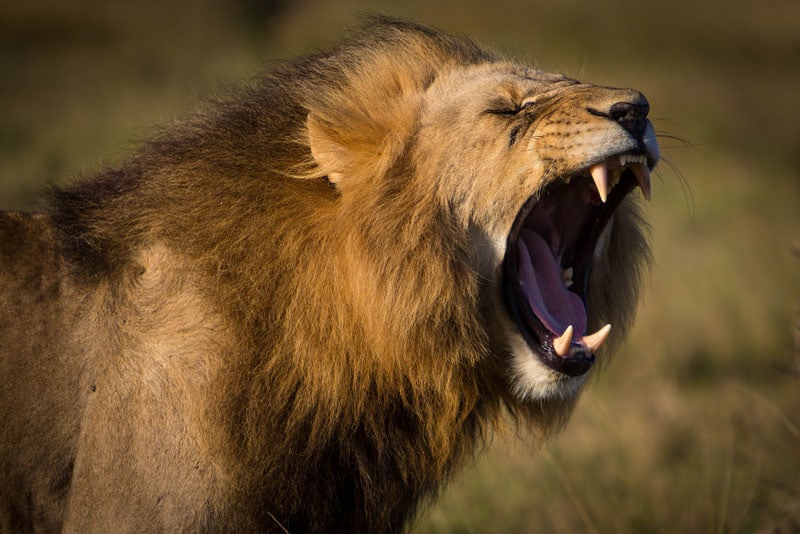
Table of contents
Table of Contents
Fast Facts about South Africa
- Currency: The official currency is the South African rand and 1 rand is equal to 0.067 USD.
- Power: Power voltage is 230V at 50 Hz.
- Entry: To enter, you will need a U.S. passport. If your stay is under 90 days, you will not need a visa.
- Getting Around : The best way to get around is by bus or train. We have also done car rental and loved it.
- Sales tax : The sales tax rate is 15%.
- Best Sim Cards: Cell C, MTN, and Vodacom are the most popular mobile providers. A prepaid SIM card can be purchased through any of them by visiting their official stores or local grocery or drug stores.
- When to visit South Africa: South Africa’s summer is November and February and it is warm and dry in the south while rainier in the north. Whale watching is best from July to November.
- May to September is the best time for wildlife and safaris.
- Tap water is potable. However, ensure that you take bottled water or a water purifier with you when traveling to remote rural areas and the bush.
- The Capital City of South Africa is Pretoria.
Things to See and Do in South Africa
- Kayak with Crocodiles and Hippos – If you are feeling adventurous, skip the platoon boat and kayak in the river instead! Nothing but fiberglass separate you from the crocodiles below
- Take a microlight flight – Take a thrilling flight over the sugar cane plantations in Durban and the magnificent Dolphin Coast.
- Robben Island : Take a tour through this former prison that includes a museum. A prison that once held Nelson Mandela and many other political prisoners fighting to end apartheid, it is now a symbol of
- Penguins of Simons Town – South Africa has its own little penguin colony and you can see them on your way to the Cape of Good Hope.
- See the Cango Caves – these caves are the oldest tourist attraction in South Africa and one of the best cave systems the PlanetD have ever visited!
- Go on a Safari! – A person can’t go to South Africa without going on safari
South Africa Travel Guides
28 Reasons Why South Africa Should Be on Your Bucket List
- What to Wear on Safari – Africa Travel Inside and Out
- Best Things to do in South Africa
Accommodation
Budget: You can find a number of backpacker hostels for 150 to 230 rand per night. Enjoy dorm-styled or private rooms, shared kitchens, free Wi-Fi, and great locations.
Mid Range: For mid-range hotels, expect to pay 300-600 rand per night and enjoy private rooms, free breakfast, an outdoor pool, a hotel restaurant and bar, a gym, and nearby attractions.
High End: Upscale hotels will range from 1,000 to 22,000 rand per night. Take in the best with top-of-the-line hospitality, polished rooms and suites with ocean views, infinity pools, fine dining, spa services, butler service, sundecks, and more.
If you are starting your trip in Cape Town check out our suggestions for Best Things to do in Cape Town
When in South Africa, try staple dishes like chakalaka and pap (vegetables and beans with porridge). You must make sure to have a South African Braai when in the country. This is their answer to a barbecue.
For something sweeter, some malva pudding (sponge pudding with apricot jam and hot cream sauce). When out and about, look for bunny chow (white bread filled with sambal) or Boeri Rolls (South African sausage in hot dog bun with onion relish, chili, and tomato).
When you’re ready for a sit-down meal, South Africa has a number of restaurants to sample from. In total, expect to pay around 120 rand per meal for most places, or up to 500 rand per meal for more expensive places.
The national dish is Ragu alla Bolognese Sauce (meat-based sauce served in tortellini, gnocchi, or tagliatelle pasta). Other favorites include pizza, lasagna, and bottarga (cured fish roe).
The Best Ways to Get Around South Africa
Getting to south africa:.
The O.R. Tambo International Airport is the main airport and is 13.5 miles from Johannesburg, while the Cape Town International Airport is 12.5 miles from Cape Town.
Flights: If your budget allows, direct flights are a fast way to get between cities. Go from Johannesburg to Cape Town, for example, in two hours for 1,500 rand.
You can check for the best flights to South Africa on Skyscanner .
Transportation:
Transportation: Trains are a fast way to get around. South Africa comes with overnight trains designed for tourists.
Go from Johannesburg to Cape Town for 700 rands and enjoy dining and shower options. These trains tend to move slower than traditional trains or buses, making them ideal for scenic views.
For faster routes, try the rapid transit system (Gautrain) that departs every 20-30 minutes and moves between major cities at 99 miles per hour. Go from the O.R. Tambo airport to Johannesburg, for example, for 165 rand.
Buses : Buses are a good way to get between major cities and have a variety of services.
The Baz Bus is a good shuttle bus for tourists and travels to major cities like Johannesburg, Durban, and Port Elizabeth, and has prices between 2,600 to 5,400 depending on the distance.
Taxis: Taxis are an alternative way to get around. Prices start at 15 rand and increase 10-12 rand per kilometer traveled.
Car Rental: To rent a car, you must be at least 21 years old and have a U.S. license as well as an International Driver” But you can find great deals for car rentals too so look around.
To rent a car, you need a valid U.S. driver’s license and be at least 18 years old. Prices start at around 600 rand per day.
Uber: Uber is an option, especially in major cities like Johannesburg and Port Elizabeth.
When to go To South Africa
The best time to go to South Africa depends on what you want to do there. If you’re going on a safari, travel during the dry season of April to September.
This is a great time to enjoy pleasant temperatures (with highs of 80 degrees Fahrenheit) and also the period where you can spot the most wildlife.
Alternatively, if you want to see the whales, travel between July and November.
Where to Stay in South Africa
Glen Boutique Hotel and Spa : Stay in the heart of Cape Town at this great boutique hotel. Enjoy stylish suites with private balconies and ocean views, spa services, an adult pool as well as an infinity pool and hot tub, flat-screen TVs and coffeemakers in each guest room, bathrobes, and the hotel restaurant and bar. The hotel even provides transportation to the Cape Town airport, located just 13 minutes away. If you’re not ready to leave yet, there are numerous bars and restaurants nearby.
Genesis All-Suite Hotel : One of the best places to stay in Johannesburg is this centrally located four-star hotel. Enjoy suites with kitchenettes and cable TVs, a fitness center, a pool, the hotel’s restaurant and bar, laundry and dry-cleaning services, and free high-speed Wi-Fi. When you’re ready to step out, numerous attractions are just minutes away.
Hilton Durban : Just a mile from South Beach, this upscale hotel has everything you need for a great stay. Enjoy an outdoor pool, dining options, a wine bar, a fitness center, room service, spa services, and a complimentary breakfast. Numerous attractions, including a waterpark, casino, and a botanic garden are just minutes away.
Check out our favorite booking platforms Booking.com , Tripadvisor and VRBO for the best deals on accommodation in Ireland.
South Africa Accommodation Guides
- Accommodation in Cape Town
- Accommodation in Durban
- Accommodation in Johannesburg
What to Pack for South Africa
When packing for South Africa it is important that you keep your lodgings and planned activities in mind.
It is recommendable that you pack transitional clothing items that can carry you from day to night or from city sightseeing to safari adventures.
- Neutral colors – If you planning on heading out on a safari than it’s best to limit your color palette to neutrals, especially on game drives, as bright reds and harsh prints can provoke wildlife.
- Headlamp or flashlight – if traveling to rural areas, battery-powered headlamps or flashlights can help you navigate in the dark if there is limited power or if there is a blackout.
- Insect Repellent – Along with natural beauty and breath-taking wildlife, South Africa is also home to lots of insects and mosquitoes that can carry diseases. Be sure to pack more than one can of DEET or Permethrin insect repellent.
- Mosquito nets and bug spray – If you are staying in basic accommodations, be sure to bring your own mosquito net.
- Malaria pills – there have been increased numbers of malaria cases being reported in South Africa. To reduce your risk take precautionary measures against mosquito bites and consider packing malaria pills for your trip.
- Walking Shoes: Keep your feet comfortable with a sturdy pair of walking shoes.
- Power Adapter: As the voltage is higher than the US, a power adapter will ensure your electronics can be charged properly.
- Sunscreen and Safari Hat: Protect your skin from the beautiful sun with some sunscreen.
See our packing tips for What to Wear on a Safari.
South Africa Travel Guide: Best Booking Resources
Whenever we travel to we make sure to start with these companies. We have tried a lot of different ones over the years and all of these have consistently proven to be the best when it comes to offering great prices.
We have used every one of these personally and continue to do so.
- Booking.com : This is our go site to when comparing prices for accommodation. It usually has the cheapest prices, especially in Europe and we love their interface. Not to mention you get free cancellation and you are guaranteed the best price.
- Trip Advisor : What we like about Trip Advisor is that we can look at all the reviews and then book our accommodation. TripAdvisor is where we go when we want to compare prices with multiple accommodation providers.
- VRBO : is the main search engine we use when we are looking for a home or apartment rental. It can sometimes be cheaper than hotels and it is the best way to stay in areas that offer a more local feel.
- Hostelworld : With one of the largest databases of hostels in the world, Hostelworld is the go-to site when you are looking for budget accommodation.
- Skyscanner : This is the first place we check for flights. It consistently comes back with the cheapest and best options. It allows us to compare a lot of airlines to get the best price.
- Rome 2 Rio : If you want to see how to get somewhere by plane, train, bus, ferry or car Rome2Rio lays it all out for you as well as related costs.I love how they show it all to you on a Google Map and it works offline.
- Get Your Guide: For all your day trip and city guide needs, we use Get Your Guide. It has the world’s largest collection of things to do with more than 30,000 activities in 7500 destinations.
- World Nomads Insurance: When traveling to Italy you should always have travel insurance. We have found the best bang for your buck is by far World Nomads.
South Africa Travel Guide: Related Articles
To browse all our articles and guides about South Africa click here.
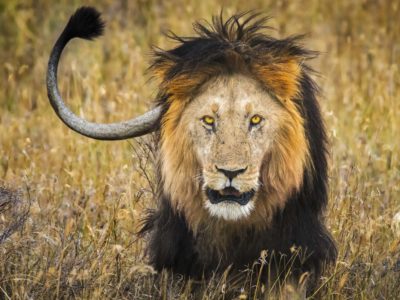
29 Best Things to Do in South Africa In 2024
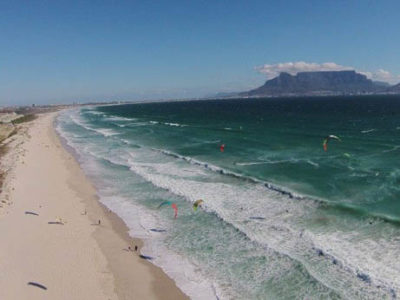
Ultimate Guide to Kitesurfing Cape Town – A Local’s Guidebook
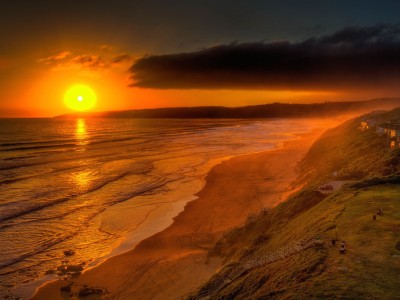
15 of the best things to do in South Africa

Sep 7, 2024 • 14 min read

Experience the best that South Africa has to offer with these top things to do. RudiHulshof/Getty Images
It’s no secret that South Africa is one of the world’s top Big 5 safari destinations.
You could come here only to go on safari and think South Africa was the best country ever. But wait – there’s so much more to this fascinating realm perched at Africa’s southernmost tip.
South Africa’s ethnic and cultural diversity influences its cuisine and art in exciting, unexpected ways. Its scenery is stunning, from wave-crashed shorelines and wildflower-carpeted deserts to wildlife-filled bushveld and tropical forests. The country has cosmopolitan cities, charming wine towns and important cultural traditions. Apartheid’s struggles are faced head-on at several important sights.
You can hike, surf, kayak, fish, whale watch, horseback ride, dive with sharks and crocodiles and stargaze under some of the planet’s darkest skies. The only problem is how to even begin planning a visit to this immensely blessed, multifaceted land. Start planning your trip with this list of the top things to do in South Africa.

1. Walk among the wildflowers of Namaqua
Most of the year, the remote region known as Little Namaqualand is parched, a seemingly sunbaked wasteland in South Africa’s Northern Cape. But for a short period in July, as winter rains begin to fall, the area bursts to life with billions of blooms. Endless carpets of flowers in every hue cover its diverse topography, from deserty plains to fertile valleys to towering mountains.
But what truly sets this spectacle apart is the sheer variety of flowers; more than 3500 species grow here, more than half rare or endemic, meaning they live nowhere else on Earth. The most iconic is the Arctotis, commonly called the African daisy. Gazania glows with hot yellow and orange petals, and Carpobrotus, commonly known as pigface, creeps along the ground.
The best places to take in the ephemeral flowery show are Richtersveld , with a backdrop of yawning canyons and jagged mountains; Skilpad Wildflower Preserve west of Kamieskroon, part of the bigger Namaqua National Park , a fabulous spot to gaze at the famed Nama daisies; and the 14,973-hectare (37,000-acre) Goegap Nature Reserve outside Springbok, with some 600 indigenous plant species.
Planning tip: Accommodations in the park (primarily campsites and chalets) are in high demand during this short blooming season. Either book reservations as soon as they open (usually 11 months in advance), or find places to stay in the nearby towns of Kamieskroon and Garies.
2. Spot the Big 5 and other wildlife in South Africa’s parks
As the early morning sun rises over the bushveld, a herd of elephants thunders past, a leopard enjoys a snack up in a tree, and a lion stalks its prey. These are the joys of going on safari in South Africa, where you have an excellent chance of spotting the Big 5 (lion, leopard, rhino, buffalo and elephant) in national parks and wildlife preserves across the country.
Kruger National Park is the prime game park, with 19,485 sq km (7523 sq mi) of bushveld, tropical forests, savannah and mountains teeming with more than 140 mammal species. Addo Elephant National Park in the Eastern Cape is the world’s first “Big 7” Conservation Area, home to the traditional Big 5, plus the unique marine additions of the great white shark and southern right whale.
Hluhluwe-iMfolozi Park in KwaZulu-Natal is South Africa’s oldest game reserve. It was founded to conserve and repopulate Africa’s rhinos , so this park is hands down the best place in South Africa to see these one-horned, short-legged megafauna.
In all, South Africa has 19 national parks and countless private game reserves, each offering an unforgettable wildlife experience where no two days are ever the same.
Planning tip: Plan your trip from June to September for optimal wildlife viewing. Animals tend to gather at watering holes during these drier, cooler months.

3. Hike or ride up Cape Town's iconic Table Mountain
The flat-topped Table Mountain stands watch over Cape Town , a 1085m (3560ft) natural landmark of sandstone and granite adored for its breathtaking views from the top: glittering Table Bay, historic Robben Island and all of Cape Town’s City Bowl sprawl at your feet.
Dozens of trails wind up Table Mountain’s flanks, opening up valleys of fynbos (the local floral kingdom), shady forests and waterfalls. The most popular (and heavily trafficked) is Platteklip Gorge Trail, a 2.8km (1.8 miles) uphill push that is nature’s answer to the StairMaster, offering view after breathtaking view the higher you go.
Avoid the crowds with 1.5km (0.9-mile) Kloof Corner, a dramatic and somewhat hair-raising trek that rewards with fabulous views of Lion’s Head, the 12 Apostles and the Cape Town City Bowl. The difficult 2.5km (1.5 miles) India Venster Trail follows the route beneath the aerial cable car, up the mountain’s frontal face. Of course, you can just take the cable car, a quick five-minute ride to the top.
Planning tip: Many trails in South Africa limit how many hikers can be on them simultaneously, so book your spot ahead of time and hike with a group for safety (some longer trails actually require that you're not alone).
4. Learn from South Africa’s apartheid past in Johannesburg
South Africa has made steps in atoning for its apartheid past through education at various sites. Johannesburg ’s Apartheid Museum is a sobering but enlightening place to start. Exhibits take you through the history of apartheid using videos, documents and photographs.
At the Hector Pieterson Memorial and Museum in Soweto, spoken testimonies, videos and photographs detail the tragic story of a 12-year-old student who became the first victim of police fire in 1976 when students protested the imposition of Afrikaans as the medium of instruction in schools. Nearby, Nelson Mandela lived in a humble, four-room house, which today is the Mandela House Museum , showcasing family photos and personal belongings and providing insight into the beloved anti-apartheid leader who, after 27 years in prison, became South Africa’s first democratically elected president.

5. Taste Pinotage in the Cape Winelands
When the Dutch colonized South Africa some 350 years ago, the Dutch East India Company established a provisioning station for its ships. Since these ships needed wine the Company partnered with the French, and soon vineyards draped the valleys in the fertile region now known as the Cape Winelands . Over the years, the art of wine-making has been fine-tuned, including the perfection of Pinotage, South Africa’s signature red wine that’s a rustic cross between Pinot Noir and Cinsault.
Today, in independent South Africa, the Cape Winelands reigns as one of the world’s finest wine regions. Within it is a patchwork of vineyards and hundreds of wine estates, farm markets, little museums, gastronomic restaurants and three main wine towns dating from the 17th century: Franschhoek , settled by French Huguenots; Stellenbosch , filled with Cape Dutch architecture; and Paarl, colonized by 23 families from Stellenbosch. Excellent places to sample Pinotage include Delheim, on the slopes of Simonsberg Mountain outside Stellenbosch, and Lanzerac , established in 1692 near Stellenbosch with stunning views of mountains, vineyards and oak-shaded gardens.
Detour: If you need a break from all the wine tastings, take a drive (or bike ride) outside Paarl on Bainskloof Pass. This scenic mountain pass features almost 30km (19 miles) of unforgettable vistas and a caravan park at its halfway point.
6. Get lost on the Wild Coast
Sea breezes, crashing waterfalls, emerald valleys and footprint-free, cliff-fringed beaches define the untrammeled realm of the Wild Coast , a fittingly named 250km-long (155-mile) sweep of coastline fronting the Indian Ocean in the Eastern Cape . This is the place to get away from it all, soaking in the solitude of pristine nature, where you’ll see more cows than people. Be warned: the roads are full of potholes, and gas stations are far and few between, but that’s what keeps the less intrepid away.
You can hike, swim, ride horseback, canoe, surf or just catch the rays on your own private beach. The hike to Hole in the Wall along the coast is a three-hour foray across undulating hills and through local villages, ending at the fabled rock arch with its swimming lagoon. The Xhosa River is a canoeing paradise with sparkling clear waters and bright Xhosa huts along its banks. Mirror-smooth Jbay Lagoon draws SUPers, kayakers and canoers. The Xhosa people have lived in this enchanted land for centuries, and you’ll see their turquoise rondavels dotting the lush green hills.
This is also the birthplace of anti-apartheid revolutionary leader Nelson Mandela, and several small museums in Mthatha and Quno are open to visitors.
Detour: Take a hike on one of Dwesa Nature Reserve 's walking trails through pristine forests, grasslands and coastline. It's a paradise for a wide variety of wildlife – including around 290 bird species.

7. Go whale watching by land or sea
Some 37 species of whales and dolphins frequent South Africa’s shores, so it’s no wonder whale-watching is a popular activity. You can hop on a boat from plenty of places along the country’s three coastlines to view these behemoths in their watery haunts.
But here’s a twist: in some places, you don’t even have to step on a boat to see a whale – you can see them up close from the shore. Watch whales from the shore in Lambert’s Bay, Yzerfontein and Plettenberg Bay , but the most celebrated land-based viewing spot is Hermanus , about 100km (62 miles) east of Cape Town. Between June and November, southern right whales stop by on their annual migration from Antarctica, and right off the coast, they splash, breach and lobtail (slap their flippers and tail against the water). The town even has a whale crier who blows a kelp horn when whales approach the shore.
8. Immerse yourself in Zulu history
The Zulus reigned between 1816 and 1897 in much of present-day KwaZulu-Natal as one of Africa’s most prominent empires. Despite their fierce fighting abilities, the British defeated them in the 1870s, and their kingdom was integrated into the Union of South Africa. But their culture remains strong – they are South Africa’s largest ethnic group – and the Zulu royal family is still active, reigning (but not ruling) in KwaZulu-Natal.
You can experience Zulu culture by visiting the Battlefields Region in the province’s northwest, where the Zulus fought 63 battles against a succession of invading forces. Monuments and museums such as Blood River and Isandlwana commemorate these clashes.

9. Bask in the sun on Durban's Golden Mile
With more than 320 sunny days a year, Durban is a much-loved playground of golden-sand beaches lapped by the Indian Ocean’s azure waters. An expanse of sun-soaked paradise dubbed the Golden Mile (although it’s more like four miles) runs from uShaka Beach in the south to Suncoast Casino and Entertainment World in the north and offers beaches and beachy activities for everyone.
Beginners can surf from South and Addington beaches, and fishers can drop a line at Bay of Plenty Beach . Other stretches of sand, such as Umhlanga Rocks just slightly north of the Golden Mile, have a lively vacation vibe. If you want to picnic or just hang out with your travel companions, Blue Lagoon is a fabulous choice. A promenade runs along much of the Golden Mile, with Zulu artisans selling their wares and runners, walkers, cyclists and skateboarders catching the rays.
10. Explore the evolution of humanity
Deep beneath Gauteng ’s highveld (high plateau), 20th-century researchers discovered two distant relatives of all humankind in the region’s labyrinthine limestone caves: Mrs Ples, the 2.1-million-year-old skull of an Australopithecus Africanus (a precursor to the genus Homo) and Little Foot, a nearly complete, three-million-year-old Australopithecus skeleton. Then, in 2015, a new species of human relative was uncovered, Homo naledi, whose placement in the evolutionary chain is still unknown.
You can explore this significant archaeology at the Cradle of Humankind, about an hour northwest of Pretoria. Entertaining, world-class exhibitions provide context at the Maropeng visitor center, and you can go beneath the earth to the excavation site at Sterkfontein Caves .

11. Ride the Blue Train
Sit back and soak in the golden age of travel aboard the Blue Train , a five-star hotel-on-wheels ranked as one of the world’s great rail journeys. Since this train came about during colonial times, when 19th-century British diamond and gold magnates demanded luxury, expect warm birch paneling, plush leather seating and full silver service at gourmet five-course meals.
The Blue Train travels between Pretoria and Cape Town, with two nights onboard. While you’ll enjoy the best of service and decor, it’s the scenery outside the windows that will dazzle the most: cactus-dotted desert, rocky mountains, vineyard-dotted hills, lush valleys and a front-row seat for Africa’s famous sunsets. Meals, drinks, Monte Cristo cigars and even a personal butler come with the hefty price.
Planning tip: Book your Blue Train ride during the low season (Nov–Aug) for significantly lower fares.
12. Follow the enchanting Garden Route
Take a scenic road trip through seaside villages, glittering beaches and misty mountains along the Garden Route , which some call the Garden of Eden. You can drive the 200km (125 miles) straight through, from Mossel Bay to Storms River, but this is one to take your time dipping into. Scuba dive to see Knysna seahorses, surf crashing waves, hike shadowy forests, see elephants in the wild, bungee jump into a plunging gorge, or simply plunk down on an empty beach. Good bases are Plettenberg Bay and Knysna . A minimum of four days is recommended, though you could seriously spend weeks here.
Detour: Make a Saturday morning pit stop at Wild Oats Community Farmers Market for fresh produce, baked goods, breakfast and more, just 1.5km (1 mile) east of Sedgefield. The market is a beloved Garden Route stop.

13. Drive from Cape Town to Africa’s southwesternmost point
The Atlantic and Indian Oceans converge at historic Cape Point – aka the Cape of Good Hope – about 65km (40 miles) south of Cape Town. It’s thrilling to stand on this wind-blown, jagged landmass jutting into the sea, the southwesternmost point in Africa, observing the roiling waves and indigo waters as far as the eye can see. These treacherous waves have been the bane of seafarers for centuries, causing hundreds of shipwrecks. For spectacular views, jump on the Flying Dutchman Funicular or walk the steps to the 86m (285ft) lighthouse-topped summit.
Planning tip: Don’t rush your journey here. A drive from Cape Town reveals along the way dazzling beaches, cliffside vistas, fishing villages, and miles and miles of remote bushveld inhabited by zebras, ostriches and baboons. The African penguin colony at Boulders Beach is one of only two land-based penguin colonies in the world.
14. Sample Cape Town’s culinary heritage
Throughout Cape Town’s long history of colonization and immigration, a parade of cultures has taken root, each contributing its unique traditions and customs. The most obvious – and cherished – result is the city’s diverse, innovative cuisine. Many call Cape Town the foodie capital of South Africa. You’ll find dishes influenced by the British, French, Indians, Dutch, Asians, Africans and more.
The Cape Malay, for example, is a community influenced by southern African, Asian (especially Indonesian) and Dutch cultures; they’re known for their variety of spice-infused bredies (stews), curries, savory snacks and porrings (a warm pudding). Braai – derived from the Dutch word braden , meaning "to roast" – has become ubiquitous throughout the country. But braai is much more than barbecuing meat: it’s a social event where friends and family gather. Many township tours offer a traditional braai experience. Local chefs are taking note of this rich cultural heritage. Chef Luke Dale-Roberts’ three award-winning Cape Town restaurants – Test Kitchen , Pot Luck Club and Shortmarket Club – are prime examples, with their innovative twists on traditional fare.
Planning tip: Making restaurant and hotel reservations will be much easier if you avoid traveling during the peak Christmas and Easter seasons.
15. Go on a sky safari in the Karoo
The Karoo’s sparsely populated landscapes are immense by day, and its skies are just as vast by night. In this magical semi-desert realm – encompassing nearly 500,000 sq km (1.9 million sq miles) within Western Cape, Northern Cape, Eastern Cape and the Free State – the stars pierce some of the Earth’s darkest, cleanest skies, seemingly so close you can reach out and touch them.
It’s no wonder that the South African Astronomical Observatory , the southern hemisphere’s largest, is found here. You can take a guided tour by day, but the nighttime stargazing safaris are the major draw.
Planning tip: The charming, historic town of Prince Albert is a good stargazing base.
This article was first published Jan 5, 2022 and updated Sep 7, 2024.
Explore related stories
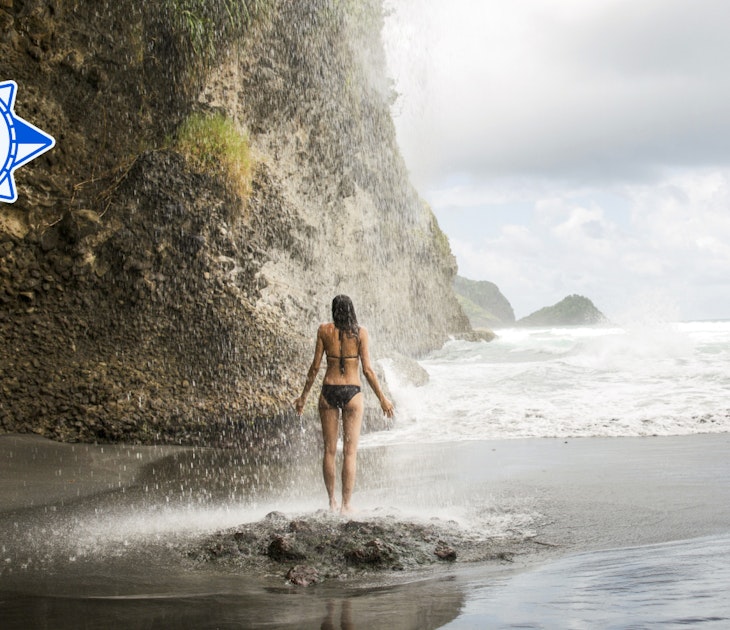
Wildlife & Nature
Feb 27, 2024 • 6 min read
April is the ideal time of year for mild-weather hikes, cherry blossom festivals, fresh produce and more.

Feb 19, 2024 • 6 min read

Dec 8, 2023 • 6 min read

May 3, 2023 • 9 min read

Mar 16, 2022 • 7 min read

Sep 17, 2020 • 5 min read
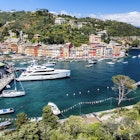
Jul 8, 2020 • 6 min read

Feb 7, 2020 • 7 min read

Dec 16, 2019 • 2 min read

Dec 11, 2019 • 5 min read
Wanderlust Travel & Photos
Seeing the world one trip at a time.
- Work With Me
- Travel Journal
- Privacy Policy
- Browse by Continent
South Africa Travel
- Tanzania Travel
- Thailand Travel
- Dominican Republic Travel
- Italy Travel
- Spain Travel
- Canada Travel
- Australia Travel
- New Zealand Travel
- Peru Travel
- Browse by Region
- East North Central
- East South Central
- Mid-Atlantic
- New England
- South Atlantic
- West North Central
- West South Central
- Central America
- North America
- South America
- Travel Vlog
- Instagram Photos
Exploring the vibrant and diverse country of South Africa is a captivating adventure for any traveler. From the bustling streets of Cape Town , with its iconic Table Mountain backdrop, to the vast, untamed wilderness of the Kruger National Park, South Africa travel offers an incredible array of experiences to discover.
South Africa’s culinary scene is equally enthralling, blending diverse cultural influences to create a tantalizing fusion of flavors, from succulent game meats to bold, award-winning wines. Whether you’re marveling at the iconic silhouette of Cape Town’s harbor, tracking the Big Five on an exhilarating safari, or immersing yourself in the vibrant townships, South Africa promises to captivate the senses and leave a lasting impression on every traveler who ventures to this remarkable destination.

Please feel free to use this South Africa travel page as you plan your next adventure. To help you navigate the information I have included on this page, I have provided a quick navigation menu for you to use below. This will make it quick and easy for you to see which top destinations I recommend, which popular parks and destinations in South Africa you should consider visiting, and links to all of the travel guides, itineraries, and packing articles I have written to help you plan your adventure.
I have also included some key information you will need when planning your travel to South Africa. Information such as the languages spoken, the currency used, emergency contact numbers to be aware of, VISA and passport considerations, required vaccinations, and important driving information (if you plan on driving while on your visit).
Top Things to See
Before you start planning your South Africa travel, make sure you check out my gallery of the top things to see in the country below for some inspiration. There is so much to see and do in the country, so you won’t want to miss out on the top sights!

The Blyde River Canyon

Boulders Beach Penguin Colony

The Cape of Good Hope

Richtersveld

Kgalagadi Transfrontier Park

Robberg Nature Reserve

Table Mountain

Kruger National Park

The Storms River Bridge
If you would like some additional ideas to add to your South Africa travel itinerary, make sure you check out my article, Unforgettable Experiences: The Top 25 Things to Do in South Africa linked below.
Popular Cities

As you start planning your South Africa travel, you will want to start familiarizing yourself with the country. This way, you will have a better idea about which cities and other attractions you want to see. To help you with this, I have included maps that outline the key cities in South Africa for you to review below.

View Larger Map
Languages Spoken
In South Africa, 11 different languages are recognized by the constitution as official languages. For centuries, the official languages in the country were Dutch, English, and Afrikaans. The native African languages that were spoken by over 80% of the population weren’t officially recognized. However, that changed in 1996 when the new constitution properly recognized these majority languages.
These official languages, as well as the percentage of the population that speaks them, are illustrated in the pie chart below for you to review.
Source: https://southafrica-info.com/

The official currency in South Africa is the South African Rand or just Rand for short. The symbol for the Rand is R and the code for the Rand is ZAR . One Rand is divided into 100 cents.
The common denominations for the bank notes for Rand are 10, 20, 50, 100, and 200 rands. There are also coins, which are issued in denominations of 1, 2, 5, 10, 20, and 50 cents, and in denominations of 1, 2, and 5 rands.
Power Adapters Required

One of the most overlooked aspects of international travel is ensuring you have the proper power adapters. You may or may not be aware that both the voltage and the type of outlet available differ widely from one region of the world to the next. If you aren’t prepared, you won’t be able to charge your electronic devices as you travel.
Even worse, you may damage or even destroy your electronic devices if you don’t have the right adapter with a voltage converter. Electricity supplies worldwide can vary from anything between 100V and 240V. It can be extremely dangerous to use an electrical appliance that is rated at a voltage different from the supply.
To ensure that this doesn’t happen to you, I have included some critical information on the electrical system in South Africa for you to review below. This includes what types of international power adapters you should bring with you on your trip.
Electrical Voltage in South Africa
In South Africa, the voltage of the electrical supply is 230V . If you have an appliance that is single voltage rated, the voltage rating of the device must be 230V for you to use it without a voltage converter. When shopping for a travel power adapter, it is important to confirm that the adapter you choose has a voltage converter included and isn’t just an adapter.
A power adapter will change the type of plug from one type to another so that you can plug into different outlets. However, a simple power adapter will not change the voltage of the supply to the voltage used by the devices you brought from home (120V in the United States). To do that, you will need a travel power adapter with a voltage converter.
Electrical Outlets in South Africa
In South Africa, the four types of electrical plugs used are Type C , Type D , Type M , and Type N . The Type C plug has two round pins in it, while the Type D plug is the plug with three round pins in a triangular pattern. Finally, both the M and the N plugs have three round pins to plug in. Please see the illustrations below for a better understanding of what these plugs look like.

Emergency Contact
Should you run into an emergency situation while in South Africa, it will be important to know the emergency numbers. This way, you will know which numbers to dial when you need immediate assistance. To assist you, I have documented the available emergency assistance numbers for South Africa below for you to review.
- Emergencies from Mobile – 112
- Emergencies from Landline – 107
- South African Police Service – 10111
- Medical & Fire – 021 535 1100
- Table Mountain NP Emergencies – 021 480 7700
- Sea and Mountain Rescue – 021 948 9900
- National Sea Rescue Institute – 087 094 9774
- Baboon Monitors – 071 588 6540
- Shark Spotters – 078 174 4244
- Ambulance – 10177
Visa, Passport, and Immunization Info

Before booking your South Africa travel, you will want to be sure that you meet all of the necessary passport, VISA, and immunization requirements so that you can ensure you will be allowed into the country. To assist you, I have listed the requirements you will need to consider below for you to review.
Passport Validity
To be allowed into South Africa, your passport needs to be valid 30 days after your arrival . If there will be less than 30 days until your passport expires when you are set to arrive in South Africa, then you will need to renew your passport before traveling.
VISA Requirements
In addition to your passport, one of the most important entry requirements that you will need to consider before traveling to South Africa is the tourist VISA requirement. Depending on which country you are from, whether you will need to obtain a tourist VISA and what process you must follow to obtain one may differ. The following sections outline the South African tourist VISA requirements and how to apply.
VISA Exempt Countries
If you are a passport holder from one of the countries listed below, you are VISA-exempt. This means that you won’t need to obtain a tourist VISA before traveling to South Africa if you plan on staying for less time than the VISA exemption period. The good news is that if you are a resident of the United States and Canada or the Schengen Area of the European Union, you will not need to obtain a tourist visa if you plan on staying in South Africa for less than 90 days.
All Other Travelers
If you don’t hold a passport from one of the VISA-exempt countries listed above, you will need to apply for a South African tourist VISA before traveling. I strongly recommend that you apply for your VISA well before your expected travel date as you won’t be able to board your flight to South Africa without your VISA.
Immunization Requirements
Important Note: I am not a medical doctor and do not have any medical experience. The information provided in this section is a summary of information that I got from the recommendations of the Centers for Disease Control and Prevention in the United States for travel to South Africa . I am providing you this information to help bring awareness of the necessary vaccinations to you, but consultation with my guide should not replace a discussion about your travels with your doctor or a travel medical clinic.
There are currently no vaccine requirements to enter South Africa unless you are coming from a country that is considered high risk for Yellow Fever . If you are traveling from a high-risk country, you will need to show proof of Yellow Fever vaccination before being allowed to enter South Africa.
Important Note: Even if you were only in a high-risk country on a layover for a flight, you may be required to show proof of Yellow Fever vaccination if the layover was 12 hours or longer.
Routine Vaccinations
The following routine vaccinations are recommended for anyone who will be traveling:
- Measles Mumps Rubella (MMR)
- TDAP (Tetanus, Diphtheria & Pertussis)
Recommended Travel Vaccinations for South Africa
In addition to the routine vaccinations above, the following are additional vaccinations you may want to consider for South Africa:
- Hepatitis A
- Hepatitis B
- Measles – Cases of measles are on the rise worldwide.
- Rabies – If you plan on spending time in remote areas or on safari.
- Cholera – Cholera transmission is not uncommon in Africa, though rare in travelers.
- Polio – Poliovirus has been identified in Africa within the last year. There is an adult booster vaccine you can get to be safe.
- Yellow Fever – If you are traveling from high-risk areas.
Customs and Currency Restrictions
In addition to the other entry requirements for South Africa, you also need to make sure you understand and comply with the country’s customs and currency restrictions. For your convenience, I have highlighted these restrictions for your review below. More in-depth information on the customs restrictions can be found on the VisaHQ website for South Africa Travel .
Free Import
The following items are considered free-import items but with limits (as described below).
- 200 cigarettes
- 250g of tobacco
- 50ml of perfume
- 1L of spirits
- Goods for personal use
Important Note: Travelers may be asked to pay a deposit on expensive items like laptops, DSLRs, or mirrorless cameras. This deposit will be refunded when the item is re-exported when you travel home.
Prohibited Items
Before you will be allowed into South Africa, you will also need to clear customs to be sure you aren’t carrying any prohibited items with you. For instance, travelers are strictly prohibited from bringing the following items into South Africa:
- Narcotics and other controlled substances
- Pornography
- Weaponry, explosives fireworks etc.
- Poisonous chemical and biological substances and other health-endangering substances
- Cigarettes with a mass of more than 2 kilograms per 1000 units
- Counterfeit goods
- Goods breaking copyright laws
- Prison-made and penitentiary-made goods
Controlled Items
In addition to these prohibited items, the government of South Africa has placed limits on the quantity of other items that can be brought into the country. The following items are considered controlled items in South Africa:
- Local currency of over 10,000- gold coins, coin and stamp collections and unprocessed gold need to be declared.
- Endangered species of plants or wildlife, whether alive or dead, including any parts of and articles made from them will need a permit from CITES.
- Plants and products thereof (honey, margarine, and vegetable oils, seeds, etc.).
- Animals and products thereof (dairy products, butter, eggs).
- Medicines for personal use need to be accompanied by a prescription and a note from your doctor.
Currency Restrictions
When visiting South Africa, like all countries, you can’t just bring any amount of currency that you want into the country or leave with any amount of currency when visiting. According to the US State Department website , the government of South Africa has the following currency limits and regulations in place:
- A limit of 25,000 South African Rand (ZAR), an unlimited amount of foreign currency if declared, and no Kruger coins are allowed on entry into South Africa.
- A limit of 25,000 South African Rand (ZAR), an unlimited amount of foreign currency if declared on entry, and up to 15 Kruger coins if proof purchased with foreign currency.
Key Phrases
When visiting the diverse and captivating country of South Africa, there are several key phrases and expressions that can be incredibly useful to know for your South Africa travel. Understanding these and other quintessential South African phrases can go a long way in helping you navigate the country with ease, engage with locals, and fully immerse yourself in the vibrant culture.
Greetings and Pleasantries
- Molo – The Xhosa word for hello.
- Howzit – Casual greeting among friends.
- Sawubona – A Ndebele greeting that means hello.
- Hamba kahle – Zulu phrase for stay well or be well. It is a polite way to say goodbye.
- Robala ka khutso – Sesotho phrase that means sleep well. It is a common way to say goodbye.
- Siyabonga – The Zulu phrase for thank you.
- Siyavuma – Zulu word for I agree.
- Goeie dag – Afrikaans word for good day. It is a common greeting.
- Tot siens – Afrikaans word for goodbye.
- Lekker slaap – Afrikaans word for sleep well. It is a common way to say goodbye.
- Enkosi – The Xhosa word for thank you.
- Hamba kakuhle – The Xhosa word for go well or goodbye.
- Dumela – A Tswana greeting.
- Ke a leboga – The Tswana way to say thank you.
- Asseblief – Afrikaans for please.
- Dankie – Afrikaans for thank you.
- Ja – Afrikaans word for Yes.
- Nee – Afrikaans word for No.
- Lekker – Afrikaans word for good or nice.
- Hayibo! – Zulu word for unbelievable.
- Goeie môre – Afrikaans for good morning.
- Goeienaand – Afrikaans for good evening.
Food and Drink
- Chow – to eat food
- Padkos – Snacks or travel food.
- Braai – Barbeque.
- Borewors – Sausage
- Biltong – Beef Jerkey
- Slap Chips – Potatoe Chips
- Sarmie – Sandwhich
- Fooitjie – Afrikaans for gratuity or tip
- Mag ek die spyskaart sien, asseblief? – Afrikaans for, may I see a menue, please?
- Ek wil graag … bestel – Afrikaans for, I would like to order…
- Kan ek die wynlys sien? – Afrikaans for, can I see the wine list?
- Ek is allergisch vir … – Afrikaans for, I am allergic to….
- Wat beveel jy aan? – Afrikaans for, what do you recommend?
- Kan ek die rekening kry, asseblief? – Afrikaans for, can I have the bill, please?
- Ek is op soek na ‘n goeie winkel vir geskenke – Afrikaans for, I am looking for a good shop for gifts.
- Ek wil graag hierdie (item) koop – Afrikaans for, I would like to buy this (item).
- Wat is die prys van hierdie trui – Afrikaans for, what is the price of this sweater?
- Aanvaar julle kredietkaarte? – Afrikaans for, do you accept credit cards?
- Het julle enige spesiale aanbiedinge vandag? – Afrikaans for, do you have any special offers today?
- As dit nie pas nie, kan ek dit teruggee? – Afrikaans for, if it doesn’t fit, can I return it?
- Mag ek hierdie trui aantrek? – Afrikaans for, may I try this sweater on?
- Kan jy asseblief die kwitansie vir my gee? – Afrikaans for, could you please give me the reciept?
Directions and Navigation
- Links – Left in Afrikaans.
- Regs – Right in Afrikaans.
- Reguit – Straight in Afrikaans.
- Draai – Turn in Afrikaans.
- Waar is die… – Where is the… in Afrikaans.
- Hoe kom ek by (plek) uit? – Afrikaans for, how do I get to (place)?
- Is dit ver van hier af? – Afrikaans for, is it far from here?
- Kan jy vir my op die kaart wys? – Afrikaans for, can you show me on the map?
- Kan jy vir my sê hoe om by (plek) uit te kom? – Afrikaans for, can you tell me how to get to the (place)?
- Is daar ‘n restaurant naby? – Afrikaans for, is there a restaurant nearby?
- Kan jy vir my sê hoe om by die hotel uit te kom? – Afrikaans for, can you tell me how to get to the hotel?
- Waar is die badkamer? – Afrikaans for, where is the bathroom?
Driving Info

Driving in South Africa can be a unique and thrilling experience for visitors, but it’s important to be aware of a few key considerations before getting behind the wheel. Self-driving is an excellent way to experience the breathtaking natural beauty and rich cultural tapestry of South Africa at your own pace.
By familiarizing yourself with local driving customs, obtaining appropriate insurance, and exercising a healthy dose of caution, visitors can safely and confidently explore this captivating destination by car. Before you depart for your South Africa travel, please review the helpful tips for driving in South Africa that I have included below.
Driving License and Permit Required
To drive in South Africa, you must meet the following requirements:
- Be 18 years of age or older.
- Have a valid driver’s license from your home country (which you must keep on you while in South Africa).
- If your driver’s license is not in English, you will need to obtain an International Driver’s Permit (which you must keep on you while in South Africa).
- If your driver’s license does not include a photo, you must also carry your passport with you while driving.
Renting a Car in South Africa
If you are visiting South Africa as part of a tour, you may not need to worry about renting a car. In those situations, your tour guide will often provide you with transportation to get where you need to go. However, if you plan on visiting South Africa on your own or plan to spend a lot of time in the country, renting a car is a convenient way to get around. If you do rent a car while in South Africa, you will want to keep the following tips in mind:
- You must be 18 years old or older to rent a car in South Africa.
- While walk-in booking is allowed, it is recommended that you rent online ahead of time to ensure you get the vehicle you want.
- If you plan to self-drive in one of South Africa’s famed wildlife parks, it is recommended to rent a Landcruiser or other 4×4 vehicle.
- To rent a car, you will need your local driver’s license or your IDP and your passport.
- It is strongly recommended that you purchase additional car insurance from the car rental company you rent from.
General South Africa Driving Tips
If you plan to drive while in South Africa, it is beneficial to know what to expect before you arrive in country. Knowing the following South Africa driving tips will help ensure that you are comfortable and safe while on the roads.
- In South Africa, they drive on the left side of the road and the driver’s seat is on the right side of the vehicle .
- The roads in South Africa are mostly in excellent condition with roads being maintained by the South African National Roads Agency (SANRAL).
- Many of the national roads between the major cities are toll roads. Make sure you have a credit card or cash to pay tolls if driving on these roads.
- All traffic signs are written in English.
- If you hear the word “ robot ” when getting directions, it is important to understand that “robot” is the South African word for traffic light.
- Gas (petrol) stations are mostly open 24-hours in South Africa. Many are not self-help, but instead are manned by attendants who will check your oil and tire pressure for you while refueling your vehicle. Tipping these attendants is appreciated, but not mandatory.
- The three common types of fuel in South Africa are leaded , unleaded , and dual fuel which can be used in place of leaded or unleaded.
South Africa Driving Rules and Regulations
The last pieces of driving advice I have for you in this South Africa travel guide are some highlights of the rules and regulations for driving in the country. Keeping the following driving rules and regulations in mind can save you from incurring any fines and help ensure you remain safe during your visit.
- When driving, keep to the left and pass to the right .
- National Highways – 120km/h (75mph).
- Secondary or Rural Roads – 100km/h (60mph).
- Residential Areas – 60km/h (35mph).
- There are four-way stops in South Africa. The general rule, as is also the case in the United States, is the driver who arrives first goes first.
- Regulatory signs – Stop Signs, Speed Limit, etc…
- Warning signs – Road closure, lane ends, etc…
- Guidance signs – Keep left, detour, etc…
- Temporary Regulatory Signs – Construction, etc…
Safety Tips
Unfortunately, like most countries, South Africa has crime issues in populated areas. If you plan to rent a car and drive while visiting South Africa, you will want to keep the following safety tips in mind.
- Always drive with the doors locked and the windows up, especially at traffic lights. This tip is especially important in big cities.
- Do not stop to pick up hitchhikers.
- Do not leave anything valuable in your car when parked.
- Always try and park in busy, well lit areas.
- If someone hits or bumps your car, stop and call for assistance, but do not get out of the vehicle without the police present.
Relative Guides, Itineraries, and Articles
To assist you as you start to put together your travel plans for South Africa, I have provided a comprehensive list of all of my travel guides, travel itineraries, and travel inspiration articles for South Africa for you to review below.

Unforgettable Experiences: The Top 25 Things to Do in South Africa

The Ultimate Kruger National Park Safari Planning Guide

How To Backpack When Planning to Solo Camp Kruger National Park, Africa

The Ultimate Cape Town Travel Guide for Visitors to South Africa

The Everything You Need to Know Garden Route Adventure Guide

South Africa Photography Prep – The Top Cape Town Photography Spots

Capturing Beauty: The Best Garden Route Photography Spots

South Africa Entrance Requirements: What You Need to Know

Africa Travel Planning Part 2 – Putting Together an Itinerary
Packing and planning tips.
Once you start putting together your South Africa travel plans, you may want to reference some of my handy travel packing and planning guides that I have put together. To make it easy to find and access these guides, I have included them for your reference below.

Top 20 Tips for Solo Travel: Making the Most of Your Solo Journey

The 20 Best Travel Accessories for 2024: An Essential Guide
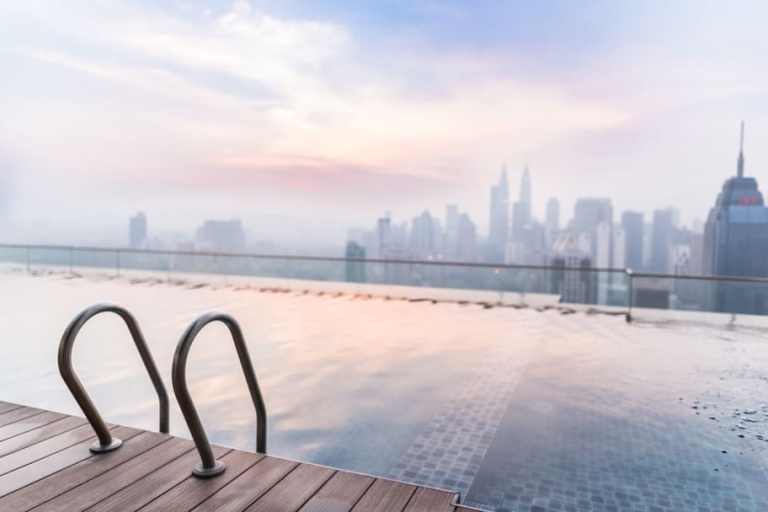
The Ultimate Guide to Save Money on Hotels When Traveling
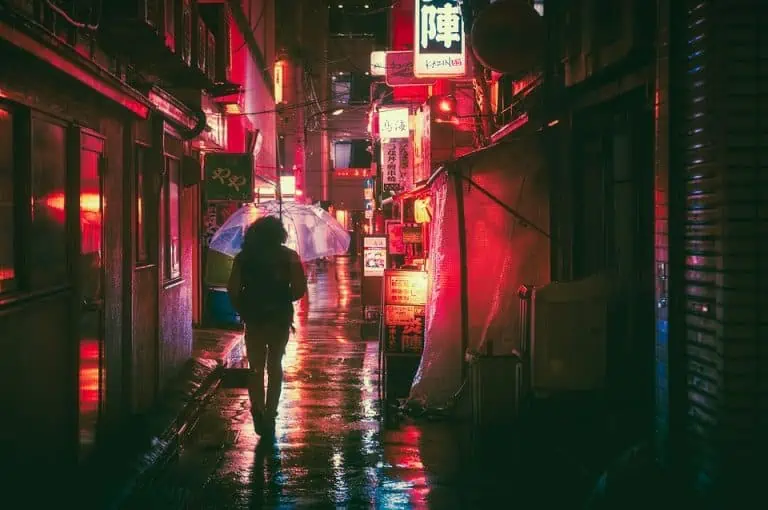
15 Most Common Travel Scams and How to Avoid Them
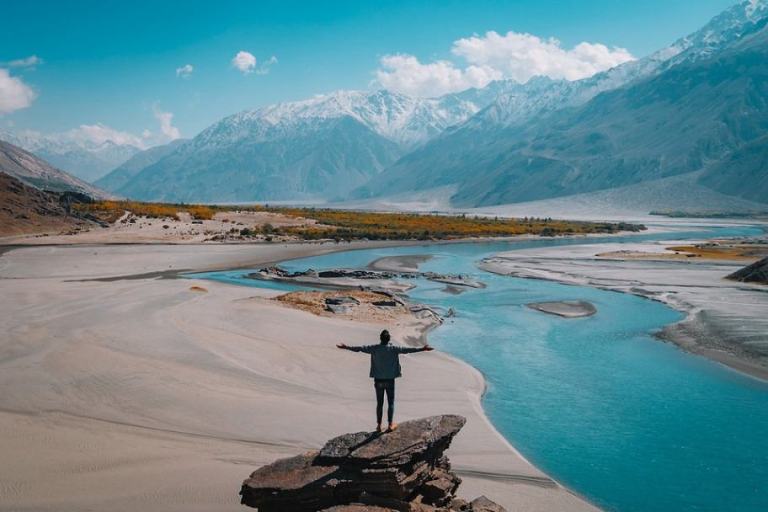
Proactive Tips for Staying Healthy While Traveling
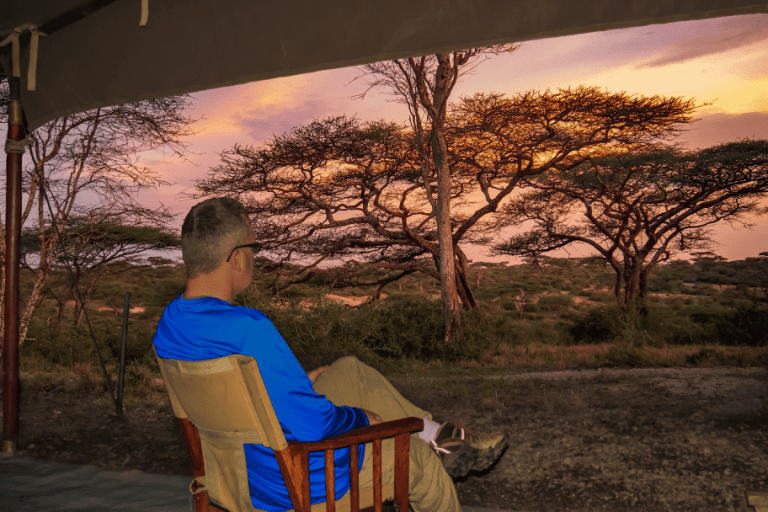
Avoid Mosquito-borne Illnesses: 10 Essential Tips for Travelers

How to Sit Next to Family on Flights: Insider Secrets

Rabies Vaccination for Travel – Why I think All Travelers Should Consider It

Have a Back-up Plan for your Travel Plan
Don’t forget to subscribe to my adventures.
Type your email…

Let Me Help You Save On Your Next Adventure!
‘start exploring today’ merchandise available now.
Thank you so much for reading and for the kind words!!
wow, thank you so much for sharing the informative article this article is really helpful thank you bottom of my…
[…] The 20 Best Travel Accessories for 2024: An Essential Guide – https://wanderlustphotosblog.com/2024/01/24/the-20-best-travel-accessories-for-2024-an-essential-gui… […]
Discover endless entertainment with KheloYar, the go-to platform for online gaming enthusiasts. Offering a diverse selection of games, from fantasy…
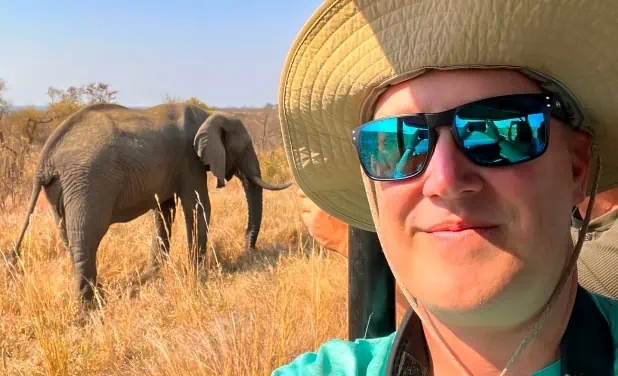
Subscribe To My Adventures!
Card Accounts
Business Accounts
Other Accounts and Payments
Tools and Support
Personal Cards
Business Credit Cards
Corporate Programs
Personal Savings
Personal Checking and Loans
Business Banking
Book And Manage Travel
Travel Inspiration
Business Travel
Services and Support
Benefits and Offers
Manage Membership
Business Services
Checking & Payment Products
Funding Products
Merchant Services

South Africa Culture & Cuisine
South Africa's culinary landscape is as diverse as its wildlife, offering a tantalizing array of flavors for every palate, from the award-winning vineyards of Stellenbosch to the bustling markets and fine dining experiences of Cape Town. Explore Cape Town one bite at a time on a private-guided food tour. Embark on a behind-the-scenes journey through South Africa’s world-renowned wineries, including Franschhoek. And retreat to Sabi Sands for a luxurious safari adventure to try and spot lions, rhinos, and herds of elephants. Led by local private guides and curated by a Destination Expert, this food, wine, and wildlife journey in stunning South Africa provides a well-rounded and tailor-made experience that will nourish your soul and leave you with a lifetime of memories.
Insider Tip
South Africa’s west coast is a treasure waiting to be discovered. Leave the city limits behind by flying a private helicopter north along the Atlantic coast, landing in a tranquil fishing village to sample fresh mussels and oysters.
With Platinum Destinations® Vacations, Platinum Card® Members who book custom vacations through American Express Travel can get 2X Membership Rewards® points on eligible itineraries with participating providers.
Enjoy special offers on select cruises and custom vacations when you book through American Express Travel® by 7/16/24. Terms apply.
Platinum Card® Members, share a few details about your dream trip and we’ll contact you to plan the rest.
You might also be interested in:
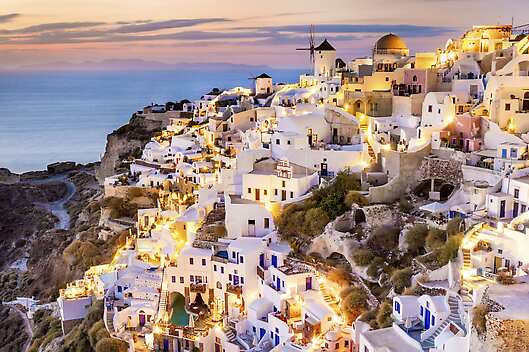
Ship's Registry: Malta
*Terms and Conditions
Cruise Privileges Program Cruise Privileges Program (“CPP”) benefits are valid only for new CPP bookings made with participating cruise lines through American Express Travel. CPP benefits are valid only for eligible U.S. Consumer and Business Platinum and Centurion ® Card Members (Delta SkyMiles ® Platinum Card Members are not eligible). CPP bookings must be made using the eligible Card. CPP benefits are non-transferable. Participating cruise lines and program benefits are subject to change. The benefits of an onboard credit and amenity are valid for new CPP bookings of at least five nights and require double occupancy; the eligible Card Member must be traveling on the itinerary booked; the total cost of the CPP booking must be paid using an American Express ® Card in the eligible Card Member's name. Onboard credits and amenities cannot be combined with other offers unless indicated; blackout dates, category and fare restrictions may apply. Onboard credits and amenities may not be available to residents outside of the 50 United States. Onboard credits and amenities apply per stateroom, with a three-stateroom limit per eligible Card Member, per cruise. For new CPP bookings with Celebrity Cruises, Norwegian Cruise Line, Holland America Line, Princess Cruises, and Royal Caribbean International, eligible Card Members receive an onboard credit (in USD) of: $100 for inside and outside staterooms, $200 for balcony, verandah, and mini-suite staterooms, and/or $300 for suites. For new CPP bookings with Cunard, eligible Card Members receive an onboard credit (in USD) of: $300 for all Queen Mary ocean-view staterooms category EF or higher, and/or Queen Victoria or Queen Elizabeth ocean-view staterooms category FA or higher. For new CPP bookings with Ama Waterways, Oceania, Regent, Azamara, Seabourn, Silversea, Uniworld, Windstar and Explora Journeys, eligible Card Members receive an onboard credit of US$300 for all stateroom categories. For new CPP bookings, Centurion Members receive an additional US$200 onboard credit on Explora Journeys, Regent Seven Seas Cruises, Seabourn, and Silversea. Onboard credits will be applied at checkout upon completion of the cruise; credit amounts in local currency may vary due to foreign exchange rates; credits are subject to cruise line terms and policies; credits cannot be used for casino charges, gratuities, or other similar charges. Any unused portion of a credit is non-refundable and is not redeemable for cash. Other restrictions may apply. Onboard amenities vary by participating cruise line and are not available on Silver Explorer, Silver Galapagos, and Silver Discoverer. Onboard credits and amenities are not available on Celebrity Cruises Galapagos sailings.
Extra Membership Rewards ® points: CPP-eligible Card Members that are Membership Rewards program-enrolled will receive one (1) extra Membership Reward ® point per eligible dollar spent on new CPP bookings made with participating cruise lines through American Express Travel; separate airfare and other charges associated with such bookings are not eligible. CPP bookings must be made using the eligible Card (described above). The extra points will be credited to the Card Member’s Membership Rewards account 8-12 weeks after completion of the CPP cruise. For more information visit membershiprewards.com/terms .
Platinum Destinations ® Vacations Platinum Destinations ® Vacations (“PDV”) benefits are valid only for new bookings made with participating suppliers through American Express Travel. Participating suppliers and PDV benefits are subject to change. Benefits cannot be combined with other offers unless indicated. Benefits are valid only for eligible U.S. Consumer and Business Platinum and Centurion ® Card Members (Delta SkyMiles ® Platinum Card Members are not eligible). PDV bookings must be made using the eligible Card and eligible Card Member must be traveling on the itinerary booked. PDV-eligible Card Members that are Membership Rewards program-enrolled will receive one (1) extra Membership Reward ® point per eligible dollar spent on PDV bookings; separate airfare and other charges associated with PDV bookings are not eligible. Extra points will be credited to the Card Member’s Membership Rewards account within 8-12 weeks after completion of the PDV travel. For more information visit membershiprewards.com/terms.
Membership Rewards Program Terms and Conditions for the Membership Rewards ® program apply. Visit membershiprewards.com/terms for more information. Participating partners and available rewards are subject to change without notice.
The value of Membership Rewards points varies according to how you choose to use them. To learn more, go to www.membershiprewards.com/pointsinfo .
American Express Travel Related Services Company, Inc. is acting solely as a sales agent for travel suppliers and is not responsible for the actions or inactions of such suppliers. Certain suppliers pay us commission and other incentives for reaching sales targets or other goals and may provide incentives to our Travel Consultants. For more information visit www.americanexpress.com/travelterms .
California CST#1022318; Washington UBI#600-469-694

Elegant Escapes: Top luxury cabins across South Africa
Explore South Africa's finest luxury cabins - from Nima Lodge’s modern elegance to Woud Blokhuis’s forest retreat. Discover serene hideaways that blend luxury with nature’s beauty.
By House & Garden South Africa | September 10, 2024 | Travel Leisure
Discover the ultimate in luxury and nature with South Africa's top cabin retreats. From Nima Lodge’s chic, nature-inspired cabins to the ethereal Woud Blokhuis in the forest, these exquisite hideaways offer a perfect blend of modern elegance and serene surroundings. Each retreat promises a unique escape into comfort and style, providing a sanctuary that harmonizes beautifully with its natural environment.
Nima Lodge - elegant cabins in Wilderness

travel-leisure
Be our guest at brookdale manor.
Nima Lodge’s Luna Cabin in Wilderness is the epitome of modern cabin culture, with floor to ceiling windows, warm wooden floors and lots of natural hues.

Currently under renovation, come mid-August it will also boast a sauna and more. The Lodge also offers other cabin options, with the Sand Cabins - which feature impressive architecture and interiors - still open to the public.

Designed by Stretch Architects, these cabins lure you into nature with their curvy wooden features, offering pure luxury in the heart of the Garden Route. With a variety of cosy textures and a fireplace that draws you indoors, this Western Cape wonder is the ultimate hideaway.
Woud Blokhuis - a luxury timber cabin in the woods
The Mpumalanga town of Dullstroom’s pine forests transport one to an ethereal world. In fact, so does Airbnb’s Woud Blokhuis, designed by Juan Cloete. The luxury timber cabin is nestled in a forest, with large windows allowing for beautiful vistas and natural light delicately dancing on dark wooden floors.

The Pavilion - elegant simplicity in the Cradle
Based in the Cradle of Humankind in the North West province, the Pavilion - a glass and steel structure - speaks to elegance and simplicity, while also allowing its inhabitants to submerge themselves in their natural surroundings. Hibernate downstairs in the White Box, which is where you can enjoy a glass of red in front of the fire.

Phinda - nothing between you and nature
Twenty-odd years ago, Phinda Forest Lodge in KwaZulu-Natal was one of the first eco-lodges in the country, and also one of the first to move away stylistically from the typical thatched safari cottage. Newly refurbished, their minimalist glass cabins - located in Africa’s last remaining dry sand forest - allow you to experience nature, up close and personal, from interior spaces that blend in well with the environment.

Kliphuis - a novel hideaway beneath the Sneeuberg
True to the spirit of the Great Karoo, Kliphuis - located in the one-of-a-kind Sneeuberg Nature Reserve, between Graaff-Reinet and Nieu-Bethesda in the Eastern Cape - has been kitted out with fluffy white sheepskin rugs, a big fireplace and three wood-burning stoves. Here, under reeded ceilings, the old barn-turned-cottage will soothe and inspire.

Text by Renate Engelbrecht
Photography Supplied by David Ross, Lia Kriel, Isabel Hayn, Greg Cox
Related Tags
House & garden recommends, 3 things to consider to make your solocation a success, 3 namibian destinations for a scenic & secluded escape, 12 sustainable destinations we'd love to visit in 2022, you might also like.

Six Pioneering female winemakers and the varietals they champion

Our Ultimate Guide to the Best Areas to Stay in London

In a Lustrous World of Hospitality, Mauritius Remains Top Tier

La Motte Estate announces JAN Franschhoek Season III

Home on the Range: Arrive in Style With the All New Range Rover Sport

A Visit to Cypiro Leopard Lodge is an Elegant Bush Retreat

Get 11 Steps Closer to Your Softest Bedding With These Simple Tips
How a traveling 'health train' has become an essential source of free care in South Africa
A passenger train in South Africa has been transformed into a mobile health facility
JOHANNESBURG -- Thethiwe Mahlangu woke early on a chilly morning and walked through her busy South African township, where minibuses hooted to pick up commuters and smoke from sidewalk breakfast stalls hung in the air.
Her eyes had been troubling her. But instead of going to her nearby health clinic, Mahlangu was headed to the train station for an unusual form of care.
A passenger train known as Phelophepa — or “good, clean, health" in the Sesotho language — had been transformed into a mobile health facility. It circulates throughout South Africa for much of the year, providing medical attention to the sick, young and old who often struggle to receive the care they need at crowded local clinics.
For the past 30 years —- ever since South Africa's break with the former racist system of apartheid — the train has carried doctors, nurses and optometrists on an annual journey that touches even the most rural villages, delivering primary healthcare to about 375,000 people a year.
The free care it delivers is in contrast to South Africa's overstretched public health care system on which about 84% of people rely.
Health care reflects the deep inequality of the country at large. Just 16% of South Africans are covered by health insurance plans that are beyond the financial reach of many in a nation with unemployment of over 32%.
Earlier this year, the government began to address that gap. President Cyril Ramaphosa in May signed into law the National Health Insurance Act , which aims to provide funding so that millions of South Africans without health insurance can receive care from the better-provisioned private sector.
But the law has been divisive. The government has not said how much it will cost and where the money will come from. Economists say the government will have to raise taxes. Critics say the country can’t afford it and warn that the system — yet to be implemented — will be open to abuse by corrupt officials and businessmen. They say the government should fix the public healthcare system instead.
For Mahlangu and others who look to the train for a rare source of free treatment, the situation at local health clinics is one of despair.
Long lines, shortages of medicines and rude nurses are some of the challenges at the clinics that cater for thousands of patients a day in Tembisa, east of Johannesburg.
“There we are not treated well,” Mahlangu said. “We are made to sit in the sun for long periods. You can sit there from 7 a.m. until around 4 p.m. when the clinic closes. When you ask, they say we must go ask the president to build us a bigger hospital.”
The health train has grown from a single three-carriage operation over the years to two, 16-carriage trains. They are run by the Transnet Foundation, a social responsibility arm of Transnet, the state-owned railway company.
When the train began in 1994, many Black people in South Africa still lived in rural villages with little access to health facilities. It was a period of change in the country. The train began as an eye clinic, but it soon became clear that needs were greater than that.
Now both trains address the booming population of South Africa's capital of Pretoria and nearby Johannesburg, the country's economic hub. One would spend two weeks in Tembisa alone.
“The major metros are really struggling,” said Shemona Kendiah, the train's manager.
But the traveling clinc is far from the solution to South Africa's healthcare problems.
Public health expert Alex van den Heever said there have been substantial increases in the healthcare budget and the public sector employment of nurses and doctors since the country's first democratic government in 1994. The health department's budget in Gauteng province, which includes Pretoria and Johannesburg, has grown from 6 billion rand ($336 million) in 2000 to 65 billion ($3.6 billion) rand now.
But van den Heever accused the African National Congress, the ruling party since the end of apartheid, of allowing widespread corruption to undermine the public sector, including the health care system.
“This has led to a rapid deterioration of performance," he said.
For South Africans who have witnessed the decline firsthand, it can be a relief when the health train pulls into town.
Mahlangu — with her new pair of glasses — was among hundreds who walked away satisfied with its services and already longing for the train's return next year.
Another patient, Jane Mabuza, got a full health checkup along with dental services. She said she hoped the train would reach many other people.
“Here on the train you never hear that anything has been finished,” she said.
For more news on Africa and development: https://apnews.com/hub/africa-pulse
The Associated Press receives financial support for global health and development coverage in Africa from the Gates Foundation. The AP is solely responsible for all content. Find AP’s standards for working with philanthropies, a list of supporters and funded coverage areas at AP.org .
Popular Reads

How to watch the Harris-Trump ABC News debate
- Sep 10, 8:55 PM

Fact-checking Harris and Trump presidential debate
- Sep 11, 7:08 AM
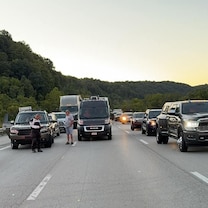
Suspect at large in freeway shooting
- Sep 8, 11:18 PM

Key takeaways from Harris-Trump ABC News debate
- Sep 11, 12:19 AM

4 dead in shooting at Georgia high school
- Sep 4, 10:47 PM
ABC News Live
24/7 coverage of breaking news and live events

- Women in Journalism
- KwaZulu-Natal
- Eastern Cape
- Bloemfontein
- Elections 2024
- All Tech News
- Traffic Report
- Lotto Results
- Bafana Bafana
- Betway Premiership
- English Premier League
- CAF Champions League
- UEFA Champions League
- Soccer World Cup 2022
- United Rugby Championship
- Super Rugby
- Rugby Championship
- Varsity Cup
- Rugby World Cup 2023
- Indian Premier League
- Cricket World Cup 2023
- Paris Olympics 2024
- Hollywoodbets Horse Racing
- Entertainment
- Art & Artists
- House of Zwide
- On this Day
- Nelson Mandela
- Blood & Water
- Prison Journalism
- Studentlife News
- Study Abroad
- Studentlife Entertainment
- Studentlife Food
- Studentlife Health and Fitness
- Studentlife Lifestyle
- Studentlife Opinion
- Studentlife Sport
- Studentlife Tech
- Student Jobs
- Fashion and Beauty
- Local Celebs
- International Celebs
- All Travel News
- Travel South Africa
- Travel International
- Move to USA
- Move to New Zealand
- Move to the UK
- Move to Canada
- Move to Australia
- Move to South Africa
- Health & Fitness
- Parenting & Kids
- Sex, Love & Relationships
- Money Matters
- Start-up Africa
- My Business
- Art & Artists
- Health & Fitness
- Parenting & Kids
- Newsletters
- Terms, Conditions, Privacy & GDPR
Copyright Blue Sky Publications (Pty) Ltd. All Rights Reserved.
thesouthafrican.com is a division of Blue Sky Publications Ltd. Reproduction without permission prohibited
- Business & Finance

Home » Mpox cases on the rise in South Africa
Mpox cases on the rise in South Africa
South Africa confirms a new mpox case, bringing the total to 25; authorities urge public vigilance as cases rise across multiple provinces.
South Africa has recorded another laboratory-confirmed mpox case, raising the total number of cases to 25 . The Department of Health made the announcement on Monday , stating that the new case involves a 38-year-old man from Cape Town. This individual exhibited typical symptoms of mpox, including a headache, mpox lesions on his face, sore throat, muscle pain, and light sensitivity. Fortunately, the man is stable and currently isolating at home.
No recent travel or contact with Mpox cases
According to Foster Mohale from the Department of Health , the patient has no recent international travel history or known contact with a suspected or confirmed mpox case.
“The man sought medical intervention at a private practice in Cape Town and was urged to isolate while awaiting test results. His results came back positive on Friday, 6 September,” Mohale said.
The Mpox outbreak response team in the Western Cape has been activated and contact tracing and monitoring efforts are underway.
Mohale added, “This brings the total number of cases in the country to 25, including three deaths. Twelve cases have been recorded in Gauteng, eleven in KwaZulu-Natal, and now two in the Western Cape.”
Precautions and vulnerability
The Department of Health continues to stress the importance of precautions, particularly for those at high risk. Last month, the department urged businesses and organisations with ties to affected countries to ensure that employees who regularly travel are well informed about mpox.
“We encourage businesses to ensure their employees are fit to travel,” the department stated.
The department also reminded the public that mpox symptoms include a rash, fever, headache, muscle aches, swollen glands, and low energy. The rash, lasting up to four weeks, may appear as blisters or sores, affecting the face, hands, feet, and groin. Travellers experiencing these symptoms should delay their travel and seek medical care to prevent cross-border transmission.
Though anyone can contract mpox, the department noted that people living with HIV, men who have sex with men, and individuals with chronic conditions such as tuberculosis and diabetes are particularly vulnerable.
“We urge everyone with mpox symptoms, regardless of travel history, to seek medical attention,” the department added.
What can be done to prevent Mpox further spread?
Let us know by clicking on the comment tab below this article or by emailing [email protected] or sending a WhatsApp to 060 011 021 1. You can also follow @TheSAnews on X and The South African on Facebook for the latest news.
Is jy Afrikaans? Kliek hier vir nuus in jou taal!
Share this article

South Africa to Simplify Visa Process, Announces New 90-Day Waiver
- Visas & Passports
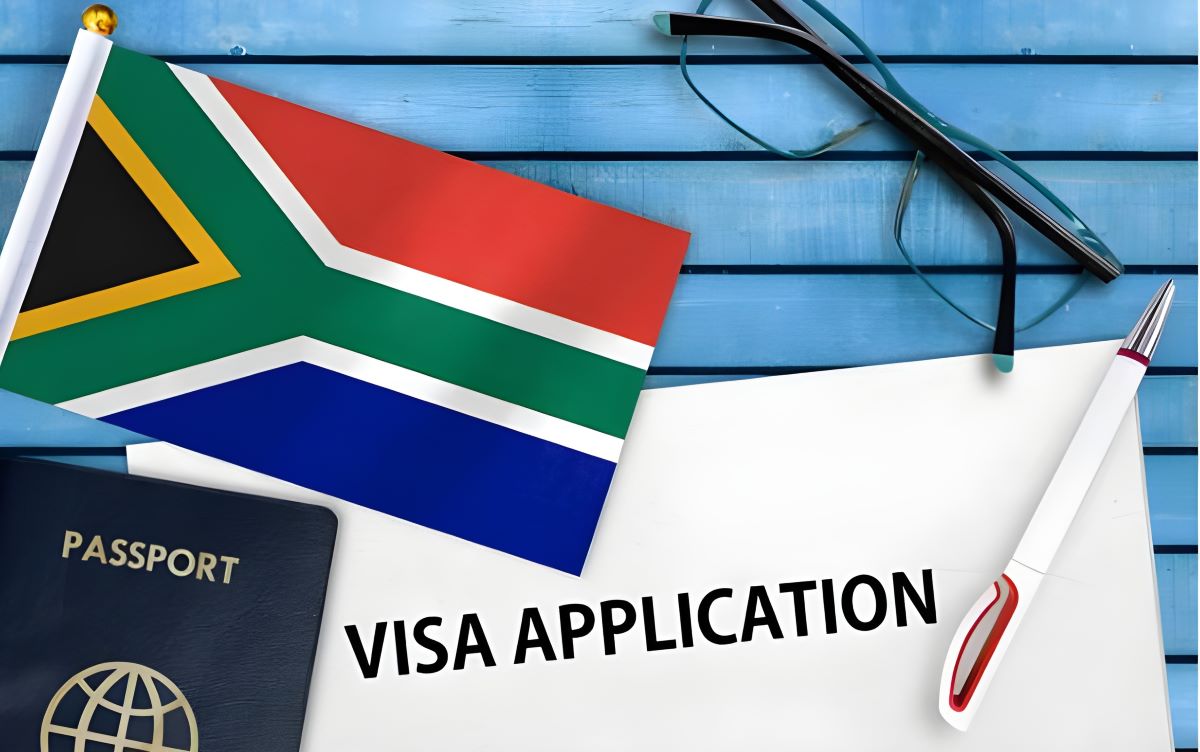
Great news for travelers from India and China ! South Africa is taking significant steps to attract more Indian tourists by introducing a 90-day visa waiver starting in January 2025. The new policy aims to simplify travel for Indian visitors and is expected to increase the number of tourists from India.
Currently, only 16,000 Indian tourists visit South Africa annually, but the country hopes to raise this number to 100,000 by the end of the year.
This initiative tackles a major hurdle for South Africa’s tourism industry: attracting more visitors from India and China. Currently, Indian tourists make up a mere 3.9% of international arrivals.
What is the Trusted Tour Operator Scheme (TTOS)?
In addition to the visa waiver, South Africa designed the Trusted Tour Operator Scheme (TTOS) to simplify the visa process for tourists from India and China. Selected tour operators will manage group travel, allowing the government to fast-track visa applications and boost tourism.
Boosting Tourism with TTOS
The Trusted Tour Operator Scheme (TTOS) has been designed to address challenges in South Africa’s tourism sector. Currently, Indian tourists represent just 3.9% of the country’s international visitors, a figure seen as insufficient for a growing market.
To tackle this, the Department of Home Affairs will collaborate with the Department of Tourism, the Presidency, and Operation Vulindlela.
Their joint efforts will make South Africa more accessible to tourists from India and China, ultimately driving growth in the tourism sector.
Also Read: South Africa Extends Visa Concessions for Travellers Amid Processing Delays
Simplifying Travel for Indian Tourists
The introduction of the TTOS and the 90-day visa waiver is set to make travel planning easier for Indian tourists. By simplifying the visa process, South Africa aims to position itself as a more accessible and attractive destination for Indian travelers.
Additionally, the government is planning to roll out an eVisa system for Indian tourists , further easing the application process and enhancing travel convenience.
How the TTOS Will Work
Under the new scheme, South Africa’s Department of Home Affairs will invite selected tour operators from India and China to register. Approved operators will oversee tourists in their groups and manage their travel arrangements.
In return, the Department will fast-track group visa applications, marking the first use of such a system for tourists. A dedicated team will handle these applications to ensure swift processing and remove previous barriers that have deterred tourism from these markets.
Economic Benefits and Job Creation
Minister Schreiber highlighted the potential economic benefits of the TTOS, noting that a successful implementation could lead to significant growth in the tourism sector.
This increase in tourism is expected to create more jobs for South Africans, substantially boosting the economy. The initiative reflects South Africa’s commitment to becoming a top global tourism destination and making travel more accessible for visitors from India and China.
Looking Ahead
The Trusted Tour Operator Scheme is a promising step towards making South Africa a top tourist destination. With easier visa processing and a focus on group travel, more visitors from India and China can experience the wonders of South Africa.
Follow and connect with us on Facebook , Twitter , LinkedIn , Instagram and Google News for the latest travel news and updates!
Manish Khandelwal
Manish Khandelwal, a travel-tech enthusiast with over a decade of experience in the travel industry. Founder and Editor-in-Chief of Travelobiz.com, he's passionate about writing.
Trending now

How a traveling 'health train' has become an essential source of free care in South Africa
Thethiwe Mahlangu woke early on a chilly morning and walked through her busy South African township, where minibuses hooted to pick up commuters and smoke from sidewalk breakfast stalls hung in the air.
By MOGOMOTSI MAGOME
JOHANNESBURG — Thethiwe Mahlangu woke early on a chilly morning and walked through her busy South African township, where minibuses hooted to pick up commuters and smoke from sidewalk breakfast stalls hung in the air.
Her eyes had been troubling her. But instead of going to her nearby health clinic, Mahlangu was headed to the train station for an unusual form of care.
A passenger train known as Phelophepa — or ''good, clean, health" in the Sesotho language — had been transformed into a mobile health facility. It circulates throughout South Africa for much of the year, providing medical attention to the sick, young and old who often struggle to receive the care they need at crowded local clinics.
For the past 30 years —- ever since South Africa's break with the former racist system of apartheid — the train has carried doctors, nurses and optometrists on an annual journey that touches even the most rural villages, delivering primary healthcare to about 375,000 people a year.
The free care it delivers is in contrast to South Africa's overstretched public health care system on which about 84% of people rely.
Health care reflects the deep inequality of the country at large. Just 16% of South Africans are covered by health insurance plans that are beyond the financial reach of many in a nation with unemployment of over 32%.
Earlier this year, the government began to address that gap. President Cyril Ramaphosa in May signed into law the National Health Insurance Act, which aims to provide funding so that millions of South Africans without health insurance can receive care from the better-provisioned private sector.
But the law has been divisive. The government has not said how much it will cost and where the money will come from. Economists say the government will have to raise taxes. Critics say the country can't afford it and warn that the system — yet to be implemented — will be open to abuse by corrupt officials and businessmen. They say the government should fix the public healthcare system instead.
For Mahlangu and others who look to the train for a rare source of free treatment, the situation at local health clinics is one of despair.
Long lines, shortages of medicines and rude nurses are some of the challenges at the clinics that cater for thousands of patients a day in Tembisa, east of Johannesburg.
''There we are not treated well,'' Mahlangu said. ''We are made to sit in the sun for long periods. You can sit there from 7 a.m. until around 4 p.m. when the clinic closes. When you ask, they say we must go ask the president to build us a bigger hospital.''
The health train has grown from a single three-carriage operation over the years to two, 16-carriage trains. They are run by the Transnet Foundation, a social responsibility arm of Transnet, the state-owned railway company.
When the train began in 1994, many Black people in South Africa still lived in rural villages with little access to health facilities. It was a period of change in the country. The train began as an eye clinic, but it soon became clear that needs were greater than that.
Now both trains address the booming population of South Africa's capital of Pretoria and nearby Johannesburg, the country's economic hub. One would spend two weeks in Tembisa alone.
''The major metros are really struggling,'' said Shemona Kendiah, the train's manager.
But the traveling clinc is far from the solution to South Africa's healthcare problems.
Public health expert Alex van den Heever said there have been substantial increases in the healthcare budget and the public sector employment of nurses and doctors since the country's first democratic government in 1994. The health department's budget in Gauteng province, which includes Pretoria and Johannesburg, has grown from 6 billion rand ($336 million) in 2000 to 65 billion ($3.6 billion) rand now.
But van den Heever accused the African National Congress, the ruling party since the end of apartheid, of allowing widespread corruption to undermine the public sector, including the health care system.
''This has led to a rapid deterioration of performance," he said.
For South Africans who have witnessed the decline firsthand, it can be a relief when the health train pulls into town.
Mahlangu — with her new pair of glasses — was among hundreds who walked away satisfied with its services and already longing for the train's return next year.
Another patient, Jane Mabuza, got a full health checkup along with dental services. She said she hoped the train would reach many other people.
''Here on the train you never hear that anything has been finished,'' she said.
For more news on Africa and development: https://apnews.com/hub/africa-pulse
The Associated Press receives financial support for global health and development coverage in Africa from the Gates Foundation. The AP is solely responsible for all content. Find AP's standards for working with philanthropies, a list of supporters and funded coverage areas at AP.org.
about the writer
Mogomotsi magome, more from world, vietnam death toll climbs to 197 as typhoon's aftermath brings flash floods and landslides.
Nearly 200 people have died in Vietnam in the aftermath of Typhoon Yagi and more than 125 are missing as flash floods and landslides take their toll, state media reported Thursday.
Alberto Fujimori, a former president of Peru who was convicted for human rights abuses, dies at 86
Alberto Fujimori, whose decade-long presidency began with triumphs righting Peru's economy and defeating a brutal insurgency only to end in autocratic excess that later sent him to prison, has died. He was 86.
Pope marvels at Singapore's skyscrapers and asks that the lowest migrant workers not be forgotten
Pope Francis on Thursday praised Singapore's economic strength as a testament to human ingenuity but urged the city-state to look after the weakest, too, especially foreign workers, as he opened the final leg of his tour through some of Asia's poorest countries in one of the world's richest.

COMMENTS
7. Be prepared to tip. South Africa has a strong tipping culture. In many customer-facing industries, salaries are low and workers make much of their money from tips. Restaurant staff will expect a top of around 10%, but leaving 12-15% will generate bigger smiles.
South Africa. Africa. Check out this year's Best in Travel winners. Black-maned lions framed against desert dunes, powdery beaches lapped by two oceans, star-studded night skies, jagged mountains - South Africa is the place to go wild. Best Time to Visit.
Call us in Washington, D.C. at 1-888-407-4747 (toll-free in the United States and Canada) or 1-202-501-4444 (from all other countries) from 8:00 a.m. to 8:00 p.m., Eastern Standard Time, Monday through Friday (except U.S. federal holidays). See the State Department's travel website for the Worldwide Caution and Travel Advisories.
Other than that, the water in South Africa is safe to drink, so please consider drinking the free tap water instead of buying plastic bottles and contributing to plastic waste. If you are truly worried about your vacation in South Africa, we always travel with a Grayl GeoPress, which filters out 99.99% of bacteria.
The world's third-highest bungee jump point, at Bloukrans Bridge, is here in South Africa (it's 216 meters/708 feet). If you're going to go cage diving with sharks, make sure you avoid companies that chum the waters to entice the sharks as that isn't an ethical or sustainable practice. 2. Explore KwaZulu-Natal.
If your travel plans in South Africa include outdoor activities, take these steps to stay safe and healthy during your trip. Stay alert to changing weather conditions and adjust your plans if conditions become unsafe. Prepare for activities by wearing the right clothes and packing protective items, such as bug spray, sunscreen, and a basic ...
FCDO travel advice for South Africa. Includes safety and security, insurance, entry requirements and legal differences.
5. Drakensburg. Best region for hiking. South Africa's largest mountain range is a paradise for hikers and outdoor enthusiasts. In addition to its rugged peaks, lush valleys and dramatic cliffs, the Drakensberg is also dotted with rock and cave art that dates back several thousand years.
South Africa experiences more crime during its rolling blackouts (load-shedding). Be particularly alert in major city centres and township areas and when travelling after dark. Crimes in South Africa often involve the use of weapons. There's a threat of kidnapping across South Africa, pay attention to your personal security.
The test result of people who travel on more than one occasion within 14 days to and from South Africa remains valid for a period of 14 days, but the test result that is presented on the first entry into South Africa must still be within 72 hours of sample collection. I am experiencing symptoms related to COVID-19 after travelling to South Africa,
4. Kruger National Park. Without any doubt, Kruger National Park is one of the best-known places to visit in South Africa. If you want the best wildlife safari experience in South Africa, then Kruger NP is definitely the place to be. Kruger is the oldest and also the biggest National Park in South Africa.
Visit South Africa during the shoulder or off-peak season. This means planning a trip to South Africa in Autumn (March to May) or Spring (September - November). The weather is pleasant and costs are not inflated. A great way to get around South Africa on a budget over longer distances is by using the bus.
South African Tourism welcomes you! (GL) South Africa is a country like no other. It is the ideal destination for those seeking a unique sensory/spiritual reawakening, a place that leaves its visitors feeling inspired, enriched and rejuvenated. South Africa offers a diversity of options to suit every traveller that will excite and revive you ...
13 Top Things to Do in the Drakensberg, South Africa. How to Travel From Durban to Cape Town by Bus, Car, and Plane. West Coast National Park: The Complete Guide. Gansbaai, South Africa: The Complete Guide. Golden Gate Highlands National Park: The Complete Guide. Sodwana Bay, South Africa: The Complete Guide.
Travel on foot is inadvisable in most areas. If walking is unavoidable, use only brightly lit, busy streets in popular tourist areas and maintain awareness of your surroundings. If you choose to drive in South Africa: always drive defensively. plan your trip in advance, especially if you are visiting a rural area.
Planning Your Trip. Best Time to Visit: Although South Africa is a year-round destination, summer (December to February) is the hottest, wettest time of the year and the best time for a beach holiday. Winter (June to August) is the coolest, driest time of year and the best time to go on safari. Languages: Afrikaans, English, Ndebele, Northern ...
There are special requirements for travelling to South Africa with children aged 17 and under, and for unaccompanied children entering South Africa. The South African Department of Home Affairs ...
Travel Advisory. February 5, 2024. South Africa - Level 2: Exercise Increased Caution. U C. Updated to reflect safety consideration when using GPS navigation. Exercise increased caution in South Africa due to crime and civil unrest. Country Summary: Violent crime, such as armed robbery, rape, carjacking, mugging, and "smash-and-grab" attacks on ...
Fax: +(27)(11) 884-0396 / 011-884-0396 (from within South Africa) Email: [email protected]. If you have any questions about traveling to South Africa or are wondering what shots you may need for your trip, schedule an appointment with your local Passport Health travel medicine clinic.
South Africa Travel Guide. Your ultimate South Africa travel guide, with tips, ideas on things to do, and best things to see in South Africa. Great for first-time and returning travelers. Found in the southernmost tip of Africa, South Africa is a great place for those looking for some excitement. Full of history and home to numerous forests ...
4. Learn from South Africa's apartheid past in Johannesburg. South Africa has made steps in atoning for its apartheid past through education at various sites. Johannesburg's Apartheid Museum is a sobering but enlightening place to start. Exhibits take you through the history of apartheid using videos, documents and photographs.
Exploring the vibrant and diverse country of South Africa is a captivating adventure for any traveler. From the bustling streets of Cape Town, with its iconic Table Mountain backdrop, to the vast, untamed wilderness of the Kruger National Park, South Africa travel offers an incredible array of experiences to discover.. South Africa's culinary scene is equally enthralling, blending diverse ...
South Africa's culinary landscape is as diverse as its wildlife, offering a tantalizing array of flavors for every palate, from the award-winning vineyards of Stellenbosch to the bustling markets and fine dining experiences of Cape Town. ... American Express Travel Related Services Company, Inc. is acting solely as a sales agent for travel ...
Explore South Africa's finest luxury cabins - from Nima Lodge's modern elegance to Woud Blokhuis's forest retreat. Discover serene hideaways that blend luxury with nature's beauty. ... travel-leisure Be Our Guest at Brookdale Manor Read more. Nima Lodge's Luna Cabin in Wilderness is the epitome of modern cabin culture, with floor to ...
The free care it delivers is in contrast to South Africa's overstretched public health care system on which about 84% of people rely. Health care reflects the deep inequality of the country at large.
South Africa - Blue Sky Publications (Pty) Ltd - Registration Number: 2005/028472/07 - Address: Regus Business Centre, 1st Floor, Block B, North Park, Black River Park, 2 Fir Street, Observatory ...
A passenger train in South Africa has been transformed into a mobile health facility. It circulates throughout the country for much of the year, providing medical attention to the sick, young and old who often struggle to receive the care they need at crowded local clinics. For the past 30 years —- ever since South Africa's break with the former racist system of apartheid — the train has ...
South Africa is set to simplify travel for Indian tourists by introducing a 90-day visa waiver starting in January 2025. Along with the Trusted Tour Operator Scheme, these initiatives aim to streamline the visa process and boost tourism significantly. ... South Africa is taking significant steps to attract more Indian tourists by introducing a ...
The free care it delivers is in contrast to South Africa's overstretched public health care system on which about 84% of people rely. Health care reflects the deep inequality of the country at large.
Join Group Travel Manager Michelle Putnam to learn about the 2026 trip to South Africa & Cape Town! This tour is full of Safari adventures, luxury stays, and opportunities of a lifetime to see the "big 5" of Africa: lions, leopards, rhinoceros, elephants, and the African Buffalo! Come learn how you can embark on this journey!